This document provides a summary of the book "21 Days of Effective Communication" which aims to improve readers' communication skills through daily exercises over 21 days. The introduction discusses how the author struggled with communication in his youth and career but overcame this through self-development resources and writing his own books. He created this book to help others develop their skills quickly with brief exercises based on psychology. Readers are encouraged to actively practice the daily lessons and tips in order to form new habits within the 21 day period outlined.
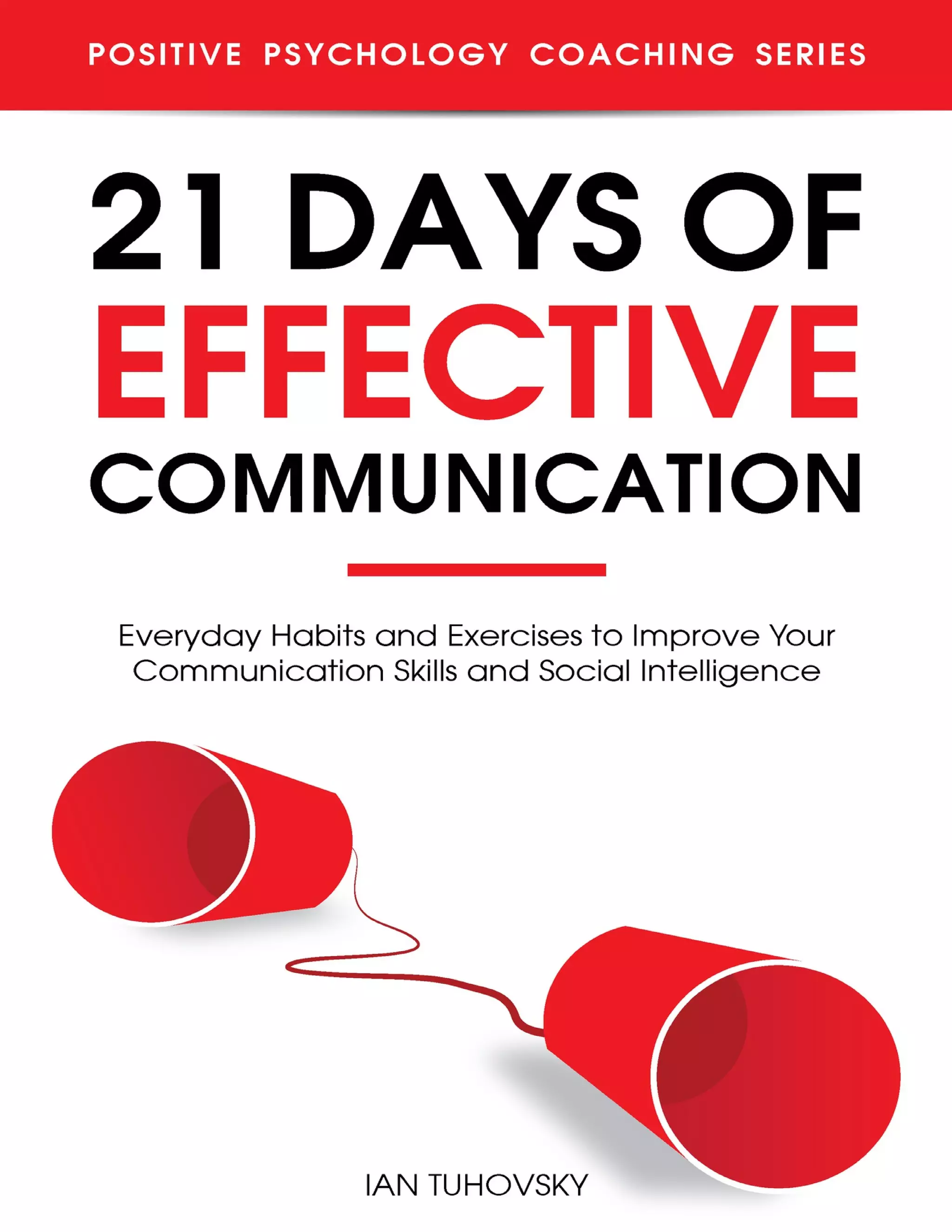
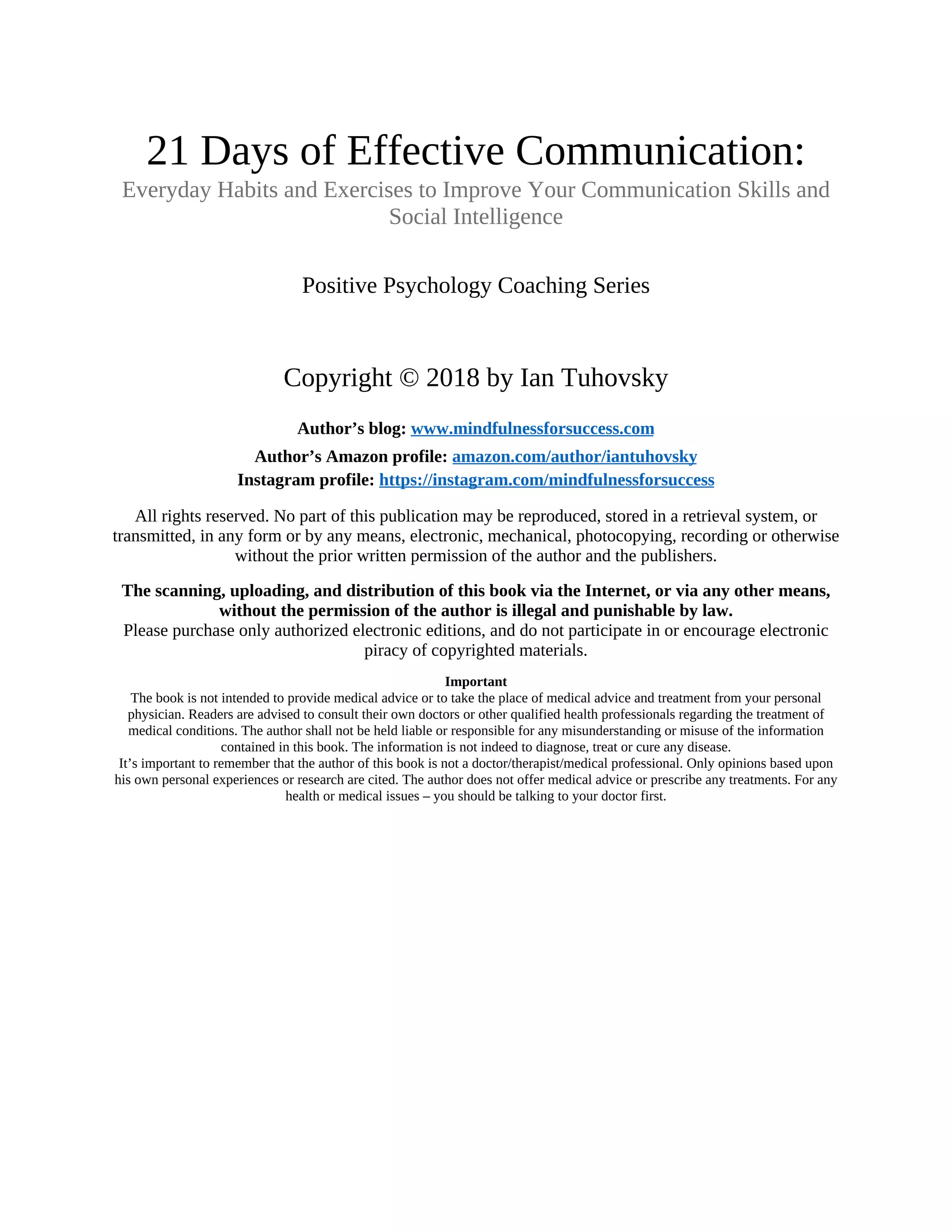

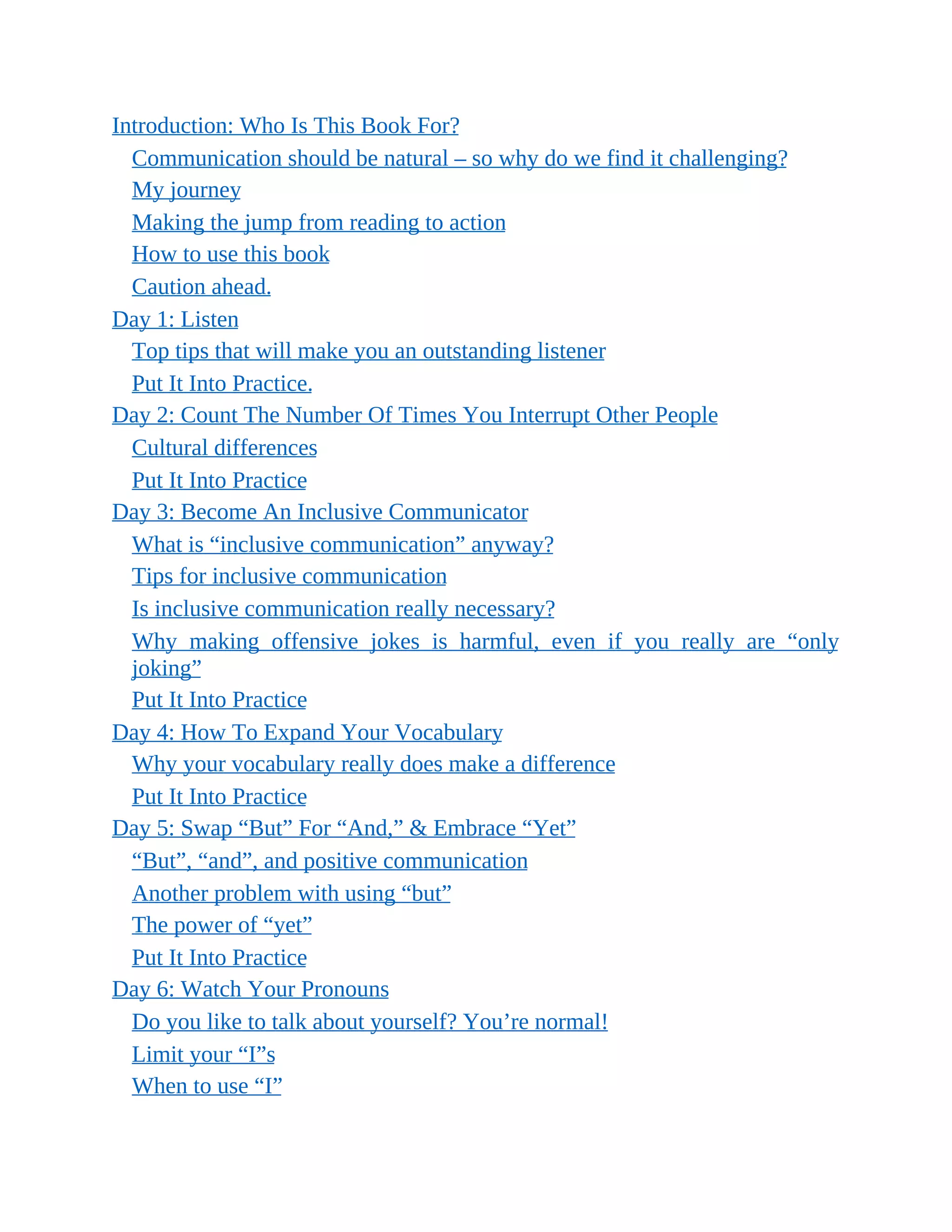
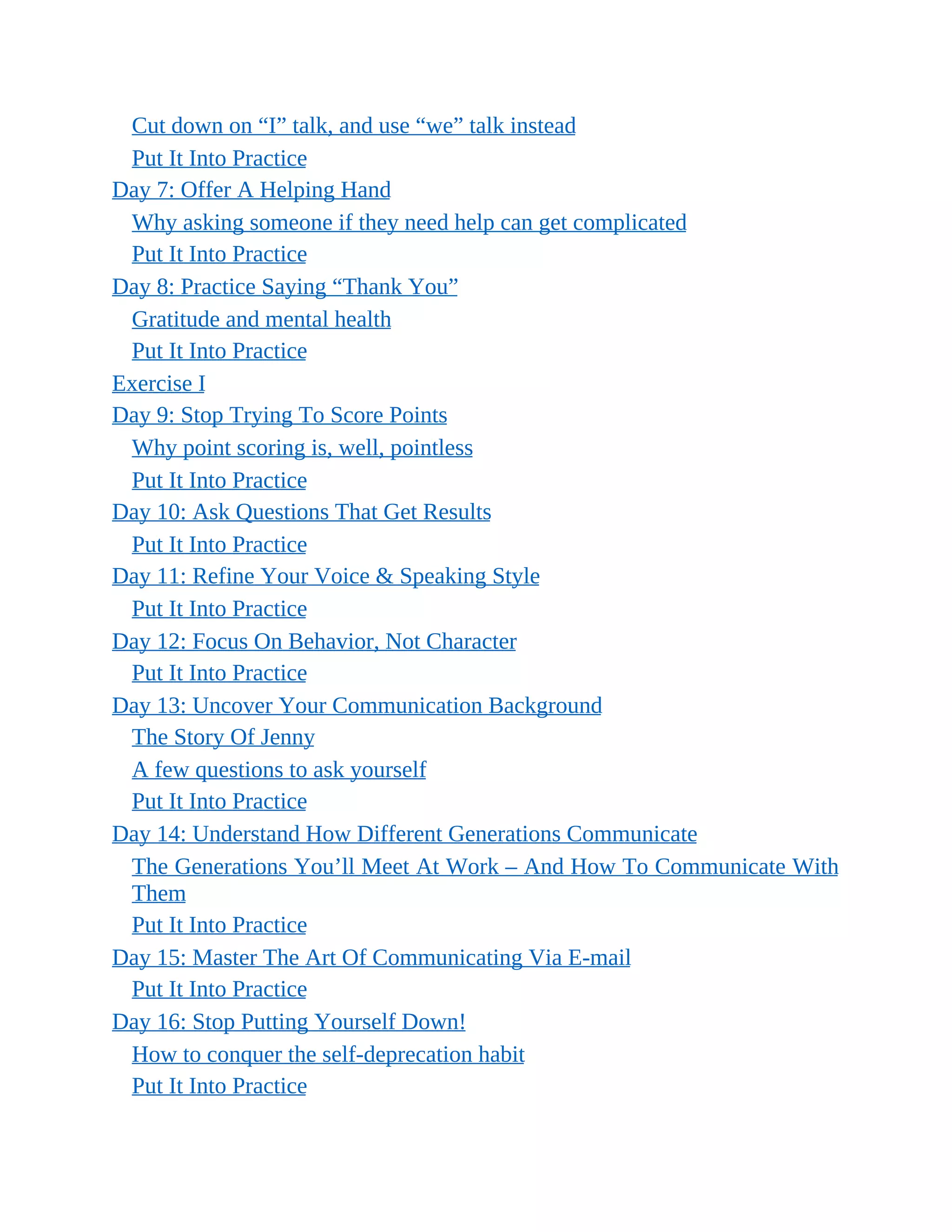
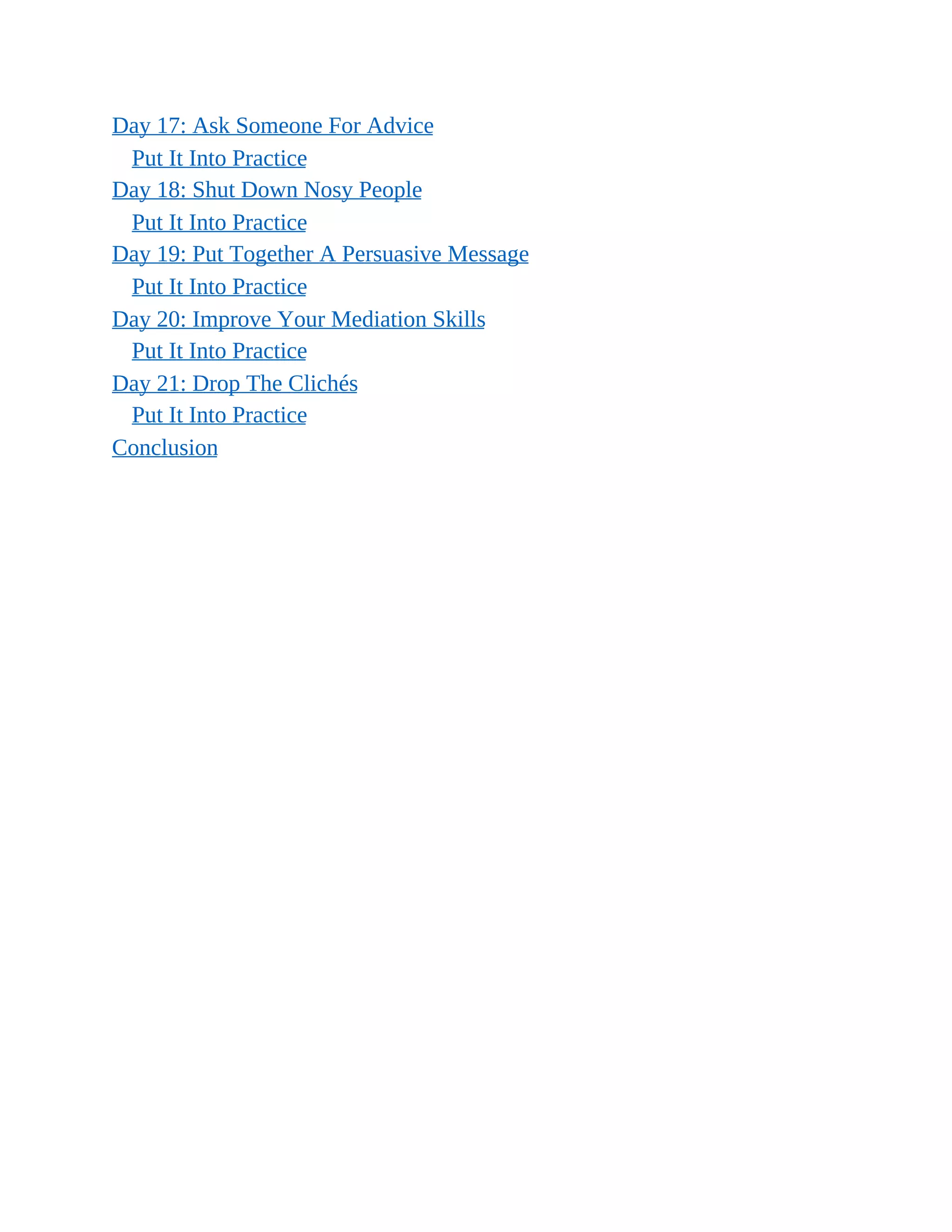
![Introduction: Who Is This Book For?
Have you ever searched for something interesting to say, wondered how to
make new friends, or suffered from social anxiety? You aren’t alone. There
are millions of other people in your shoes.[1]
Heck, I used to have similar
problems. These days I can talk to almost anyone and handle everyday social
situations with ease. However, it’s been a long journey fraught with
challenges before I reached my destination.
There’s no doubt about it – communication skills are vital to success.
Whether you want to improve your romantic relationships, build closer bonds
with your family, make your friendships stronger, or boost your career, you
absolutely must polish your communication skills.
Communication should be natural – so why do we find it
challenging?
All the progress the human race has enjoyed comes down to communication.
Think about it. How would we have invented our first tools, raised families,
built societies, and formed governments if we hadn’t been able to
communicate effectively? We need these vital skills to form relationships,
exchange ideas, and enjoy spending time with family and friends.
Unfortunately, our life experiences often get in the way, and we start to lose
touch with our natural abilities. For example, if you are bullied at school, you
might come to believe that you are an intrinsically unpopular person who will
never make friends. In this kind of situation, it makes sense that your social
relationships will suffer.[2]
Personally, I was raised in a family of high achievers. As a result, I often felt
as though any ideas I proposed were bound to be criticized. My mother says
that I was a confident preschooler, but by the age of seven, I’d started to
become shy.
My journey
During my early twenties, I really began to appreciate just how vital
communication skills really are to anyone who wants a happy, well-balanced](https://image.slidesharecdn.com/21daysofeffectivecommunicationeverydayexercisestoimproveyourcommunicationskill-211015142455/75/21-days-of-effective-communication-everyday-exercises-to-improve-your-communication-skill-7-2048.jpg)
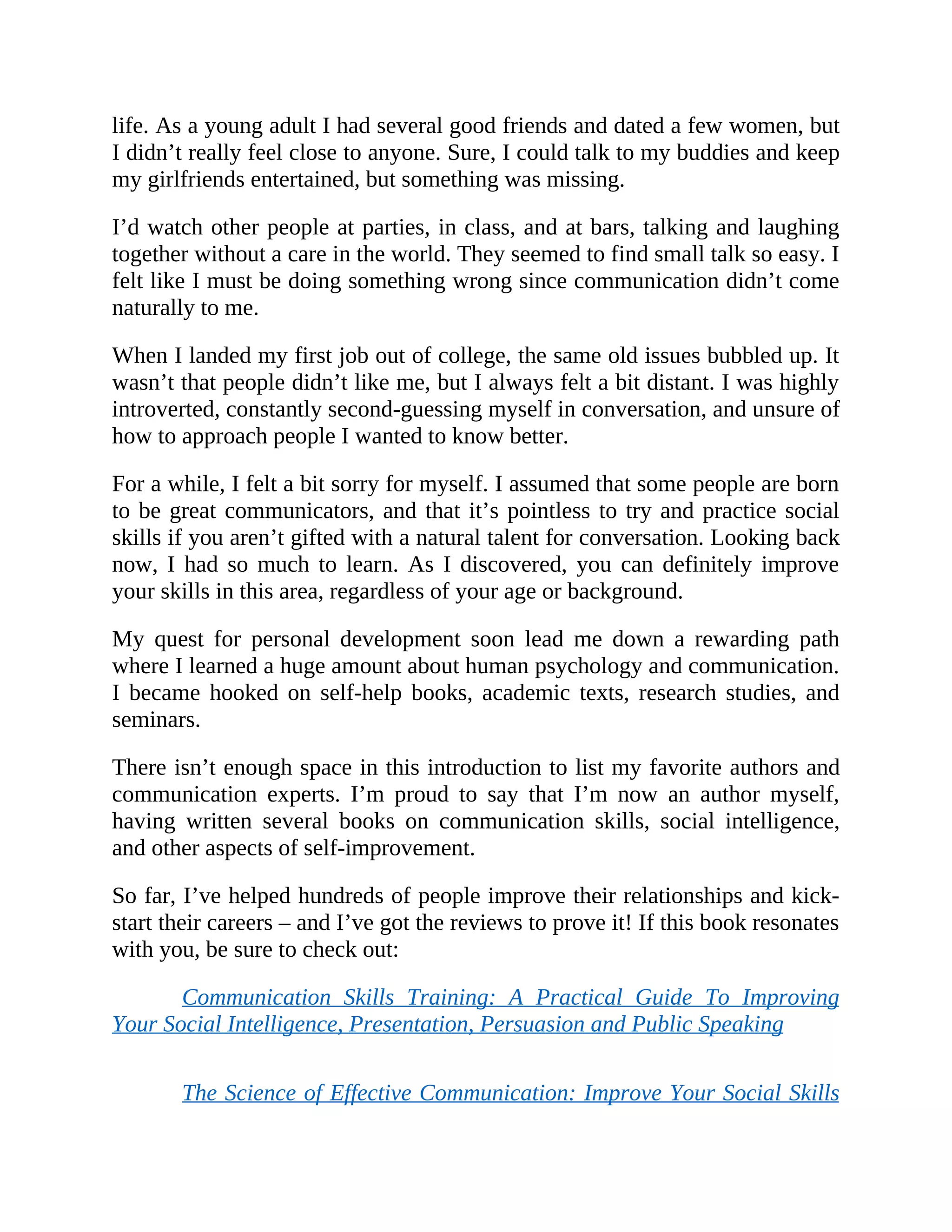
![and Small Talk, Develop Charisma and Learn How to Talk to Anyone
The Science of Interpersonal Relations: A Practical Guide to Building
Healthy Relationships, Improving Your Soft Skills and Learning Effective
Communication.
Making the jump from reading to action
All the self-development in the world remains useless until you are willing to
put into practice everything you’ve learned. It takes a lot of time to research
the right information, process it, and experiment with new techniques. At the
start of my own journey, I desperately hunted for a book packed with brief
but effective communication exercises based on sound psychological
research. Alas, I couldn’t find one.
Over a decade later, I have written the kind of book I wanted as a young man
– you are holding it in your hands. My aim is to help people develop their
skills quickly without having to spend countless hours poring over hundreds
of resources.
How to use this book
This guide contains 21 communication topics, together with actionable
exercises, that will give your current skills a complete overhaul. It doesn’t
matter whether you are naturally shy, naturally extroverted, or somewhere in
the middle – the principles in this book apply to everyone.
I won’t overload you with new information, but present enough material to
make a positive impact on your social life in a short space of time.
You have probably already heard of the saying, “It takes 21 days to form a
new habit.” It won’t come as a surprise to learn that I looked to this piece of
popular wisdom when coming up with this book’s title.
However, I’ve got a confession to make – 21 isn’t a magic number. Contrary
to popular opinion, the length of time it really takes to form a new habit
varies from 18 to 254 days.[3]](https://image.slidesharecdn.com/21daysofeffectivecommunicationeverydayexercisestoimproveyourcommunicationskill-211015142455/75/21-days-of-effective-communication-everyday-exercises-to-improve-your-communication-skill-9-2048.jpg)
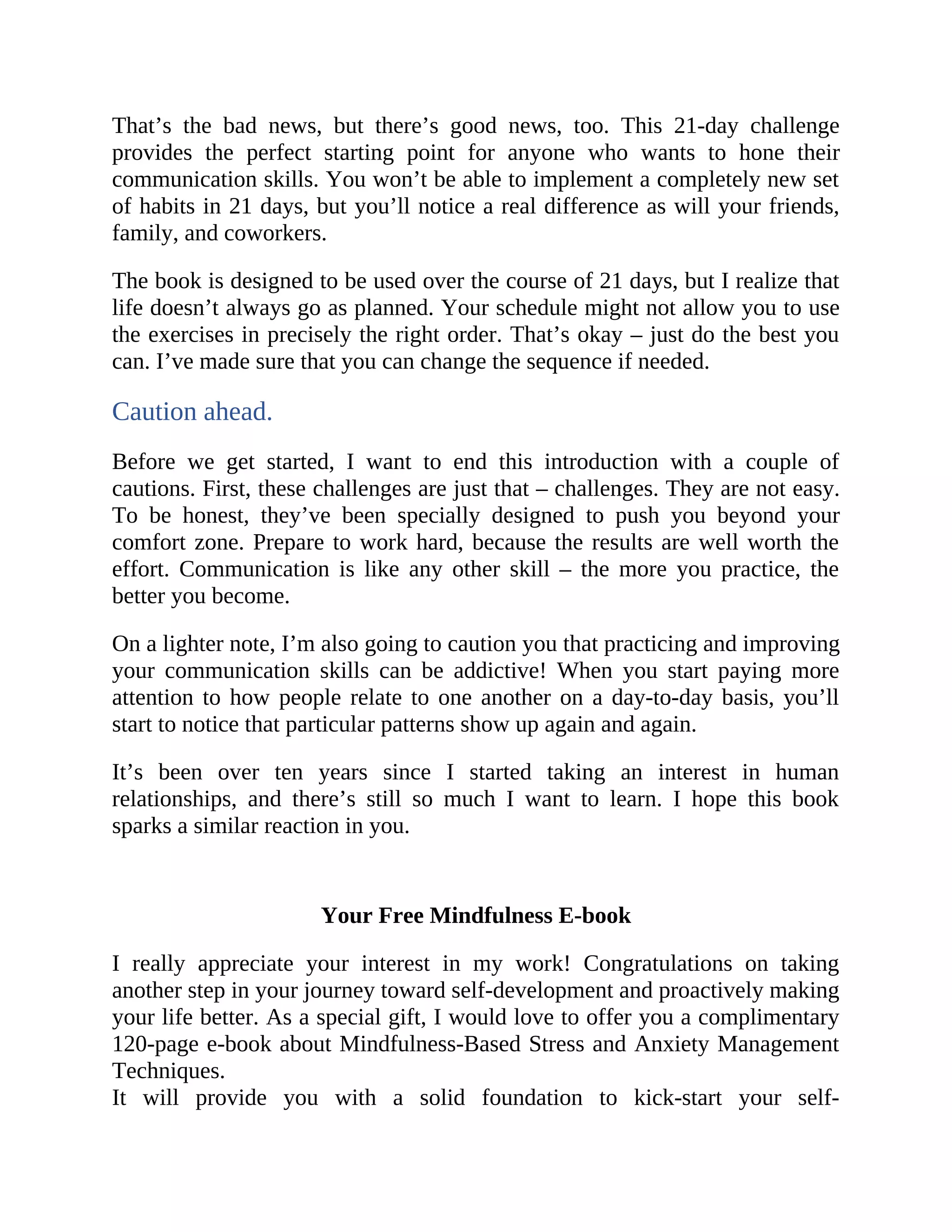

![Day 1: Listen
Before you even think about your responses to other people, you need to
sharpen your listening skills. Have you ever had a conversation with someone
whose body is there, but their mind is not? Frustrating, isn’t it?
Poor communicators think that “listening” is merely the act of waiting for
their turn to speak all while mentally composing their response. This is a
grave mistake. Listening is so much more – it’s a way of providing someone
else the chance to share their thoughts and ideas, to build emotional intimacy,
and to show empathy.
Today, you’re going to learn the basics of great listening, and then undertake
an exercise that will allow you to put these tips into practice.
Listening isn’t simply about giving another person the chance to vocalize
what’s on their mind, although this is valuable in its own right. Listening is
also the first step towards personal change.
Psychotherapist Carl Rogers, one of the most influential psychologists of the
20th
century, noted that when someone gives us the chance to talk about what
has happened to us and how we feel about it, we start to realize the best way
to change our thoughts and behaviors.[4]
Although taking advice from someone else can be useful, we are most likely
to change for the better if we work through our problems out ourselves.
Being able to talk freely to an understanding listener is one of the most
effective ways of achieving this.
If your conversation partner rambles, or their thoughts don’t seem to make
sense, hold your tongue and give them the space they need. They might want
to talk to several other people first before implementing a plan, or they may
need to process the issue in their own time. Try not to get frustrated! Extend
to others the patience you would like to receive in return.
Top tips that will make you an outstanding listener
1. Use non-intrusive verbal and non-verbal signals to encourage them to
keep talking: Nodding, and saying, “Uh huh” and “I see” are short,](https://image.slidesharecdn.com/21daysofeffectivecommunicationeverydayexercisestoimproveyourcommunicationskill-211015142455/75/21-days-of-effective-communication-everyday-exercises-to-improve-your-communication-skill-12-2048.jpg)
![unobtrusive signals that encourage further disclosure. Silence is also okay –
sometimes, someone needs a few moments to get their thoughts organized
before continuing the conversation. Give them space.
2. Let them keep going until they run out of steam: When I learned to
listen properly, I was amazed to discover that a lot of people desperately want
someone to slow down and hear what they have to say. This is especially true
if they feel angry, upset, or need to work through a problem.
One of the most useful, fundamental – and difficult – listening skills of all is
to keep quiet and let the other person hold the floor. If you are dealing with
an angry or frustrated individual, they won’t be able to think clearly until
they have offloaded everything that’s on their mind.
3. Do not play the role of armchair psychologist: To some extent, everyone
is a psychologist. We all like to come up with our own theories about why so-
and-so is so angry all the time, why our cousin always falls for men who treat
her badly, etc.[5]
Analyze away – on your own time.
When someone shares important information with you, do not speculate
about their personal motivations, or why they behave in a particular manner.
At best, you’ll come across as a bit too nosy. At worst, your conversation
partner will feel patronized and angry. At you.
4. Do not interrupt with unsolicited advice: Even if you’ve been in the
same situation or faced the same problems as someone else, do not offer your
ideas or solutions unless asked for them. There are few things more annoying
than unwanted advice or suggestions.
Resist the urge to tell them that you know exactly what they are going
through. To put it bluntly, you don’t. Two people can have a similar
experience, yet their personality types, upbringing, and previous life events
mean that they will not experience the same emotions.
If your conversation partner asks for your input, then go ahead – but gauge
their response. If they appear open to your feedback, continue. However, if
they start frowning, crossing their arms, or give any indication that your
advice isn’t helpful or welcome, stop and ask whether they want you to](https://image.slidesharecdn.com/21daysofeffectivecommunicationeverydayexercisestoimproveyourcommunicationskill-211015142455/75/21-days-of-effective-communication-everyday-exercises-to-improve-your-communication-skill-13-2048.jpg)
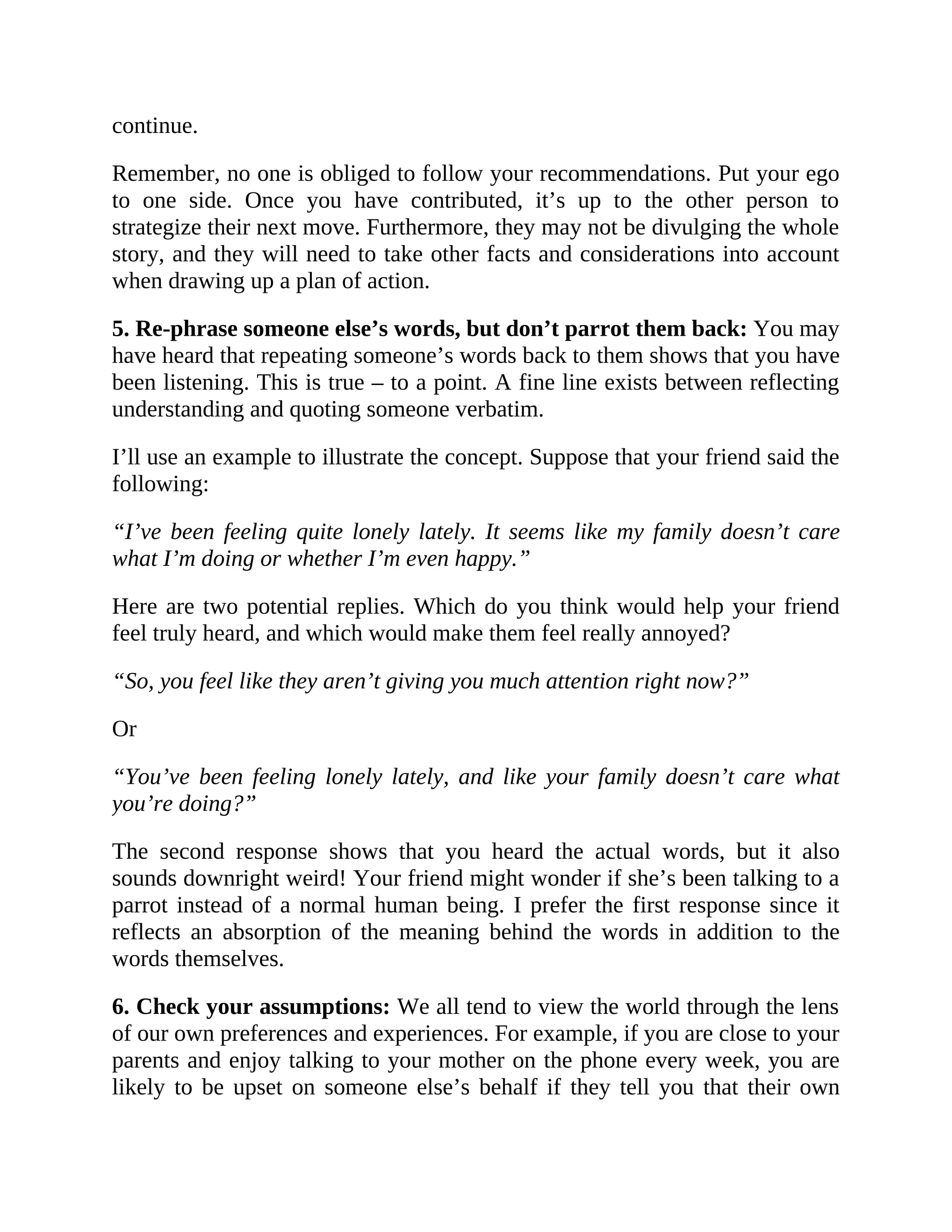
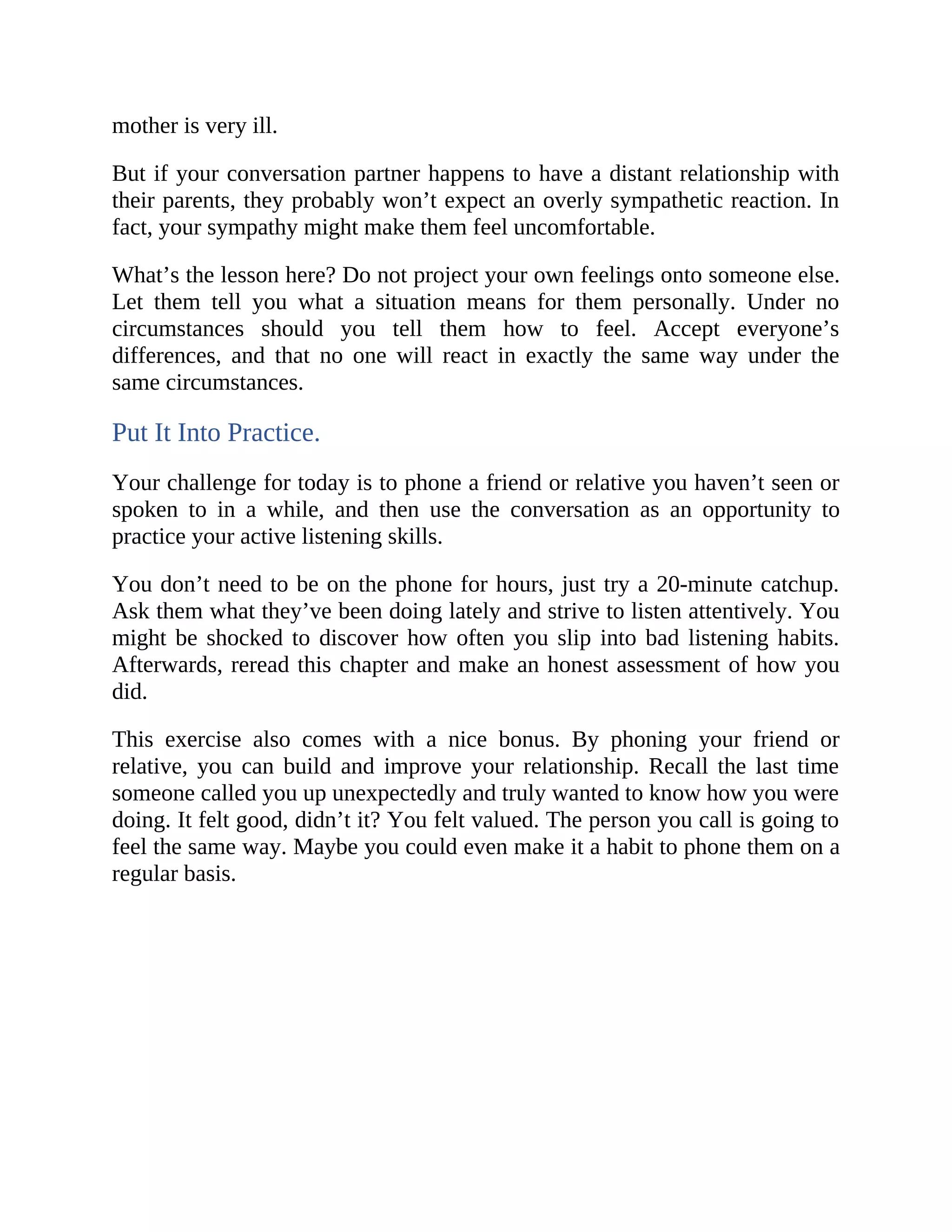
![Day 2: Count The Number Of Times You Interrupt
Other People
If you had to identify the most annoying communication habit ever, what
would it be? Admittedly there are a lot of contenders, but most of us agree
that being interrupted is among the most irritating. Today, you’re going to
examine how often you interrupt other people, and then work on giving your
conversation partners the time and space they deserve.
Interrupting people is easy to do. For example, if you participate in a heated
discussion, you might want to jump right in to exert your voice. If you’re
passionate about an idea, your enthusiasm might bubble to the surface.
But that’s where the challenge lies. Even if your ideas are excellent, your
conversation partner will be too annoyed to give them the attention they
deserve if you interrupt. By your interruption, you’re insinuating that your
thoughts and ideas are more important than theirs. As you know from
personal experience, interruptions derail your train of thought.
Interruptions also make someone feel disrespected.[6]
If someone values you
and your ideas, they will at least have the courtesy to let you finish speaking,
right? You need to apply the same principle when actively listening to others.
Interrupting can completely kill your chances of developing a good
relationship with someone else, and that’s not an exaggeration. If they feel as
though you are more interested in steamrolling over them with your personal
point of view instead of getting to know them, they will start to withdraw
from you.
Here’s how to kick the interruption habit:
1. Set targets and give yourself rewards: Set a realistic goal and choose a
small reward as a suitable incentive. For example, you could promise
yourself that if you make it through the day interrupting people fewer than
ten times, you will pick up your favorite magazine or candy bar on the way
home.[7]
2. Stick up signs: The simplest solutions can be the best! I keep a small](https://image.slidesharecdn.com/21daysofeffectivecommunicationeverydayexercisestoimproveyourcommunicationskill-211015142455/75/21-days-of-effective-communication-everyday-exercises-to-improve-your-communication-skill-16-2048.jpg)
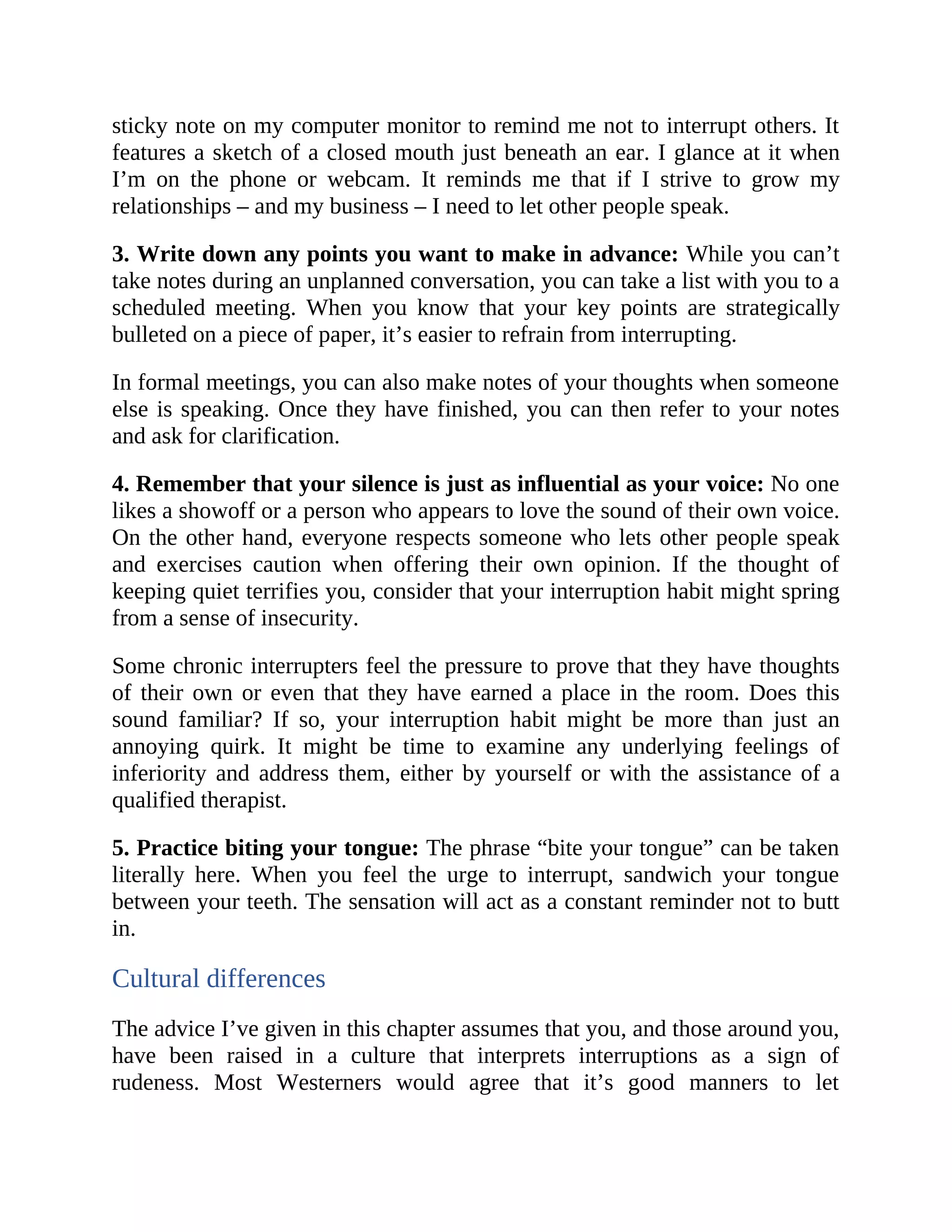
![someone else finish speaking before responding.
However, it’s useful to remember that there are cultural differences in how
people perceive interruptions. For instance, some cultures regard
interruptions and cross-talk as normal.
To give two specific examples, those of Italian descent tend to see
interruptions as an acceptable way of showing interest in a topic. Meanwhile,
people raised within Japanese culture often believe that it is acceptable to
interrupt someone to ask for clarification.[8]
When you meet someone, who seems especially quick to interrupt, consider
the possibility that there is a culture gap. It isn’t appropriate to ask someone
to describe their family’s heritage, but just knowing that these differences
exist can help you remain calm and patient.
You can bridge the gap by making an explicit request such as, “I’ve got
something really important to say and don’t want to forget anything, so if you
have any questions, could you please save them for the end?”
Put It Into Practice
Today’s exercise is really, really simple – or at least, it’s simple in theory.
Count how many times you interrupt other people in all your conversations,
and then use the tips above to stop yourself. Ideally, you should try to talk
with at least three people. If you can do this while in a group, even better.
The first time I tried this exercise, I was dismayed to discover that I struggled
to even let people finish their sentences. My intentions weren’t to be rude or
annoying, but my conversation partners must have been thoroughly irritated.
Unless I make an effort to keep myself in check, I still catch myself
interrupting others a bit too often. It’s a tough habit to break, but your friends
and family will thank you for it. Who knows, you might learn something new
if you master the art of keeping your mouth shut.](https://image.slidesharecdn.com/21daysofeffectivecommunicationeverydayexercisestoimproveyourcommunicationskill-211015142455/75/21-days-of-effective-communication-everyday-exercises-to-improve-your-communication-skill-18-2048.jpg)
![Day 3: Become An Inclusive Communicator
When it comes to politics and social issues, we all have our own opinions.
Yet one thing most of us can agree on is that everyone, regardless of their
background or individual characteristics, deserves to be treated with respect.
Today, you will learn about the importance of inclusive communication.
What is “inclusive communication” anyway?
In a nutshell, a good inclusive communicator takes care not to alienate or
offend an entire group of people based on their personal attributes. They do
not make assumptions based on an individual’s characteristics. Inclusive
communication acknowledges and values diversity.
Mastering this skill is increasingly important in the 21st
century. Thanks to
globalization, people from all backgrounds now work and socialize together.
Inclusive communication builds harmonious relationships between
individuals, and it even boosts business performance. Research reflects a
positive correlation between gender diversity, ethnic diversity, and profit in
organizations.[9]
Tips for inclusive communication
1. Don’t emphasize a characteristic if it isn’t necessary to do so: For
example, let’s suppose that you are telling your team that an employee from
another department is scheduled to work with them on a new project. This
employee, a man called Sam, happens to be gay.
It would not be appropriate to say, “Sam, the gay guy from Department X,
will be joining us on Monday.” Sam’s sexual orientation is not relevant to his
work, so drawing attention to this characteristic is not necessary.
2. Don’t assume a person’s gender or sexual orientation: Choose gender-
neutral terms if possible. For example, if your manager is leaving the
company and you do not yet know the gender of their replacement, it is more
appropriate to use “they” in reference to the possible candidates instead of
“he” or “she” until a permanent replacement is selected.](https://image.slidesharecdn.com/21daysofeffectivecommunicationeverydayexercisestoimproveyourcommunicationskill-211015142455/75/21-days-of-effective-communication-everyday-exercises-to-improve-your-communication-skill-19-2048.jpg)
![Do not assume that a person is heterosexual. It is better to use terms like
“partner” or “significant other” instead of “boyfriend,” “wife,” and so on.
3. If you need to talk about someone’s disability, do so in neutral terms:
It’s true that many people with disabilities do suffer as a result, but it is
presumptuous to make statements such as “Peter suffers from epilepsy” or
“Mary is afflicted with schizophrenia.”
4. Focus on a person, not any disabilities they might have: Do not define
someone by their condition or illness. For example, it is better to say, “Pat
has depression” rather than “Pat is a depressive” or “Pat is depressed.”
5. Do not uphold stereotypes: Making assumptions based on someone’s
nationality, ethnicity, or other characteristics is offensive because it shows a
lack of respect for someone’s individual talents and personality. This
philosophy stays true even of positive stereotypes.
For example, if you meet a Chinese accountant, it would be inappropriate to
suggest that Chinese people naturally make good accountants because
“Asians are so good at math.”
6. Show respect for race and ethnicity through proper capitalization in
written communication: For instance, “Native American”, “Black”, and
“Torres Strait Islanders”, should always be capitalized. If in doubt, look up
the term in a dictionary or use a reputable online resource.
7. Be mindful of context: Bear in mind that in some instances, it is
acceptable for members of a group to use words that would be offensive if
used by outsiders. For example, some members of the LGBT+ community
refer to themselves as “queer.”
However, this word is usually considered offensive if used by a heterosexual
person, and not all LGBT+ people accept it in the first place. If in doubt, any
“loaded” terms that have historically been used to insult or belittle others are
best avoided.[10]
8. Avoid patronizing individuals or groups of people: If you have a
disability, you might have heard someone describe you as “brave” or
“inspiring” for carrying out normal day-to-day tasks such as cleaning your](https://image.slidesharecdn.com/21daysofeffectivecommunicationeverydayexercisestoimproveyourcommunicationskill-211015142455/75/21-days-of-effective-communication-everyday-exercises-to-improve-your-communication-skill-20-2048.jpg)
![home, going to work, or exercising at the gym.
I have a cousin who walks with a cane following a car accident several years
ago. Several well-meaning people have praised him for being “an
inspiration”. Their intentions are good, but my cousin just feels patronized.
Do not assume that just because someone has a disability that they want to be
recognized for merely existing!
Is inclusive communication really necessary?
I respect the fact that some people think inclusive communication is “too
politically correct.” However, wherever your personal views land, you can
quickly find yourself in trouble if you do not use inclusive communication.
For instance, using sexist language in the workplace could land you in hot
water with HR, or earn you a reputation as someone who doesn’t keep up
with modern etiquette.
Why making offensive jokes is harmful, even if you really are
“only joking”
Over the years, I’ve met a few people who claim that it’s acceptable to make
offensive jokes, or stereotype groups of people, as long as you don’t really
hold offensive views.
But here’s something to think about – people who do support negative
stereotypes and hold racist, sexist or other offensive views will feel justified
whenever they hear such “jokes.”
This means that racism, sexism and other forms of bigotry go unchallenged.
[11]
Do not make jokes that rely on disparagement humor, and let others know
that you don’t find them funny.
Put It Into Practice
Exercise I
Do you express assumptions or stereotypes (whether positive or negative)
when talking about particular groups? The next time you take part in a](https://image.slidesharecdn.com/21daysofeffectivecommunicationeverydayexercisestoimproveyourcommunicationskill-211015142455/75/21-days-of-effective-communication-everyday-exercises-to-improve-your-communication-skill-21-2048.jpg)
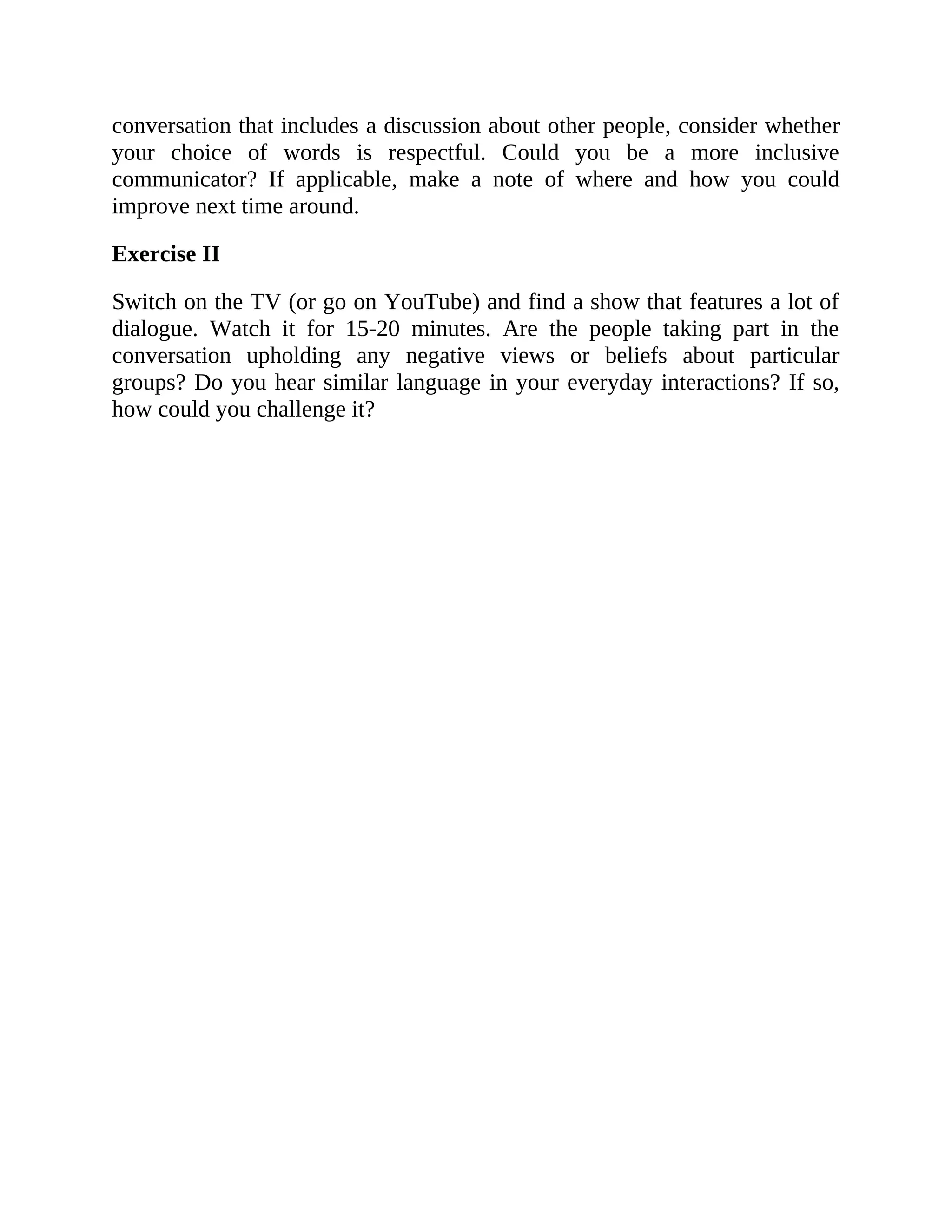
![Day 4: How To Expand Your Vocabulary
You will be judged more favorably in social situations if you can demonstrate
a broad vocabulary. Most people assume higher levels of education and
intelligence when a person knows the meaning of many words and can use
them correctly within the scope of normal conversation.
Those who understand and appreciate complex words and phrases are at a
real advantage, both personally and professionally. Today, you will learn why
a big vocabulary is a valuable asset, and how to add more words to your
personal dictionary.
Why your vocabulary really does make a difference
There is a link between vocabulary and occupational success. A study by
linguistics and education researcher Johnson O’Conner found that people
who achieve high scores on vocabulary tests are significantly more likely to
obtain high-level positions in the workplace.
This finding still applies when gender, age, and level of schooling are
controlled.[12]
Even more interesting, vocabulary test performance predicts
success – it’s not just a byproduct of working in senior positions or
encountering with educated people.
So, what’s going on here? In a nutshell, a strong vocabulary is the best
foundation for communication, and communication is the starting point for
success. When you have more words at your disposal, you are in a better
position to deliver exactly the right message.
The richer your vocabulary, the more accomplished you will become in
communicating nuanced ideas, and in understanding new lines of thought and
reason.[13]
Someone with a wide vocabulary can tailor their oral and written
communication to a range of audiences, meaning that they can grow
productive relationships with others that allow them to flourish.
A wide vocabulary also allows you to absorb information from complex
sources, which provides you with the tools you need to improve your](https://image.slidesharecdn.com/21daysofeffectivecommunicationeverydayexercisestoimproveyourcommunicationskill-211015142455/75/21-days-of-effective-communication-everyday-exercises-to-improve-your-communication-skill-23-2048.jpg)
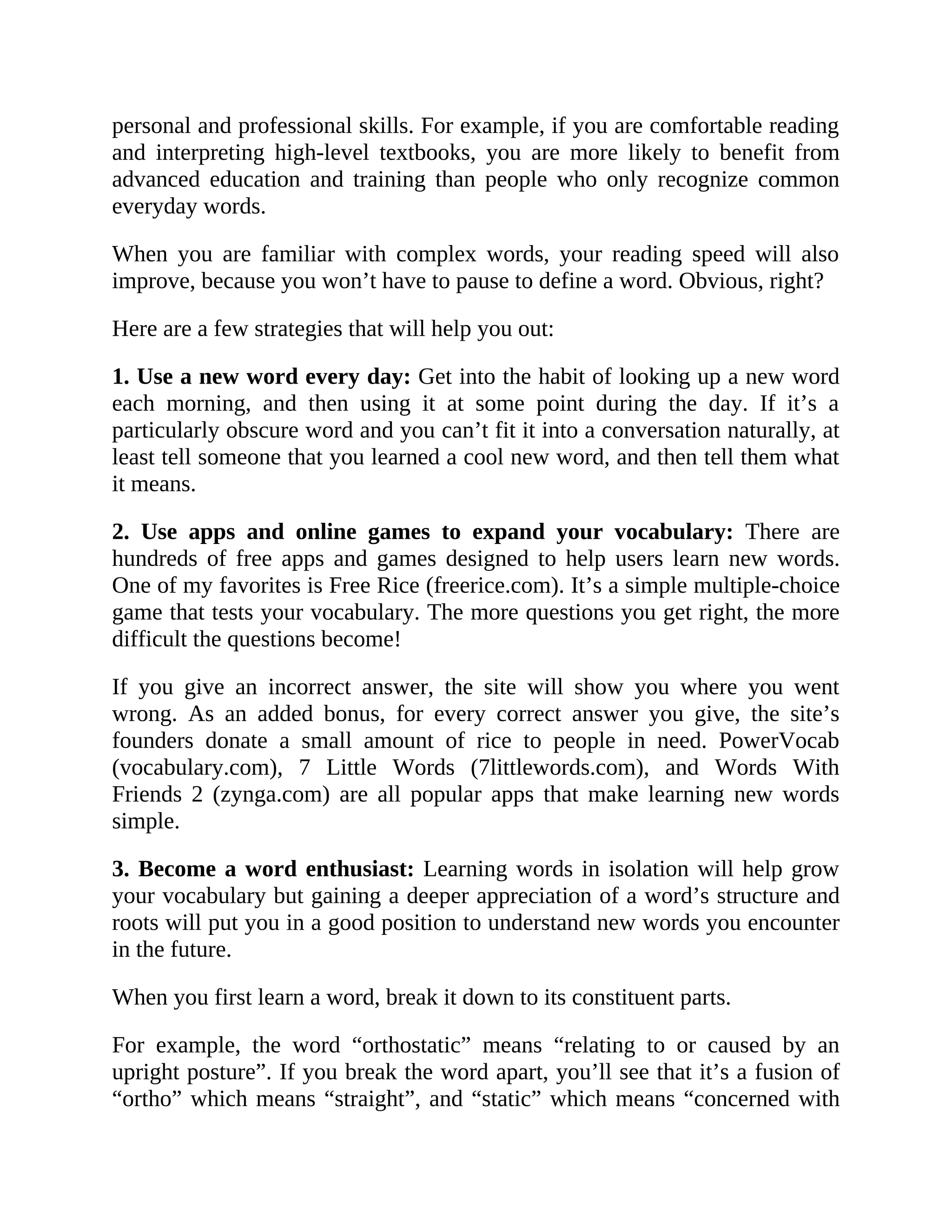
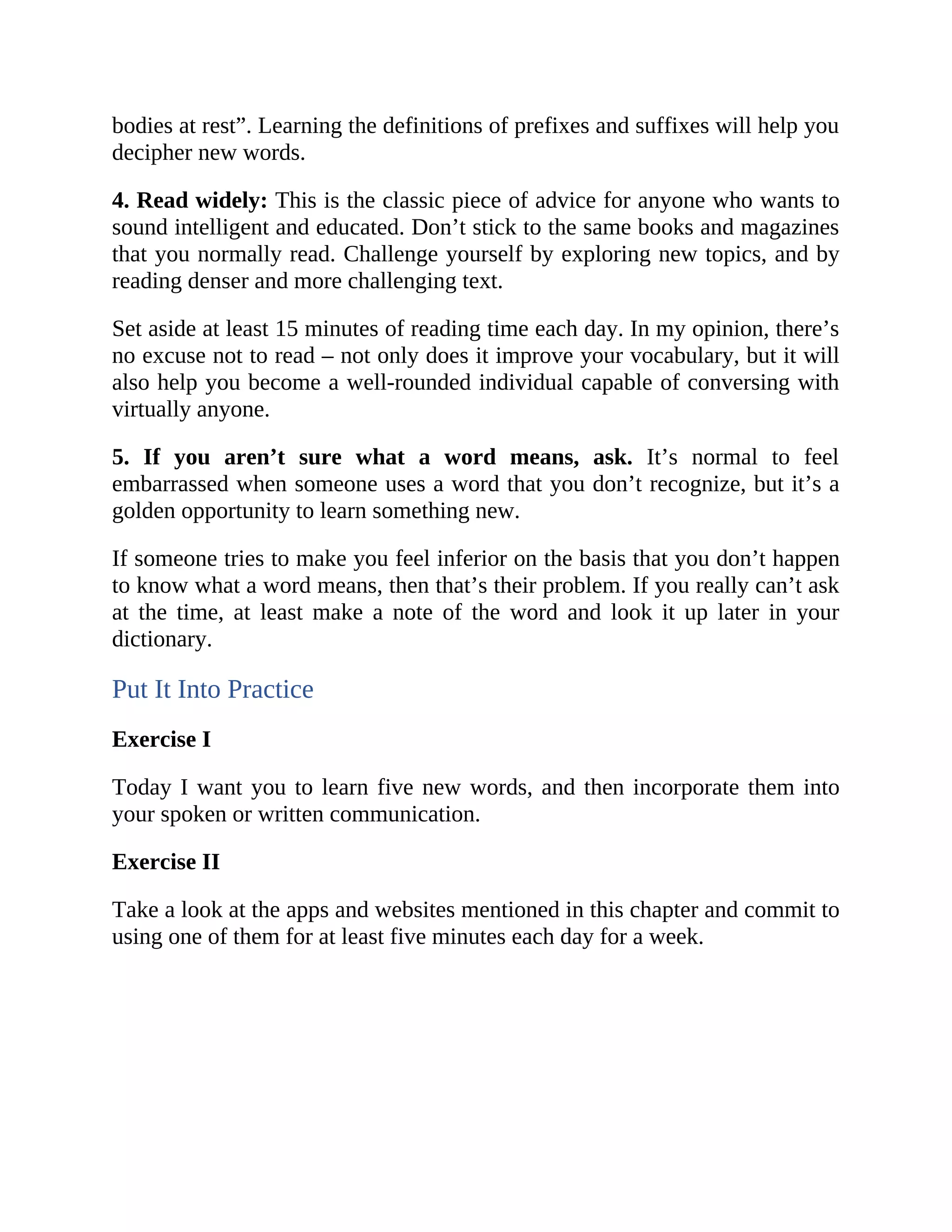
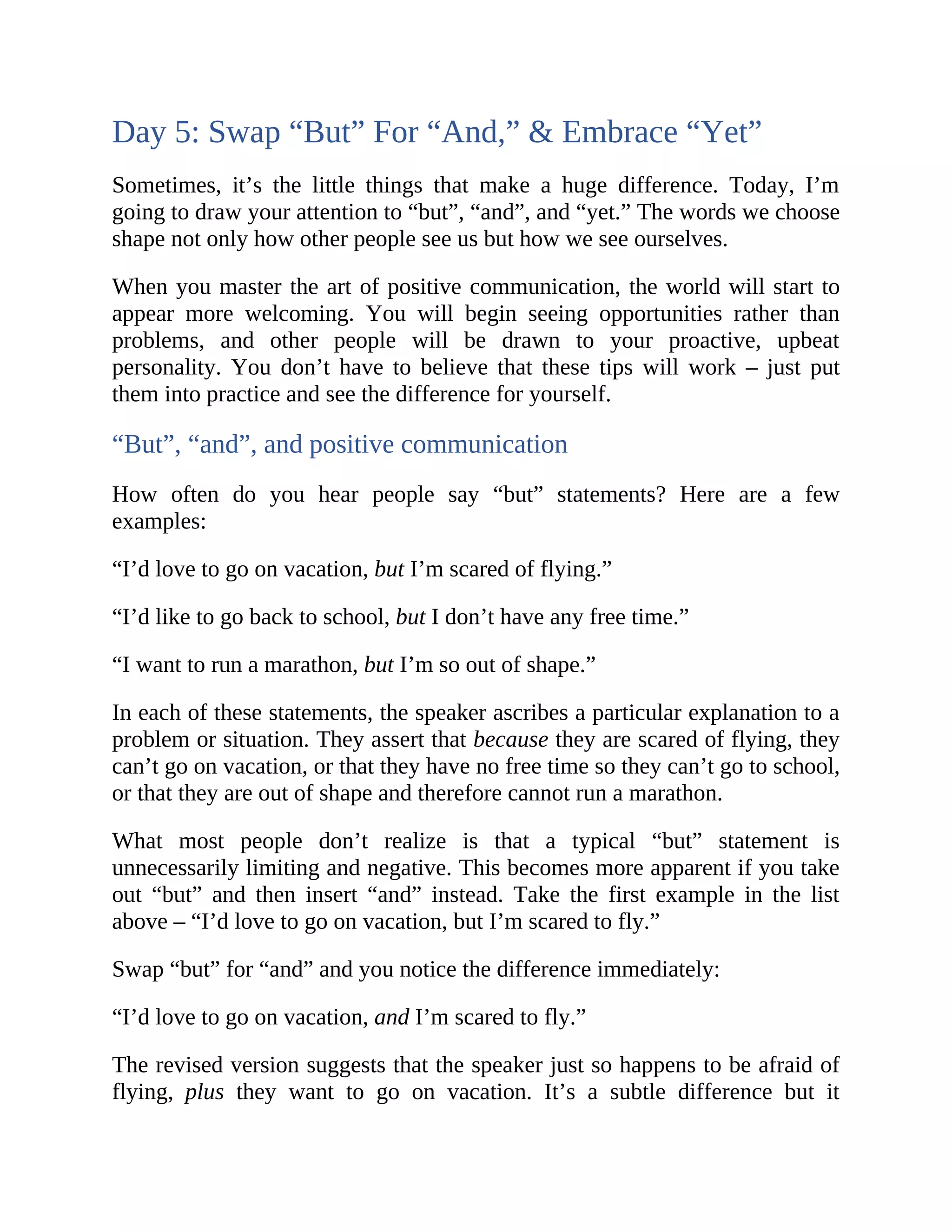
![matters! It implicates that the person has a desire plus a problem to be solved,
rather than a desire that will be thwarted by their problem.
When I start working with a client, I often notice that they parrot the same old
“but” statements repeatedly. They become our own personal stories – excuses
that we don’t question. We assume that they are true and take them to heart
as the gospel truth.
These intrinsic beliefs become somewhat akin to a script. The more you
repeat them, the further entrenched you are in the role of someone who would
love to change their life yet cannot do so because they are held back by a
single factor beyond their control.
When I teach my clients to drop the “buts” and swap them for “and” instead,
I usually see a rapid transformation. Within a few minutes, this mindset shift
starts to show in their expression. Hope replaces desperation as they realize
that the way you frame a situation makes all the difference when coming up
with solutions to a challenge.
Another problem with using “but”
“But” can also make people defensive. As soon as we hear that little word,
most of us assume that criticism or bad news is on the horizon.
For instance, if you were to tell someone that you understand their point but
want to use another approach, they are likely to feel threatened and criticized.
However, telling them that you understand their view and want to use another
strategy will usually elicit a more positive response.
It implies that you value their input, even though you won’t put it into action.
This technique generates a sense of closeness and mutual allegiance.[14]
The power of “yet”
Simply putting “yet” on the end of a negative statement can transform its
meaning.
Let’s look at a few examples:](https://image.slidesharecdn.com/21daysofeffectivecommunicationeverydayexercisestoimproveyourcommunicationskill-211015142455/75/21-days-of-effective-communication-everyday-exercises-to-improve-your-communication-skill-27-2048.jpg)
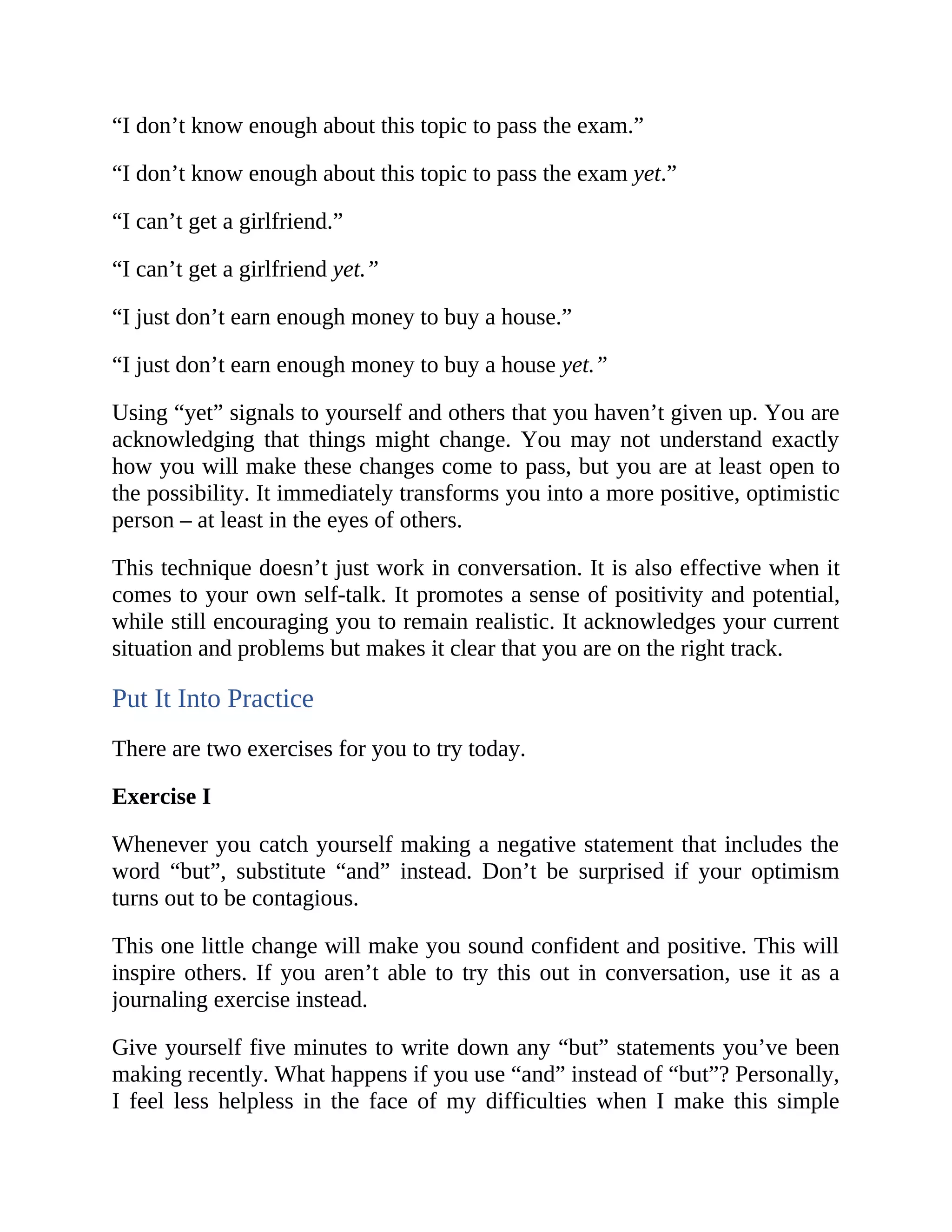
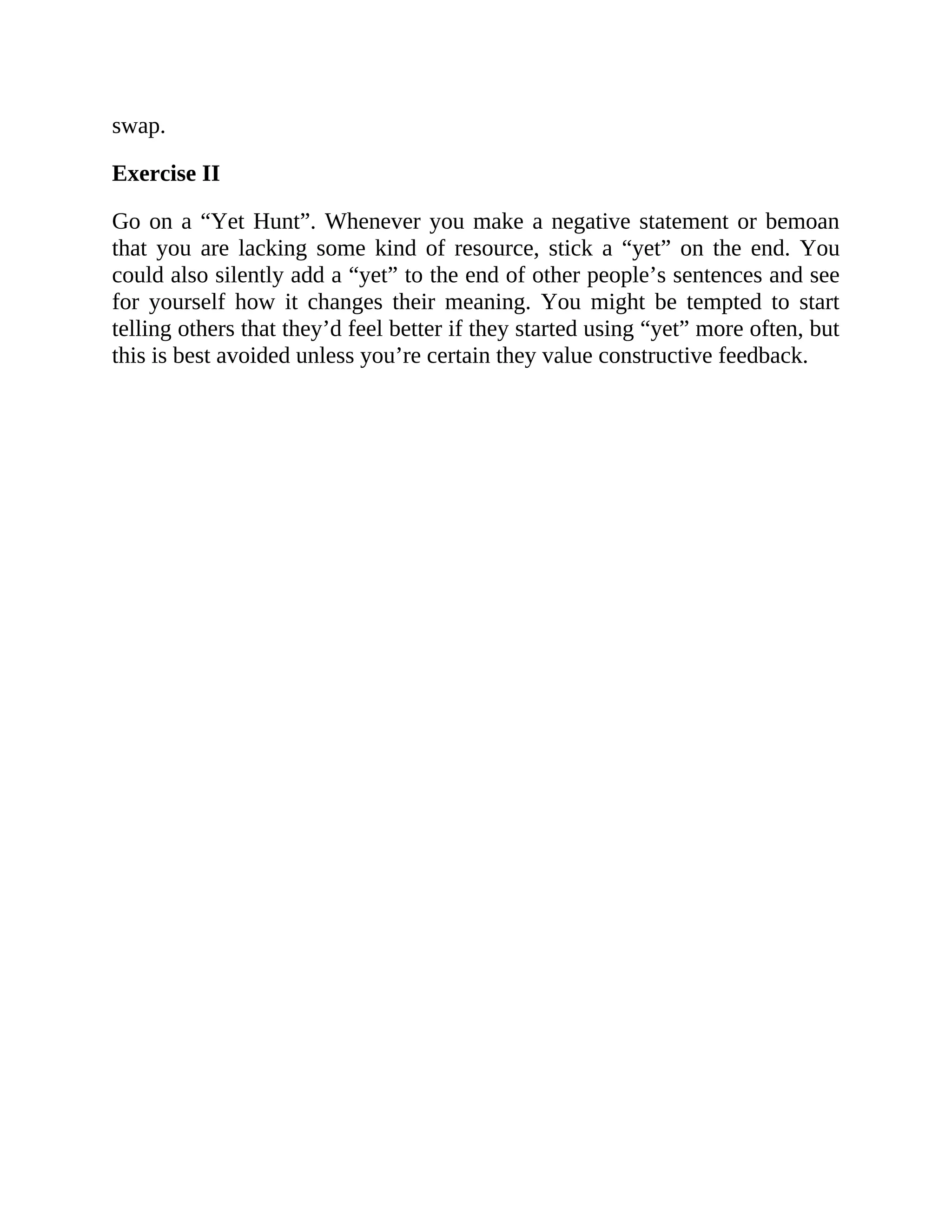
![Day 6: Watch Your Pronouns
Unless you are reciting a monologue, you need to always consider the needs
of your conversation partner. Never bore them. Break this rule at your peril.
There’s no point in getting your views across if no one is going to be
listening to them anyway.
Do you like to talk about yourself? You’re normal!
If you were to ask the average person whether they enjoy talking about
themselves and listening to the sound of their own voice, they would
probably say “Me? No, of course not”. But let’s get real – most of us love
talking about ourselves. In moderation, that’s perfectly okay. You are living
your own life, so it’s natural that you find your own experiences fascinating.
In addition, people who never reveal anything about themselves are not
perceived as trustworthy. The best communicators know how to balance self-
disclosure with respect for other people.
Limit your “I”s
A fascinating research study carried out in 1988 at the University of
California found a link between narcissism and the number of times a person
used “I” during a five-minute monologue. The subjects, 24 men and 24
women, were allowed to speak on a topic of their own choosing for several
minutes.
Their monologues were recorded, and the researchers then counted the
number of times each person used first person pronouns. The participants
who achieved higher scores on measures of narcissism tended to use “I” more
often.[15]
So, does this mean that “I” talk is a reliable indicator of narcissism? Not
quite. Later research has shown that there actually is no relationship between
the two.[16]
What does this mean for those of us who want to make a good
impression?
Here’s the important part – although psychologists disagree on whether “I”](https://image.slidesharecdn.com/21daysofeffectivecommunicationeverydayexercisestoimproveyourcommunicationskill-211015142455/75/21-days-of-effective-communication-everyday-exercises-to-improve-your-communication-skill-30-2048.jpg)
![talk is really related to narcissism; the average layperson picks up on it. In
other words, a psychologist might realize that “I” talk doesn’t necessarily
mean you are narcissistic, but most other people will.[17]
In conclusion, it’s
safe to say that avoiding excessive “I” talk will benefit you.
When to use “I”
Too much “I” talk will not endear you to anyone, but sometimes it’s the best
approach. Here’s when you should use it:
1. When you are being assertive: If you are standing up for your rights,
using “I” draws a firm line between you and someone else, allowing you to
state exactly how the situation makes you feel.
Let’s suppose that your partner fails to do their fair share of the household
chores. Instead of listing their faults in an aggressive manner and telling them
that they need to change immediately, it would be more effective to use “I”
talk to explain how their actions have made you feel.
Someone can argue with your interpretation of their actions, but they can’t
argue with your own feelings. “I” statements are less inflammatory than
accusations beginning with “you.”
To continue with the above example, it would be better to say, “I feel
undervalued when I come home to find that you have not cleaned the kitchen
after you promised to do so” than “You don’t do anything, and the house is a
complete mess!”
2. When you want to introduce a potentially controversial opinion: If you
are talking about a sensitive topic, such as religion or politics, it’s a good idea
to communicate to everyone listening that you can tolerate other people’s
opinions. Your views are your own and do not represent those of everyone
else.
To avoid appearing rude, do not present your opinion as fact – preface it with
an “I.” Countless arguments could be prevented if only people took a second
to acknowledge that not everyone feels the way they do, and that differences
are okay.](https://image.slidesharecdn.com/21daysofeffectivecommunicationeverydayexercisestoimproveyourcommunicationskill-211015142455/75/21-days-of-effective-communication-everyday-exercises-to-improve-your-communication-skill-31-2048.jpg)
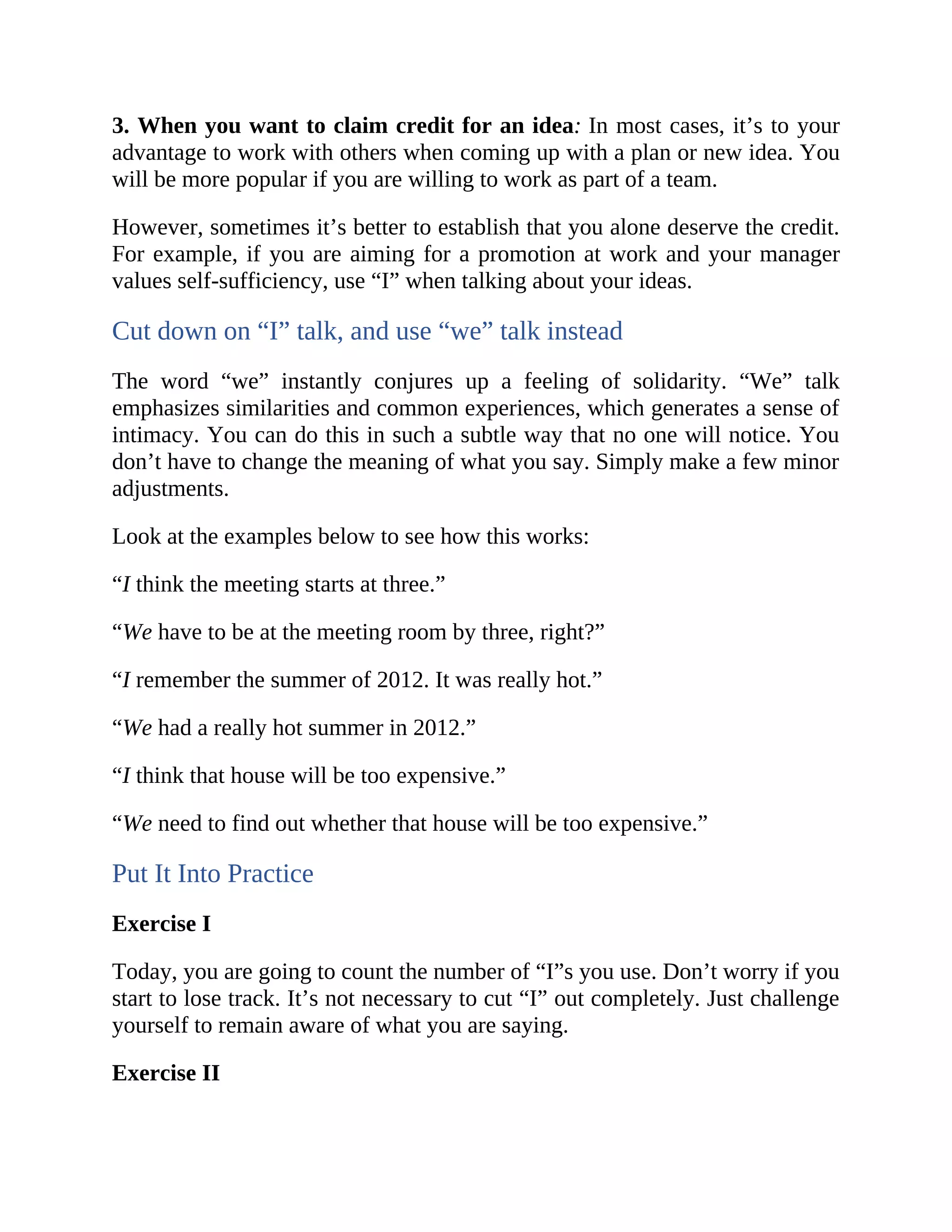

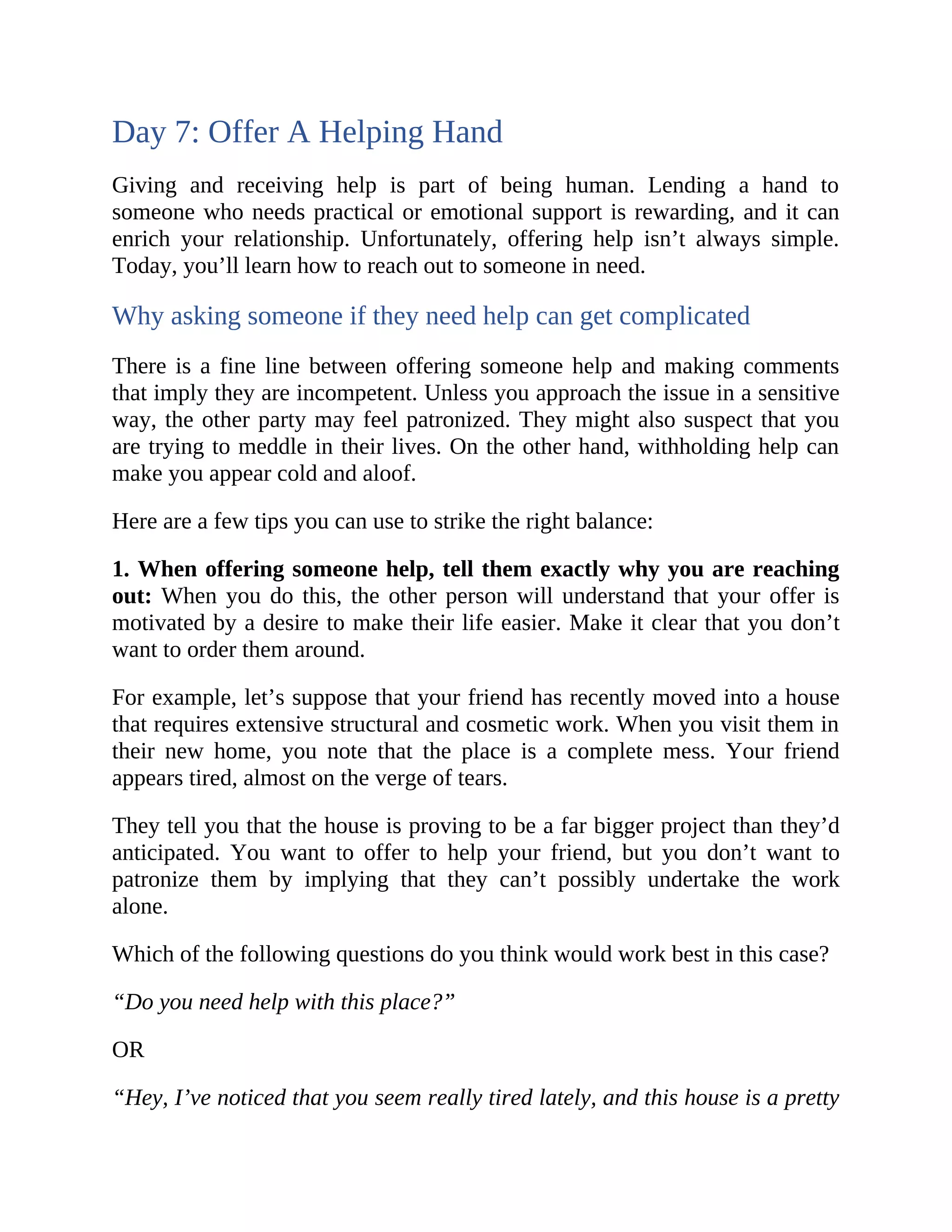
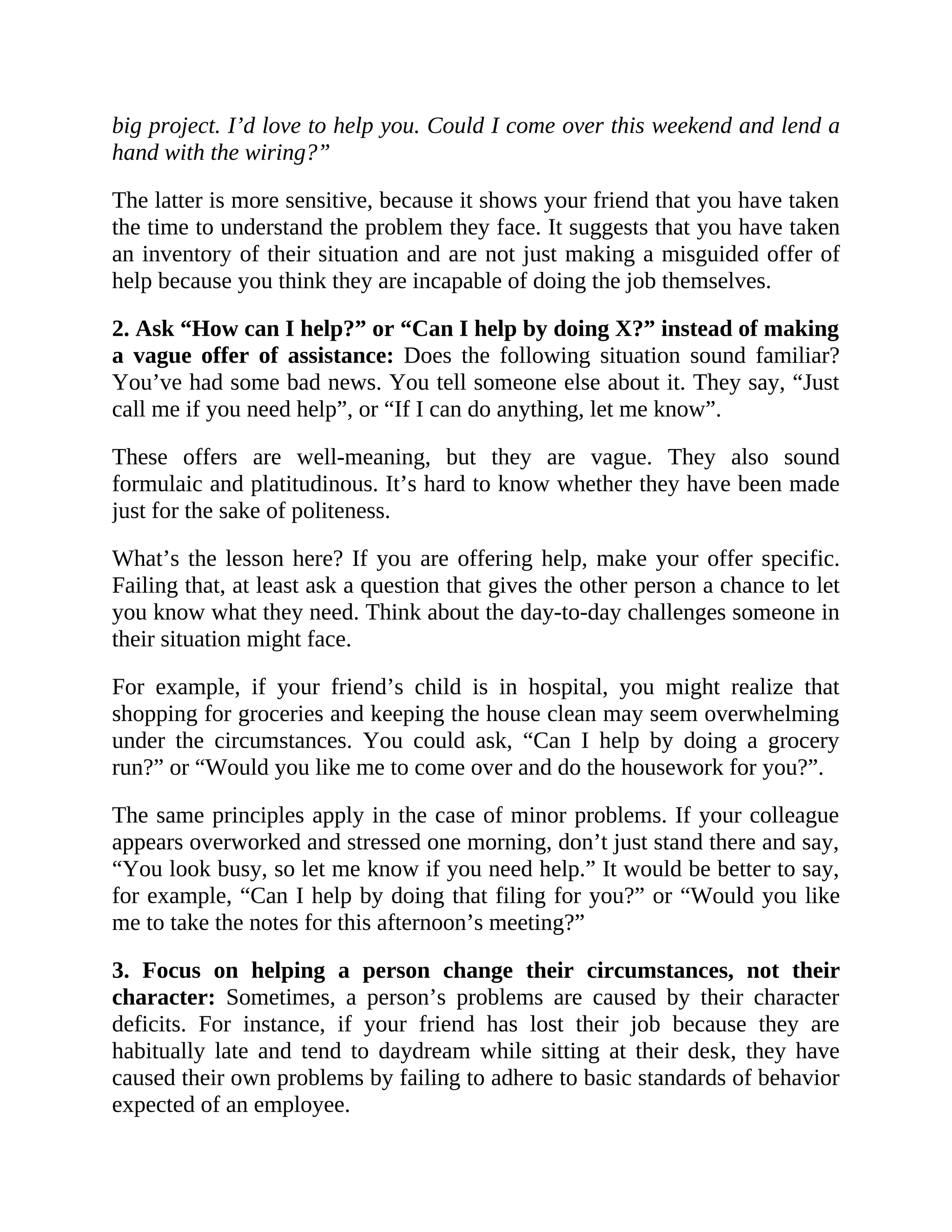
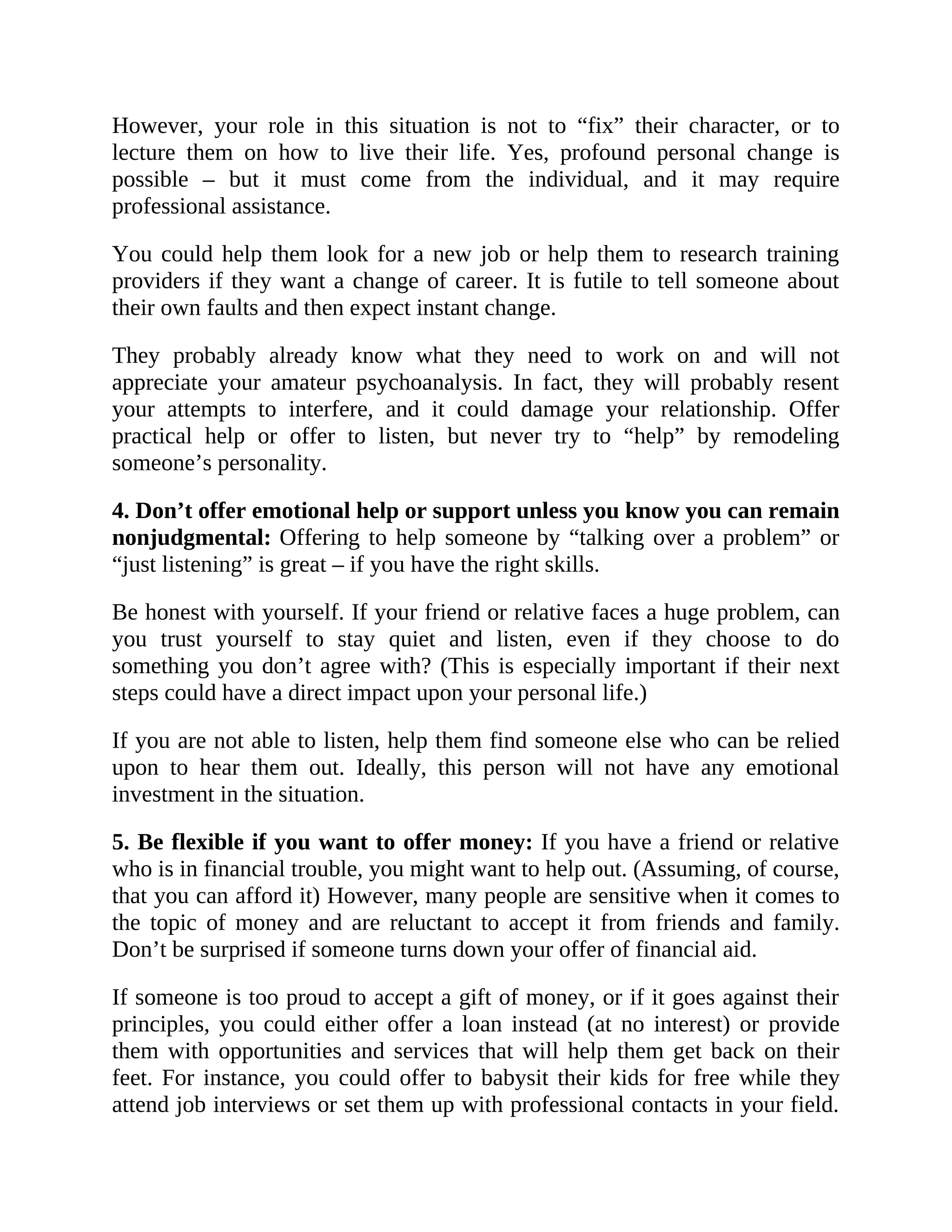
![[18]
Put It Into Practice
Do you know someone who has been having a hard time lately? Call them up
and offer your help. Make sure you know in advance what you are capable of
giving and that you don’t promise more than you can deliver.](https://image.slidesharecdn.com/21daysofeffectivecommunicationeverydayexercisestoimproveyourcommunicationskill-211015142455/75/21-days-of-effective-communication-everyday-exercises-to-improve-your-communication-skill-37-2048.jpg)
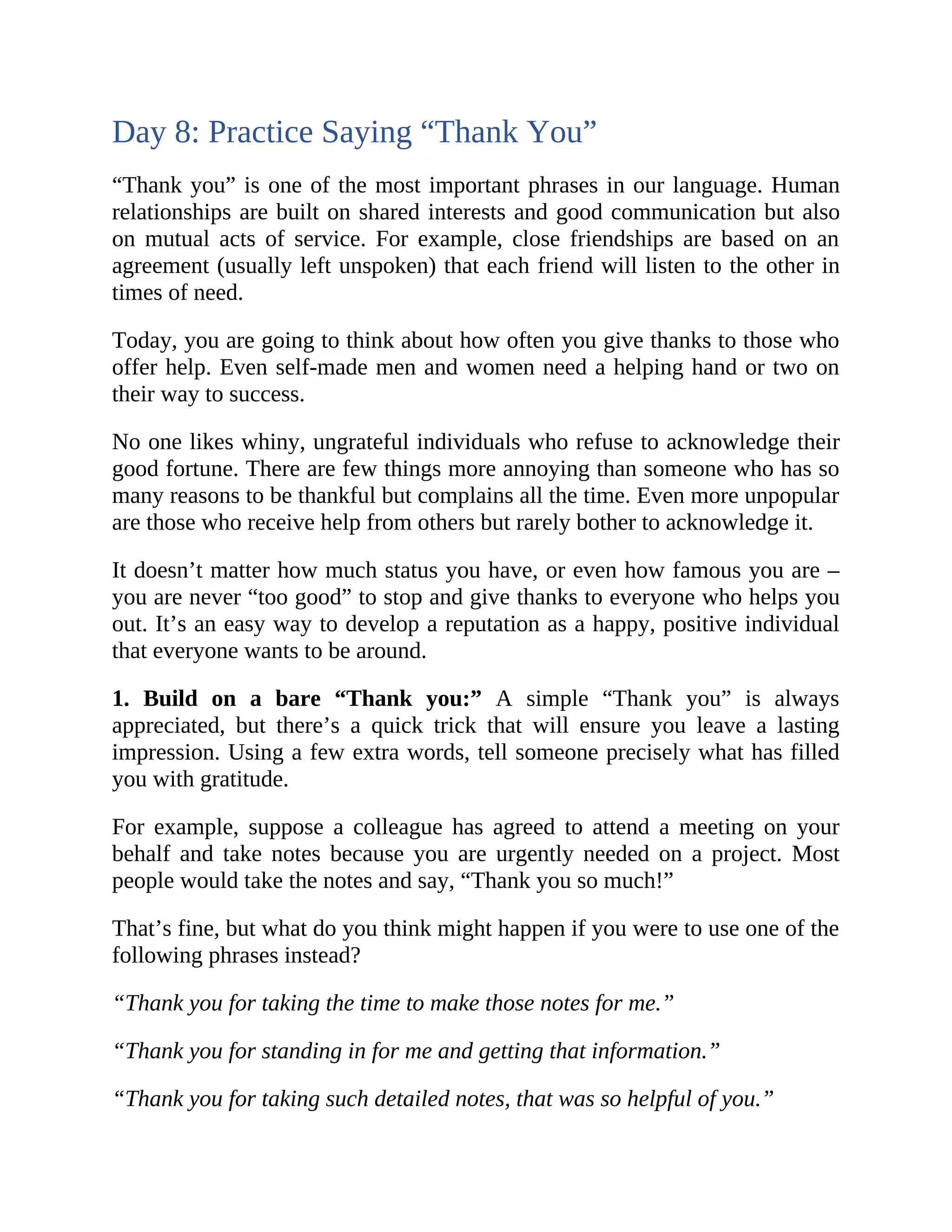
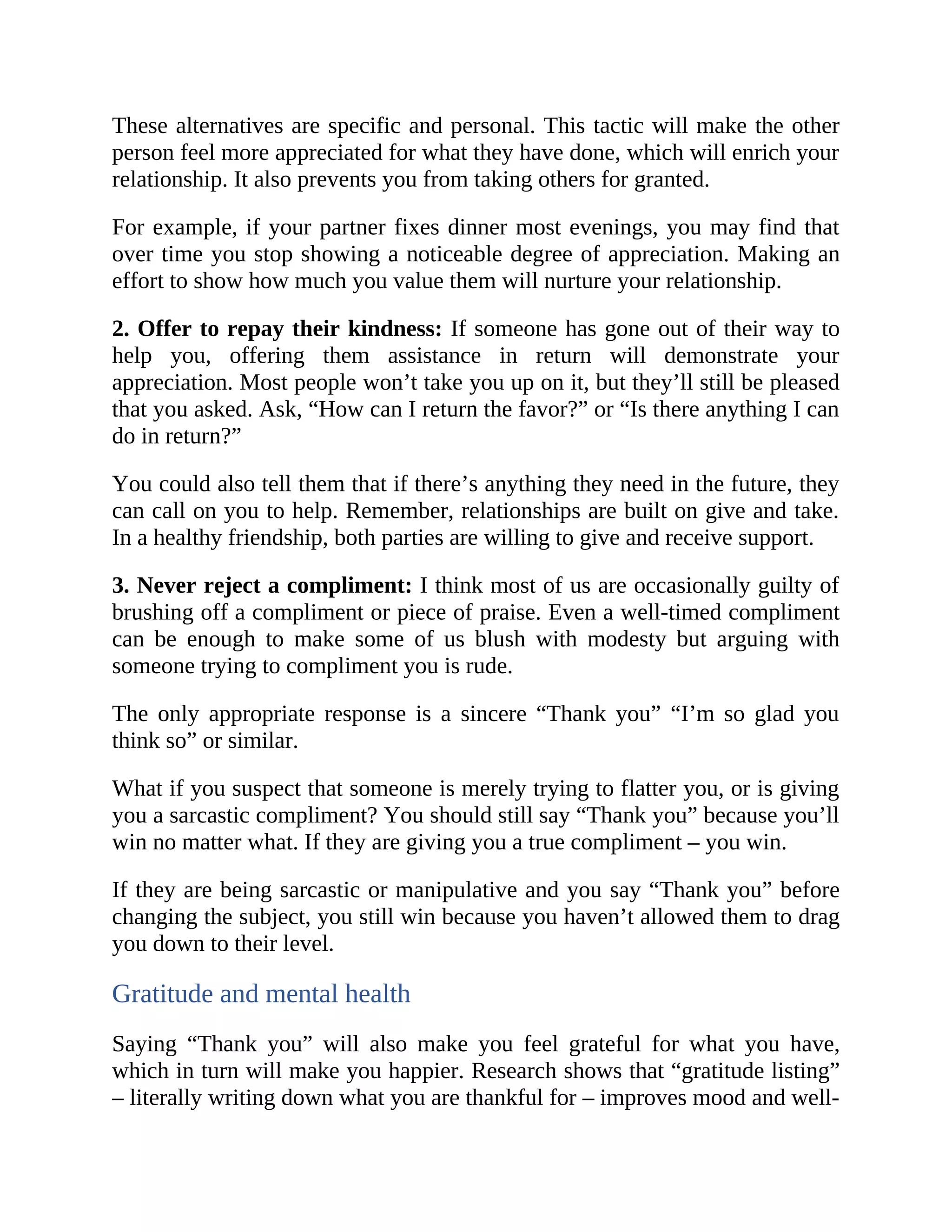
![being. This is even true for people living with a chronic health condition.[19]
When you make a point of thanking other people, you will automatically start
noticing what goes well in your life. It helps you develop a growth mindset,
which encourages you to identify opportunities instead of obstacles.
Unsurprisingly, research has also shown that people who are thanked for their
efforts enjoy greater mental health than those who feel underappreciated.[20]
Put It Into Practice
Exercise I
Today, your challenge is to find opportunities to express thanks and gratitude.
There are bound to be at least a few people to thank. Let everyone know how
much their help means to you.
Even if someone just holds the door open, look them in the eye and say,
“Thanks a lot!” If you are lucky enough to be on the receiving end of a
significant act of kindness, let the other person know how much you
appreciate them.
Exercise II
If possible, take it one step further and make time to tell a loved one how
much you value their ongoing help and support. You could even call them up
just to tell them how wonderful they are!
One day, I realized that I had never told my mother how much I appreciated
all the support she’d given me during my college years, especially those
times I struggled to stay motivated.
That night, I called to let her know how vital her love and help had been on
my academic journey. I told her that although I should have made that call
years ago, I figured it was better late than never. She was surprised, but then
burst into happy tears. Never underestimate the power of a sincere “Thank
you.”](https://image.slidesharecdn.com/21daysofeffectivecommunicationeverydayexercisestoimproveyourcommunicationskill-211015142455/75/21-days-of-effective-communication-everyday-exercises-to-improve-your-communication-skill-40-2048.jpg)
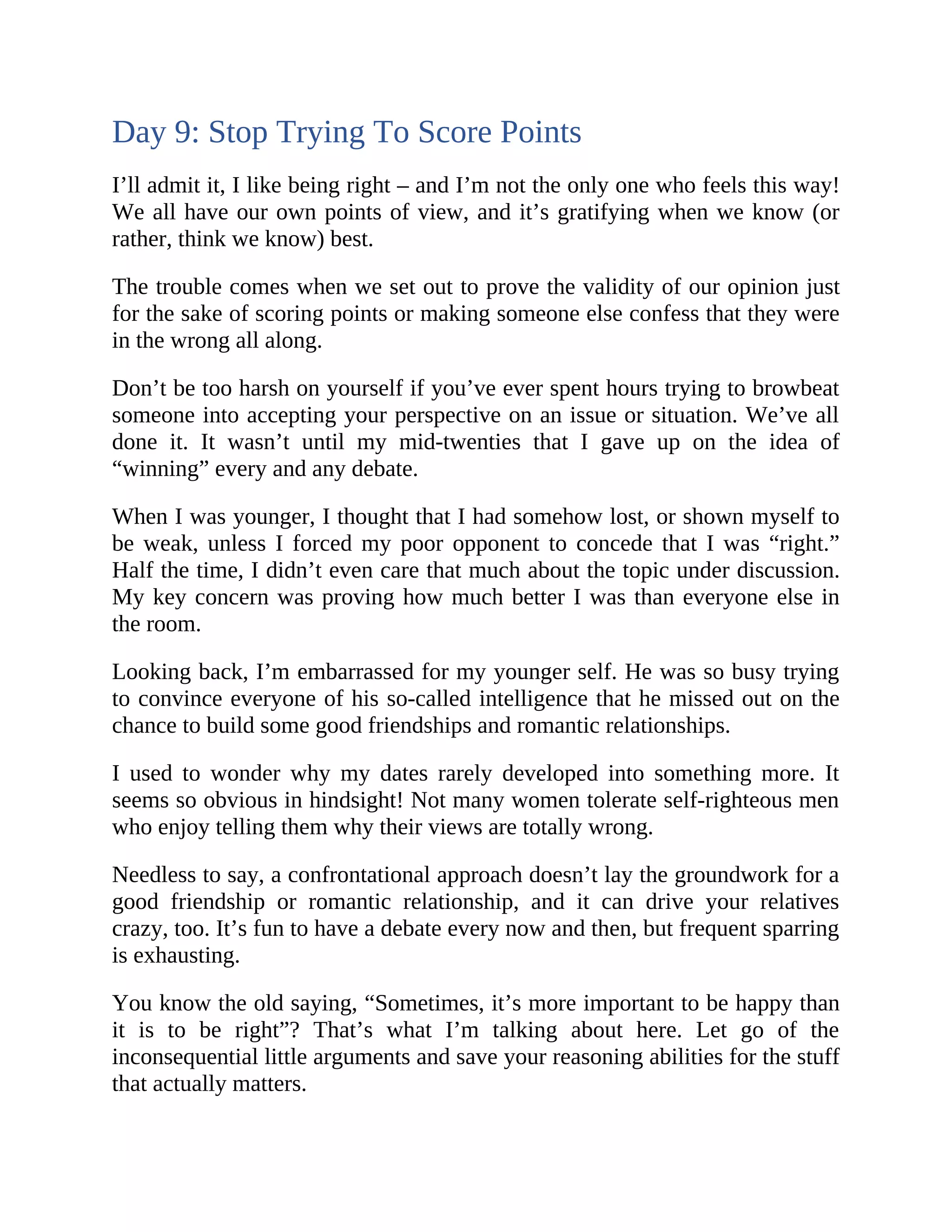
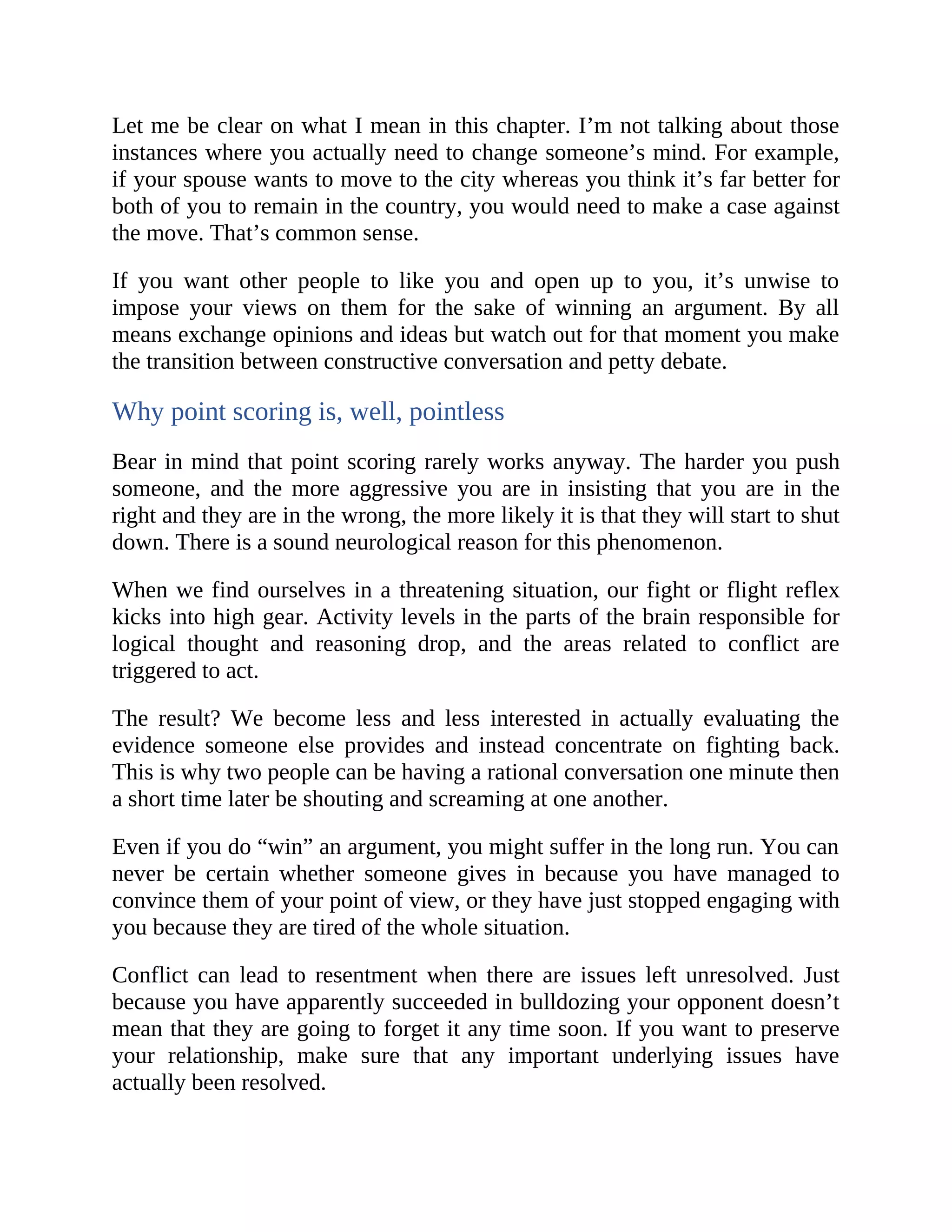
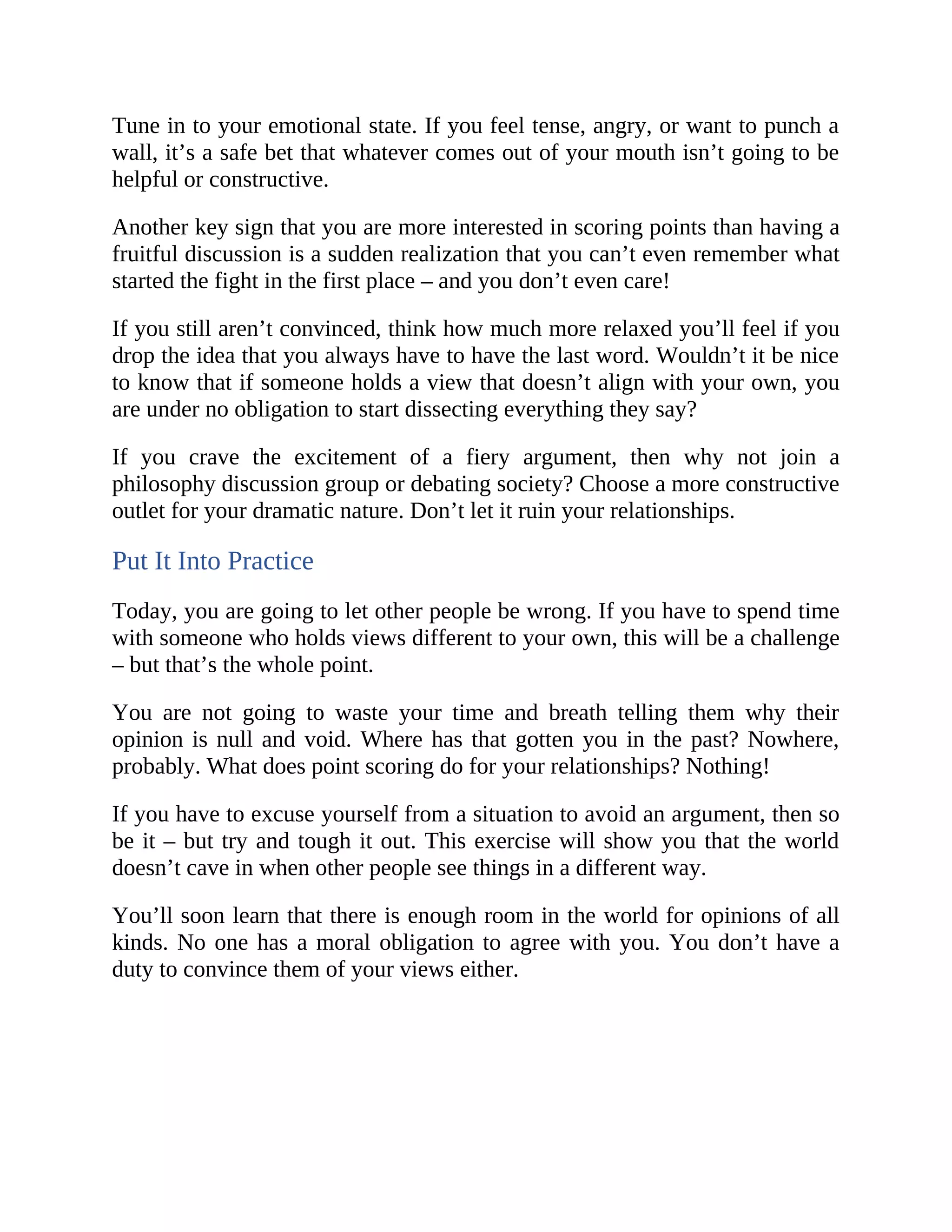
![Day 10: Ask Questions That Get Results
When you need to uncover information fast, what do you do? Ask questions,
of course! It should be so simple, shouldn’t it? Unfortunately, as you know,
it’s not always easy to get clear answers from other people.
You can’t force anyone to answer you, but you can greatly increase your
chance of a good result by refining the way you ask questions.
Here’s how to get answers:
1. Build up gently to high-pressure questions. No one likes having an
important question sprung upon them. Show some empathy for their position.
For example, let’s say that you want to ask your manager some questions
about your chances of receiving a raise next year.
Rather than charging in and asking immediately whether you think your
salary will receive a boost, ask them whether it’s a good time to talk about
your position at the company and prospects for the future.
2. Decide whether an open or closed question is better. We’re often told
that asking open questions – those beginning with “Why” and “How” – is a
better approach than asking closed questions that can be answered with a
“Yes” or “No.”
It’s true that the former will yield more in-depth responses, but this isn’t
always a good thing. For instance, if you are talking to someone who is
renowned for rambling on without getting to the point, it might be best to use
a closed question instead.
3. Use a four-part structure when helping someone deal with a problem.
Questions don’t just help you obtain information. They are also a good way
of helping someone through a crisis.
Empathy and sympathy will only take you so far. Asking the right questions
will help someone come up with a plan of action that gets to the root of the
problem.
Executive coach Irene Leonard recommends taking a four-step approach:[21]](https://image.slidesharecdn.com/21daysofeffectivecommunicationeverydayexercisestoimproveyourcommunicationskill-211015142455/75/21-days-of-effective-communication-everyday-exercises-to-improve-your-communication-skill-44-2048.jpg)
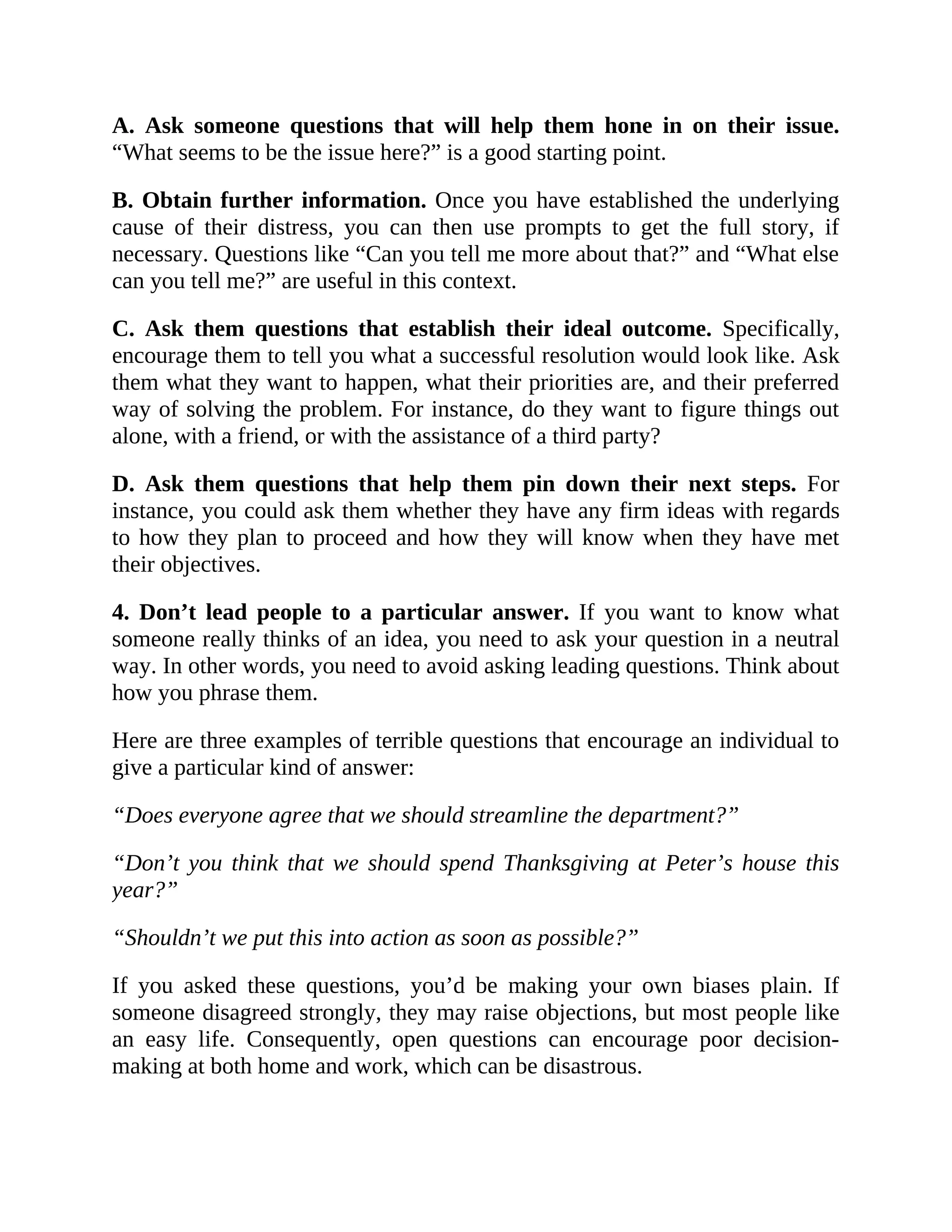
![This is even more likely if you have a strong personality, because not many
people will be willing to tackle your assumptions and challenge your
thinking.
Let’s look at a better way to ask those questions:
“What does everyone think we should do with regards to the department’s
structure?”
“Where do you think we should spend Thanksgiving this year?”
“When do you think we should put this plan into action?”
5. Don’t force people to pick between two or three options. This approach
assumes that you have already thought of all the available options. There
might be viable alternatives, but you will never know if you ask questions in
this format.
It’s more effective to simply ask someone for their suggestions, or open with
a broad statement like, “How would you handle this situation?”[22]
6. Prepare for the unexpected. Never assume that you know in advance
what someone is going to say. Give them your full attention and be ready
with a few phrases you can use if they share some shocking information.
“Thank you for telling me – I need time to process that,” “This is a surprise,
can I have a minute to take that on board?” and “I’ll admit this has shocked
me a little, but I’d like to talk about it further,” can all help smooth over an
awkward situation.
There’s even more advice on the art of asking questions in my book The
Science of Effective Communication: Improve Your Social Skills and Small
Talk, Develop Charisma and Learn How to Talk to Anyone.
Put It Into Practice
Today, you are going to put the above principles into practice when asking
questions. If you have been meaning to get some clarification on an issue for
a while and haven’t gotten around to it, now is the perfect time! These](https://image.slidesharecdn.com/21daysofeffectivecommunicationeverydayexercisestoimproveyourcommunicationskill-211015142455/75/21-days-of-effective-communication-everyday-exercises-to-improve-your-communication-skill-46-2048.jpg)

![Day 11: Refine Your Voice & Speaking Style
It’s not just what you say but how you say it. Speaking at a suitable volume
and pitch will make other people more inclined to listen to you. We all know
people who aren’t especially brilliant or interesting but still know how to
engage a crowd.
These folks use their voices to grab their audience’s attention. You should do
likewise. It’s not just actors and singers who can develop their voices.
Anyone who wants to leave a positive impression should learn how to make
the most of their vocal cords.
Today, you are going to discover your personal vocal range, and fix some of
the most common speaking mistakes everyone makes from time to time. It
doesn’t matter how fascinating your message, it won’t get through if no one
is listening. A dull, monotonous voice will kill your communication dead.
Here’s how to make your voice more exciting and easier on the ear:
1. Lower the pitch of your voice. Research has demonstrated that people
who speak in a low pitch are perceived as more confident and competent than
those who talk in a breathy voice. This applies to both men and women.[23]
Like it or not, people can and will judge you based of your speaking voice.
Practice sitting and standing up straight, taking deep breaths, and then
counting slowly from one to five as you exhale. You can also experiment
with pitch by repeating the same word or sound (such as “No”) at various
intervals.
It’s a good idea to learn how to breathe properly, regardless of whether you
are seriously interested in developing a good speaking voice.
I know what you’re thinking – doesn’t everyone know how to breathe?
Unfortunately, this isn’t the case. Most of us breathe from our chests, not our
diaphragms. Taking up yoga and breath-based meditation practices will help
relax your muscles and ensure a consistent flow of oxygen around the body,
which is great for your health.[24]](https://image.slidesharecdn.com/21daysofeffectivecommunicationeverydayexercisestoimproveyourcommunicationskill-211015142455/75/21-days-of-effective-communication-everyday-exercises-to-improve-your-communication-skill-48-2048.jpg)
![2. Use vocal exercises to develop a smoother voice. If your voice tends to
quiver, particularly when you are under stress, you need to practice keeping it
smooth and stable.
Take a deep breath in, then exhale at a steady rate while making a hissing
sound. Repeat this several times. Tongue twisters also help you practice
speaking in an even tone – try saying “three free throws,” “strange strategic
statistics,” or another difficult phrase repeatedly until it becomes easy. Repeat
these exercises a few times per day.[25]
Here’s another exercise that will help you develop a sharper, cleaner voice.
Moving up and down your vocal range say, “ney, ney, ney, ney, ney” ten
times over. Repeat this exercise daily.[26]
3. Cut out any verbal tics. I used to say “um” a lot. At the time, I knew that
I didn’t sound as confident as I would have liked, but I had no idea that it was
so noticeable until a friend kindly pointed it out. I was embarrassed at the
time, but she helped me realize that if I wanted to be taken seriously, I’d have
to work on eliminating my verbal tic!
Aside from “um,” other frequent offenders include “er,” “like,” “yuh,” and
“y’know.” They are okay in moderation, but if you use them repeatedly, your
listeners will assume that you aren’t really sure what you are talking about. If
you happen to have any video or audio recordings of yourself lying around,
watch or listen to them.
Count the number of times you use the words and phrases listed above. The
results might surprise you, but they will spur you to action. If you don’t have
any material to work with, ask a friend to make a discreet recording when
you are distracted.
5. Stick to short sentences and choose short words where possible.
Whatever the education level of your audience, they will find short sentences
easier to digest. Use technical terms if necessary but pick short words if it’s
practical to do so. Ideally, you should speak in sentences that you can get
through on a single breath.[27]
6. Master the art of the pause. Effective speakers know that pauses lend](https://image.slidesharecdn.com/21daysofeffectivecommunicationeverydayexercisestoimproveyourcommunicationskill-211015142455/75/21-days-of-effective-communication-everyday-exercises-to-improve-your-communication-skill-49-2048.jpg)
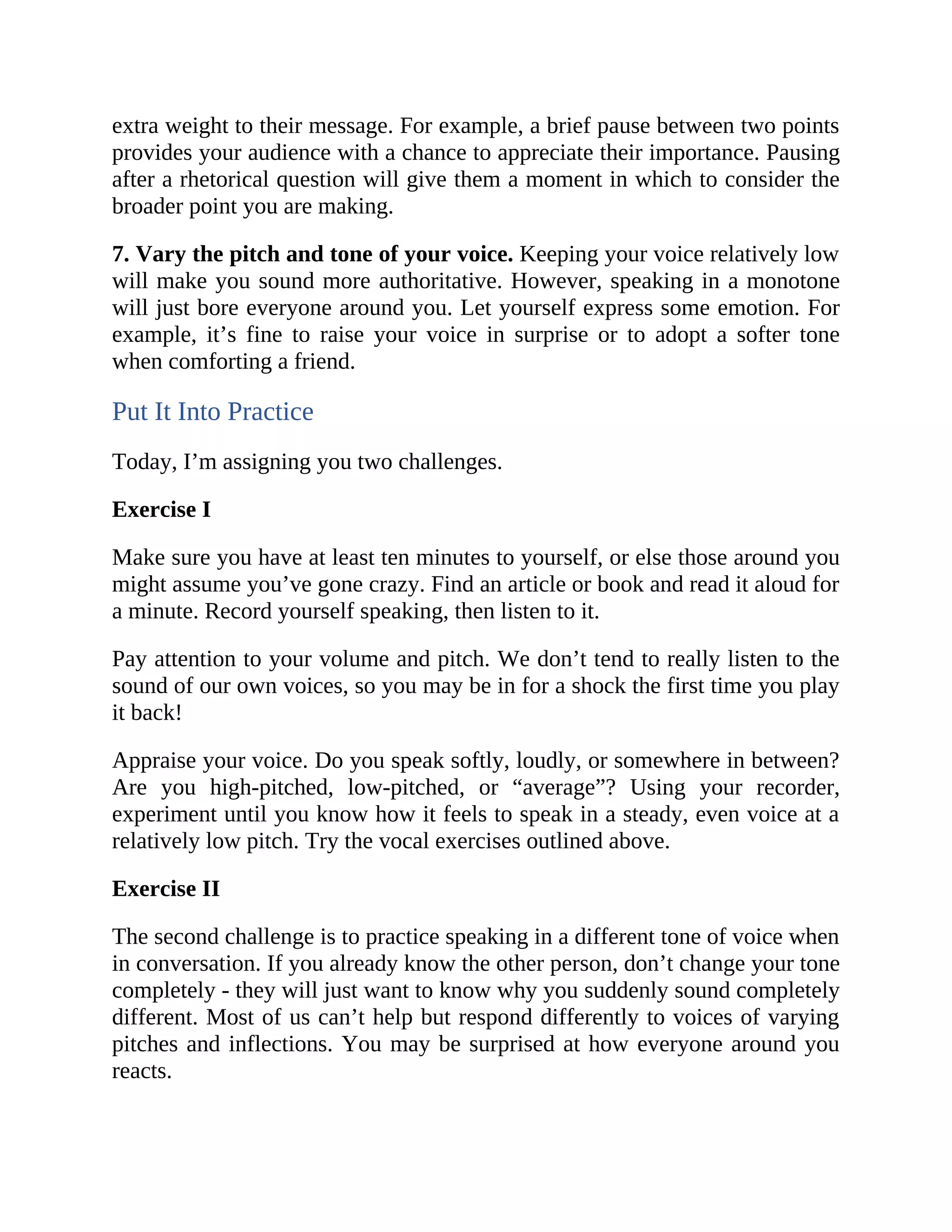
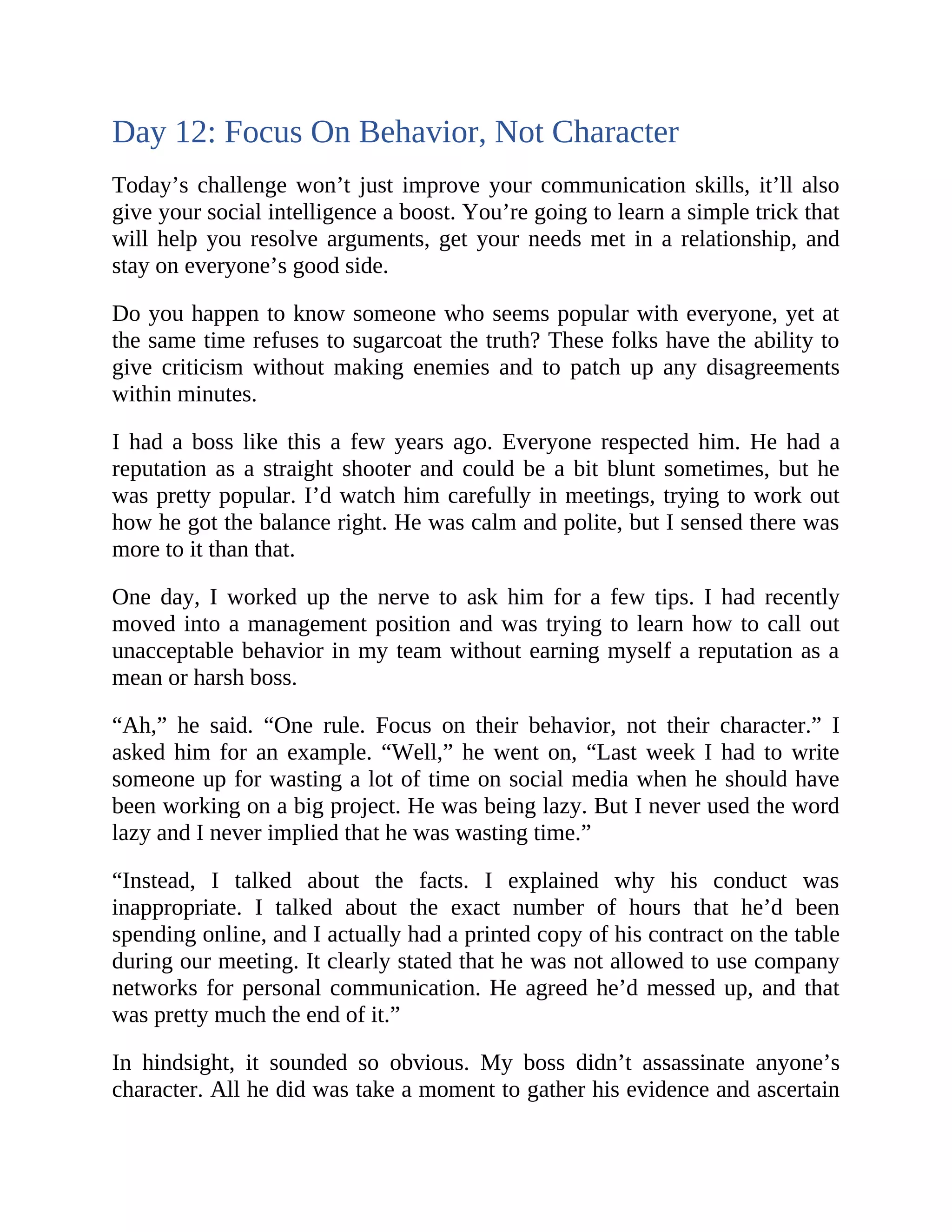
![the facts. He focused on what someone had actually done rather than their
personality or attitude in general. He spelled out the consequences someone
would face if they didn’t change their behavior, but he never took the
opportunity to rip someone apart.
This doesn’t just work in professional settings. Use it whenever you need to
call someone out on their behavior. It’s an awesome technique because it
stops people from getting defensive.[28]
If you start analyzing their personality and passing harsh judgements on their
character, you will find yourself drawn into an argument about what they are
“really” like. This is a total waste of time and will harm the relationship.
Let’s take a look at two examples that show the value in emphasizing actions
and consequences instead of personality and threats.
Example 1: Your teenage son’s room is a mess. You want him to clean it
up.
Don’t say: “Your room is a total mess. I can’t believe how lazy you are.
You’d better get it straightened up right now, or you’ll be in trouble!”
Instead, you could say: “Your room is messy and needs a cleaning. This is
my home, and you must respect that. I expect you to have cleaned it by the
weekend, or you will not be allowed to use the car on Friday night.”
Example 2: You are a manager. A member of your team has been late
three mornings over the past two weeks, and you want them to start
turning up for work on time.
Don’t say: “You obviously don’t care about your job, and you are letting the
team down. Start getting here on time!”
Instead, you could say: “You have been late three times over the past
fourteen days. As you know, it is important for the sake of the team’s
performance that everyone is here on time. If you are late again, you will
receive a written warning.”
By the way, this doesn’t have to be a conversation about a serious, life-](https://image.slidesharecdn.com/21daysofeffectivecommunicationeverydayexercisestoimproveyourcommunicationskill-211015142455/75/21-days-of-effective-communication-everyday-exercises-to-improve-your-communication-skill-52-2048.jpg)
![altering event. For example, let’s suppose that a friend asks you out for
dinner but then asks you to pay for everything.
They promise that they will pay you back once payday comes around, but
then they don’t make contact. This leaves you feeling hurt and
underappreciated. You might be thinking, “So-and-so is really selfish! They
always take people for granted!”
However, using the approach outlined in this chapter, you’d talk only about
their actions. Telling them that you think they are a selfish leech might be
satisfying for a few seconds, but is it going to help your friendship?
Nope! Stick to the facts. If you have to make a request (in this case, for your
money), keep calm. Focus on what you want, why you need it, and the time
frame in which you expect it to happen.
Finally, there’s another advantage to this technique. When you talk about
someone’s behavior as opposed to their character, you are signaling that it’s
what they do, rather than who they are, that matters.
This can encourage them to try harder in the future, especially, if you also
take care to compliment them on everything they have done right.[29]
Whether
they admit it or not, most people thrive on praise. Positive acknowledgement
always goes down well.
Put It Into Practice
Today, you are going to have a conversation with someone who has recently
hurt or inconvenienced you. This serves two purposes. First, it will help clear
the air and get your relationship back on track.
Second, it will give you the opportunity to practice talking about a problem in
terms of someone’s actions. You are not going to make character judgments,
create drama, or drag up the past just for the sake of hurting them.](https://image.slidesharecdn.com/21daysofeffectivecommunicationeverydayexercisestoimproveyourcommunicationskill-211015142455/75/21-days-of-effective-communication-everyday-exercises-to-improve-your-communication-skill-53-2048.jpg)
![Day 13: Uncover Your Communication Background
You have control over your communication style. If I didn’t believe that we
all have the potential to become better communicators, I wouldn’t have
bothered writing this book!
However, there’s no getting around the fact that the way you were raised has
affected the way you talk to others and how you conduct yourself in
relationships. It’s human nature.
We are wired to imitate our parents, (or whoever was in charge of our well-
being), because they were our first role models. Sigmund Freud held a lot of
weird ideas, but he was right when he said that our early years play a key role
in shaping our adult personalities.[30]
I believe that self-knowledge – plus action, of course – is a solid foundation
for change. It can help you work your way around blocks or personal
resistance. For example, you might realize that it makes sense to expand your
vocabulary or talk in a more confident manner, because doing so improves
your relationships and social standing. However, you may feel as though
something is holding you back.
In these cases, it’s a good idea to dig a little deeper and think about your
underlying beliefs about who you are and how you “should” communicate
affect you. For instance, if your parents taught you that others will see you as
arrogant or “overbearing” when you are confident, it shouldn’t come as a
surprise when you feel a resistance to change.
The Story Of Jenny
Let me tell you about a client of mine. Jenny was in her mid-thirties, a
successful lawyer who had been told by her work mentor that she was well
on the way to being made a partner at her firm.
The problem? Her mentor advised her that her promotion was unlikely to
happen until she learned to become “more assertive” with the firm’s biggest
clients. Jenny had read books on assertiveness and even attended a seminar,
but she still lacked the kind of confidence that would take her career to the](https://image.slidesharecdn.com/21daysofeffectivecommunicationeverydayexercisestoimproveyourcommunicationskill-211015142455/75/21-days-of-effective-communication-everyday-exercises-to-improve-your-communication-skill-54-2048.jpg)
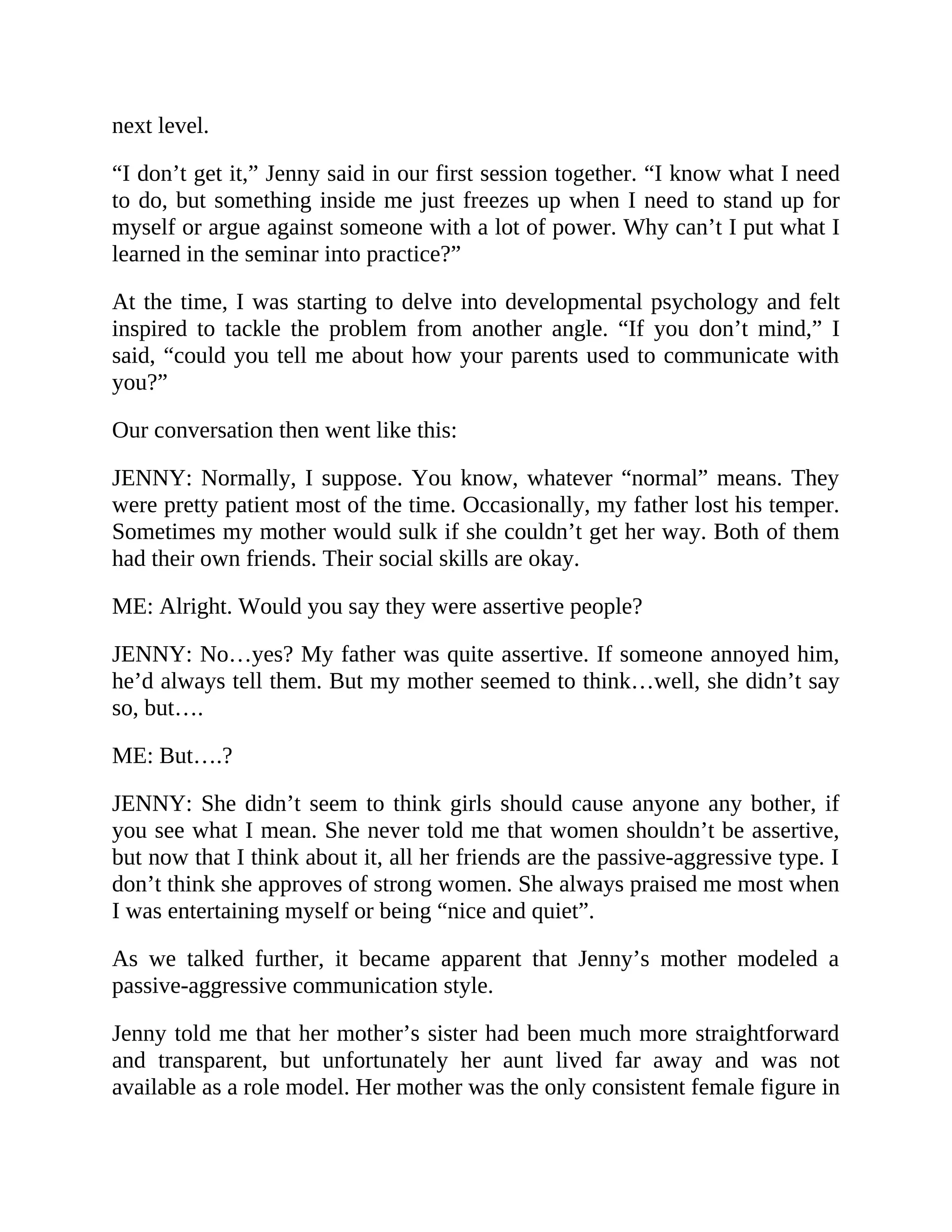
![her life, so she was the one who taught Jenny how to communicate with
others.
If Jenny’s father had been her primary caregiver, she would probably have
learned to use a more assertive communication style. Social Learning Theory
predicts that we adopt the behaviors and attitudes of the adults we spend the
most time with.[31]
In this case, Jenny’s mother was her main caregiver, so it was always more
likely that Jenny would imitate her.
No wonder Jenny felt awkward when she tried to be assertive – it went
against her early “training.” The good news is that Jenny realized that she
didn’t have to be a replica of her mother. Once she figured out why she felt
so uncomfortable when speaking up for herself, the answer motivated her to
forge her own communication style.
I encouraged her to watch a couple of more assertive female lawyers in her
firm and use them as new behavioral models. A few months after we started
working together, Jenny got her promotion.
A few questions to ask yourself
Imagine that you and I are sitting in a coaching session right now. This is a
list of the questions I’d ask you. Take your time when thinking about your
answers; they can help you understand the lessons you’ve carried into your
adult relationships.
1. Did my parents have solid social skills? It’s simple – if your parents
knew how to create healthy relationships with others and sustain a good
conversation, you probably picked up these skills. If not, you probably find
social situations a bit confusing. This can cause you to doubt yourself and to
feel shy around new people.
2. Did my parents have friends? While it’s natural to prefer a larger or
smaller social circle, it isn’t normal to be completely friendless. If your
parents never showed interest in other people, you may be confused by the
rules of normal social interaction and might not know how to respond when
other people show an interest in you.](https://image.slidesharecdn.com/21daysofeffectivecommunicationeverydayexercisestoimproveyourcommunicationskill-211015142455/75/21-days-of-effective-communication-everyday-exercises-to-improve-your-communication-skill-56-2048.jpg)
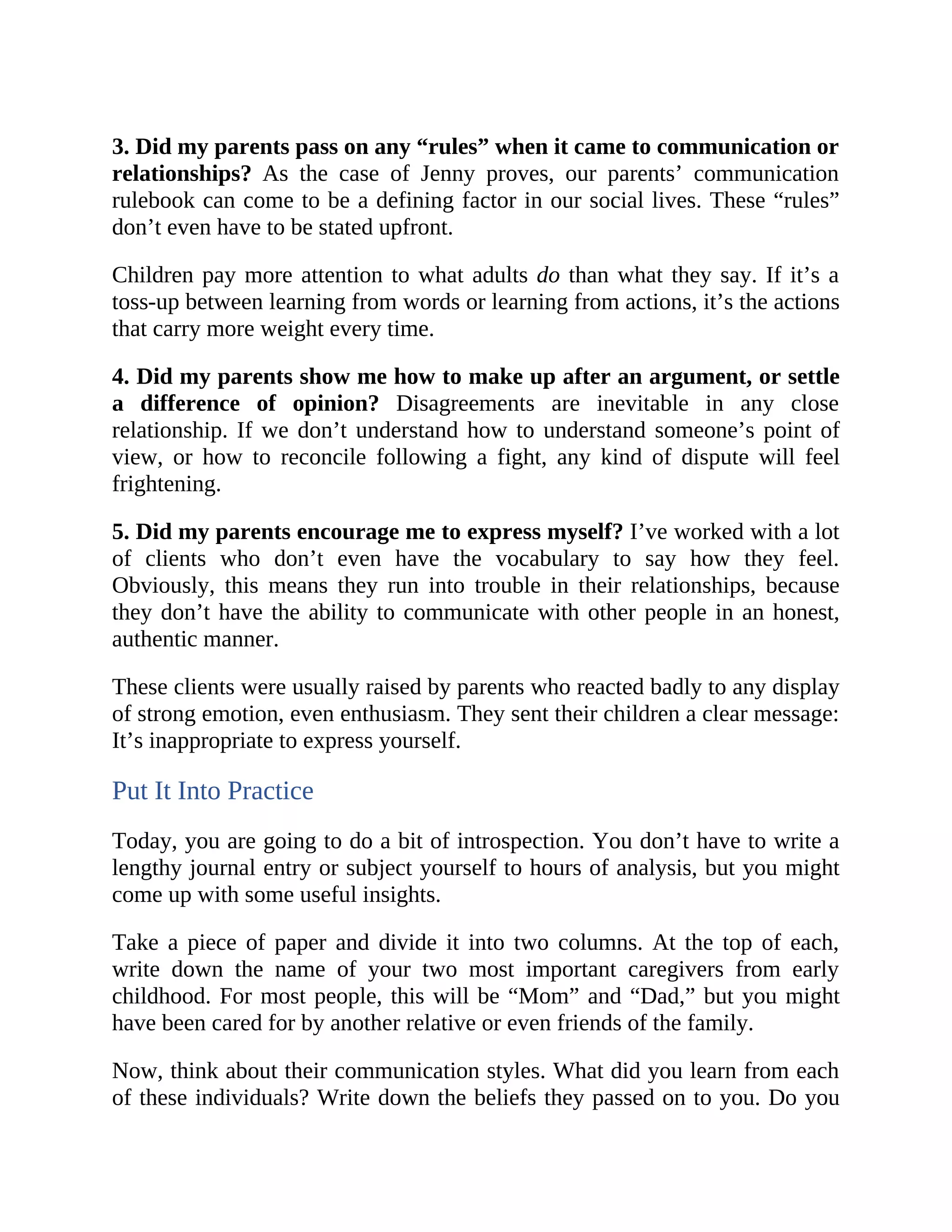

![Day 14: Understand How Different Generations
Communicate
You’ve probably heard the old cliché, “Men are from Mars, women are from
Venus.” There are thousands of books and articles out there about sex
differences and why men and women often misunderstand each other.
But what about age differences? We don’t tend to talk about the challenges
that come with communicating with people from other generations. In this
chapter, you’ll learn more about these differences, and how you can adjust
your approach depending on your audience.
I’m going to focus on communication in the workplace, but this information
is also useful when it comes to understanding generational differences in
general.
Before we go any further, I want to make it clear that everyone has their own
personality and preferred communication style. It’s not a good idea to assume
that just because someone was born in a particular era that they will behave in
a certain way.
On the other hand, there are plenty of academic researchers who believe that
our approach to work and relationships is partly influenced by when we were
born.
The Generations You’ll Meet At Work – And How To
Communicate With Them
1. Baby Boomers (Born between 1946-1964): These workers triggered a
revolution. When they entered the workplace, women and ethnic minorities
were gradually starting to take on roles that had usually been occupied by
white men. They have a proactive attitude, are competitive, and value their
work as much as their family life. [32]
They came of age during a time of social change, and they tend to distrust
authority. This isn’t to say that they cannot work well with managers; just
that they question power and believe that those in management positions](https://image.slidesharecdn.com/21daysofeffectivecommunicationeverydayexercisestoimproveyourcommunicationskill-211015142455/75/21-days-of-effective-communication-everyday-exercises-to-improve-your-communication-skill-59-2048.jpg)
![should have to work for their status. They don’t have time for aloof, arrogant
bosses. They prefer to work for people who try to understand everyone’s
point of view before deciding, rather than pull rank.
Some are skeptical of modern working practices such as remote working and
flexible hours. In this respect, they are quite traditional.
Many are workaholics who believe that workplace competition is healthy and
that loyalty to a company should be rewarded. They like teamwork and tend
to believe that meetings are a productive use of their time.[33]
Communication tips: A typical Boomer will appreciate a detailed
explanation of how their contribution is making a difference to the
company’s bottom line. They appreciate regular recognition, particularly if
they devoted many years of their life to an organization. For this reason, they
place more value on titles than their younger coworkers.
They came of age in an era where face-to-face communication was highly
valued. If you have something of importance to say to a Boomer, schedule an
in-person meeting. Most are perfectly capable of using e-mail and other
modern technologies, but they were raised to value face-to-face
conversations.
Boomers are not usually enthused by the idea of regular performance reviews
or ongoing feedback. As far as they are concerned, they can do their jobs and
appreciate the space in which to get their tasks done.
It may be necessary to explain to a Boomer that even the most competent of
people can benefit from ongoing feedback, and that regular reviews do not
imply that their managers believe them to be incompetent.
2. Generation X (Born between 1965-1980): More entrepreneurial than
their Baby Boomer predecessors, Gen Xers grew up in relatively insecure
financial circumstances with fewer economic opportunities. Compared with
Boomers, they are more likely to prioritize a work-life balance, and to value
independence.
They are not especially concerned with remaining loyal to an employer.[34]
On
the whole, they are more skeptical about life and the workplace in general](https://image.slidesharecdn.com/21daysofeffectivecommunicationeverydayexercisestoimproveyourcommunicationskill-211015142455/75/21-days-of-effective-communication-everyday-exercises-to-improve-your-communication-skill-60-2048.jpg)
![than their parents and lack the optimism and appetite for change that
characterized the Boomer generation. They are more comfortable using
modern technology.
When it comes to authority, Generation Xers respect leaders who use a
confrontational management style. Compared to Boomers, they are more
comfortable asking and answering difficult questions in the workplace.
Being more willing to switch jobs and careers rather than remaining loyal to
one employer for decades, they are not so concerned with keeping the peace
at work. They place more emphasis on personal freedom, and many aspire to
work for themselves.
Communication tips: Gen Xers like regular feedback and appreciate prompt
comments and constructive criticism. They want to discover their own
strengths and weaknesses and enjoy planning out their careers.
They believe that successful people are lifelong learners. They are creative,
often embrace change, and appreciate the opportunity to air their opinions.
They do not place so much value on face-to-face communication as the
previous generation, but their favored style could best be described as
“direct”. When talking to a Gen Xer, it’s best to get straight to the point.
They do not have as much tolerance for meetings as the Boomer generation.
3. Generation Y (Born between 1981-1997): Also known as “Millennials,”
this generation was the first to grow up with reliable access to computers and
the internet. Compared with previous generations, they are happier to
multitask, to get involved with multiple projects, and to take a flexible
approach to work if the situation demands it.
For instance, the average Gen Yer will be glad to be seconded to another
department or asked to apply their skills to a new area. They see work as a
route to personal fulfilment and think that it’s acceptable to change jobs and
careers often to pursue their happiness.[35]
Members of this group are accustomed to digital rather than in person
communication. They like frequent feedback, and they favor leaders who
invite them to give their opinions at each stage of a project. A Gen Yer may](https://image.slidesharecdn.com/21daysofeffectivecommunicationeverydayexercisestoimproveyourcommunicationskill-211015142455/75/21-days-of-effective-communication-everyday-exercises-to-improve-your-communication-skill-61-2048.jpg)
![well be ambitious, but they believe that a good work-life balance is
important.
Communication tips: This group assumes that e-mails, instant messages,
and even social media are perfectly appropriate mediums for workplace
communication.
For a Gen Yer, writing an e-mail instead of making a phone call is not a sign
of disrespect – it’s just the norm for their generation. This group also likes to
have answers quickly. If you keep them waiting, they are liable to become
annoyed.
Always play it straight with a Gen Yer. If you can’t give them feedback
immediately, give them a realistic time frame and then stick to it. They are
not entitled by nature – they have just grown up in a world full of information
that is available day and night.
They are fully capable of recognizing authority and complying with
workplace rules, but they will want to know how decisions are made and
why.
4. Generation Z (Born from 1998 onwards):[36]
These people have grown
up in a period of increased social justice ideas and movements, and they tend
to place more value on inclusive communication. For example, they care
passionately about transgender rights, overcoming sexism in the workplace,
and other social justice issues such as racism and income inequality.[37]
They have come of age in a digital culture, and are comfortable with the idea
of working remotely, working online, and working for a diverse range of
clients and companies. They are unlikely to work for the same boss over a
long period of time.
Gen Zers are aware of the privacy and security risks that come with
technology. They love social media and cannot fathom life without
smartphones, but they know that everything you post online lives forever.
Thanks to increased globalization and easy access to information, they are
more aware of their career options than previous generations. They value
independence, innovation, and creativity. They grew up during a time of](https://image.slidesharecdn.com/21daysofeffectivecommunicationeverydayexercisestoimproveyourcommunicationskill-211015142455/75/21-days-of-effective-communication-everyday-exercises-to-improve-your-communication-skill-62-2048.jpg)
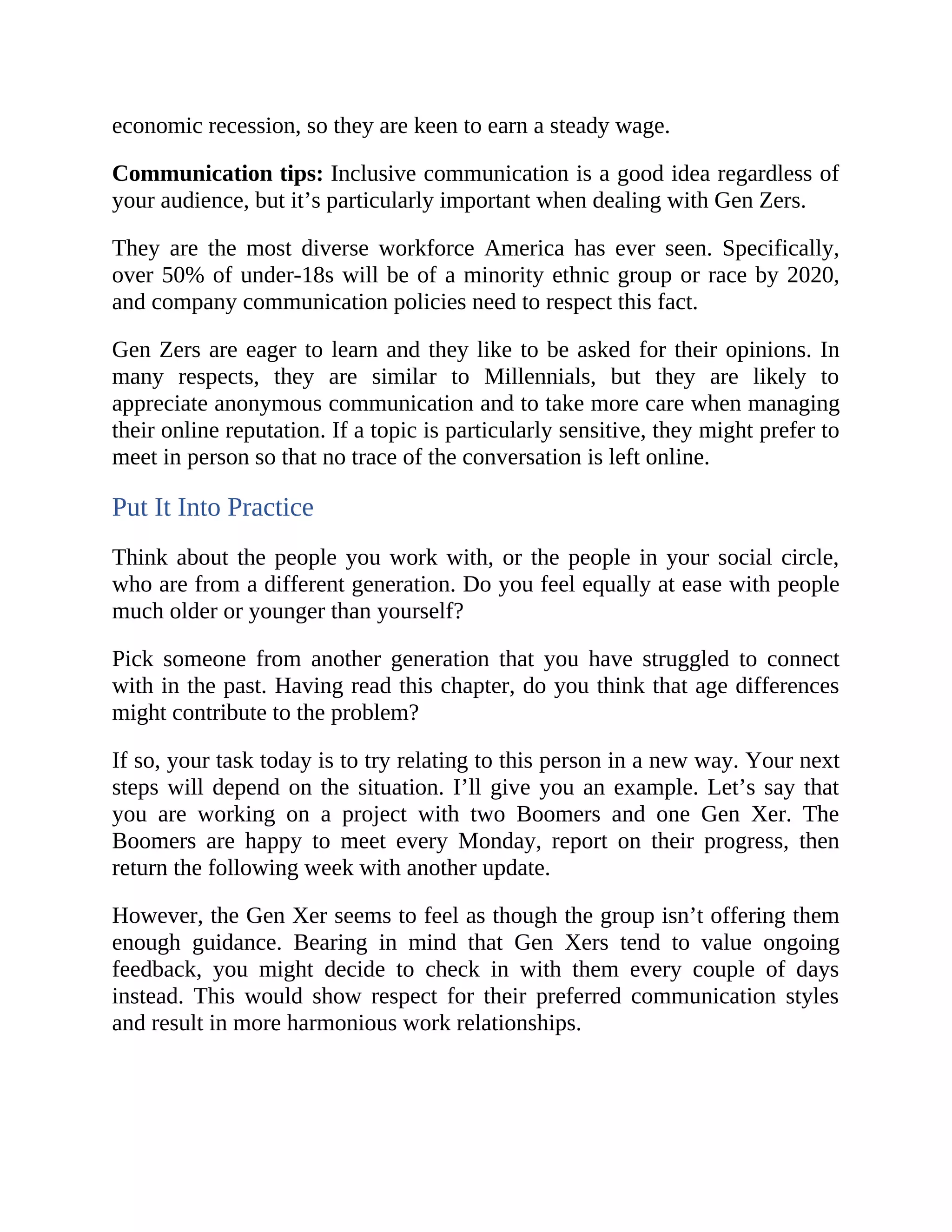
![Day 15: Master The Art Of Communicating Via E-mail
Almost everyone uses e-mail and social media nowadays, both for
professional and personal purposes. It’s easy, free, and allows lots of room
for creative expression.
However, you need to be careful. Text-based messages can be misinterpreted,
sometimes with devastating consequences. If you are sending e-mails on
behalf of a company, you could end up in a lot of trouble if they cause any
offense.
Here’s a shocking statistic: We misjudge the tone and meaning of the e-mails
we receive up to 50% of the time. Worse, most of us believe that we can
accurately figure out a sender’s underlying message.[38]
In this section, you’ll
learn how to get the tone right every time.
Here are the basic rules of writing effective e-mails that will get your
message across:
1. If the other person is in a senior position, mirror their tone: If your
boss opens and closes with a few formal words, you should do the same. If
they start signing off with a simple “Yours,” or “Regards,” feel free to follow
their lead. Otherwise, assume that you should use formal business language.
2. Make it easy for the recipient to clarify any points raised: If you are
contacting someone about a complex issue, or you need to share a lot of
information, provide them with some other means of getting back to you.
This is especially important if you are working on a time-sensitive document
or project. If any new developments come to light, how can they contact you?
Make sure they have your phone number as well as your e-mail address.
3. Don’t fire off requests, and don’t launch into a lengthy series of bullet
points: Keep e-mails efficient and concise, but don’t be too cold. For
instance, don’t send one or two-line e-mails that contain a stark request or
statement like “I need this task to be done today” or “You will need to
rearrange your schedule to fit this in.”[39]](https://image.slidesharecdn.com/21daysofeffectivecommunicationeverydayexercisestoimproveyourcommunicationskill-211015142455/75/21-days-of-effective-communication-everyday-exercises-to-improve-your-communication-skill-64-2048.jpg)
![If you were talking to someone face-to-face, your tone of voice and body
language can stand in for niceties like “Please” and “Thanks.” Unfortunately,
when you only have words on a screen, you need to (literally) spell them out.
Stark, request-based e-mails make the recipient feel defensive, as though they
have been given an order by a demanding drill sergeant. Even if you are the
boss and your subordinate has an obligation to follow your requests, it will
benefit your relationship if you make the effort to sound friendly.
Punctuation also helps. Exclamation points denote yelling so be sure to use
them only when conveying extreme excitement or upset. There is a big
difference between “I’ll see you this Friday” and “I’ll see you this Friday!”
As well as an e-mail saying, “Your work on that important project could use
improvement!” and “Your work on that important project could use
improvement.” Which version would you rather receive from your superior?
4. Keep your subject line to a few words: If you can’t think of a concise
subject line, there’s a chance that you’ve tried to fit too much information
into one e-mail. Think about the true purpose of your message and rewrite it
if necessary.
The average businessperson gets over 100 e-mails every day.[40]
Make it easy
for them to pick out the key points of your message.
5. Imagine that they are reading the message over your shoulder: If you
aren’t sure whether you’ve made an inappropriate remark, reread the message
while imagining that they are in the room with you.
Only click “Send” if you’d be happy to say it to their face. It’s possible to
insult someone to their face with no witnesses present but e-mail lasts
forever.
6. Explain your attachments: If you need to attach a document, make sure
that you reference it in the body of your e-mail. Give your attachment a
relevant title that identifies it as a safe document that can be opened without
risk to the recipient.
7. Use a template: Some of us don’t like writing and others don’t have time
to craft a well-written message. Why not gather together a few templates and](https://image.slidesharecdn.com/21daysofeffectivecommunicationeverydayexercisestoimproveyourcommunicationskill-211015142455/75/21-days-of-effective-communication-everyday-exercises-to-improve-your-communication-skill-65-2048.jpg)
![keep them at hand? There are plenty of free resources online.
For example, ThriveHive (thrivehive.com) offers 13 templates for small
businesses[41]
and The Muse (themuse.com) has compiled 27 pre-written
templates that can be used in a range of business situations.[42]
Why waste
time working on the structure of a message when other people have already
done the heavy lifting?
You can also compile your own templates. If you have written an especially
fine e-mail, why not strip out the personal content and use the structure again
in the future?
You can also use e-mails that other people have sent you for this purpose.
However, be sure to remove all identifying information!
8. Begin or end the message with a humorous disclaimer:[43]
If you are
feeling especially pressured, tired, or angry when writing an e-mail and worry
that the recipient will pick up on your negativity, type a quick disclaimer like
“I’ve had a crazy week, but rest assured that I’m really looking forward to
working with you!” or “In case I seem a bit sluggish this morning, it’s
because I’ve only had one cup of coffee so far!”
9. Where possible, use “Thanks in advance” to close an e-mail: Given that
e-mail is a key business tool, you won’t be surprised to learn that researchers
have invested a lot of time into figuring out the words and phrases that get
results.
Boomerang, a company that specializes in helping people manage their e-
mail and improving their productivity, ran a study in which they looked at
over 350,000 e-mails. The phrase “Thanks in advance” yielded a response
rate of 65% according to their findings, outshining all other common sign-
offs.[44]
10. Keep it simple: Unless you know the other party well, you should write
using language that could be understood by a third-grader.
If you enjoy reading and writing, you might forget that most people don’t
actually do much of either outside of work. Using straightforward language](https://image.slidesharecdn.com/21daysofeffectivecommunicationeverydayexercisestoimproveyourcommunicationskill-211015142455/75/21-days-of-effective-communication-everyday-exercises-to-improve-your-communication-skill-66-2048.jpg)
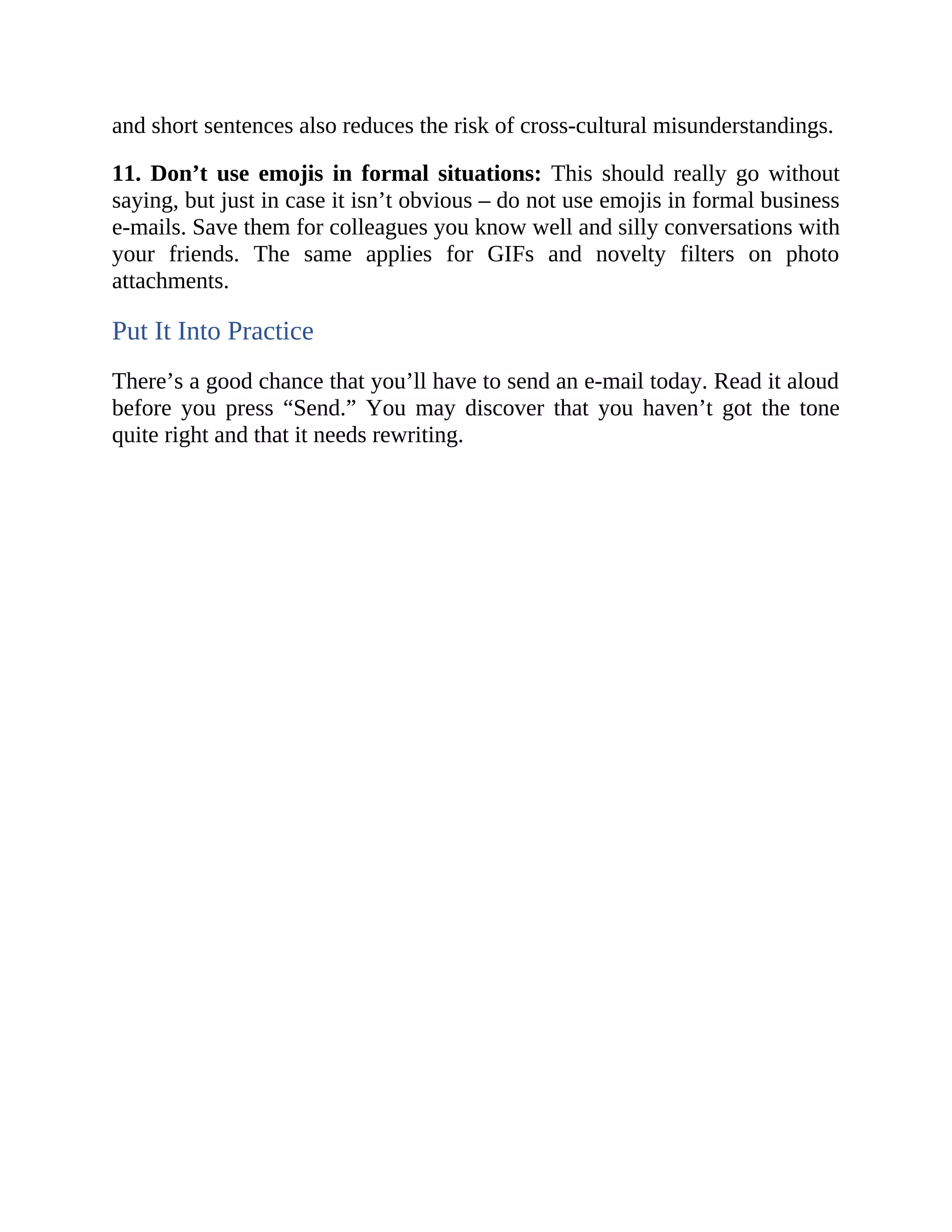
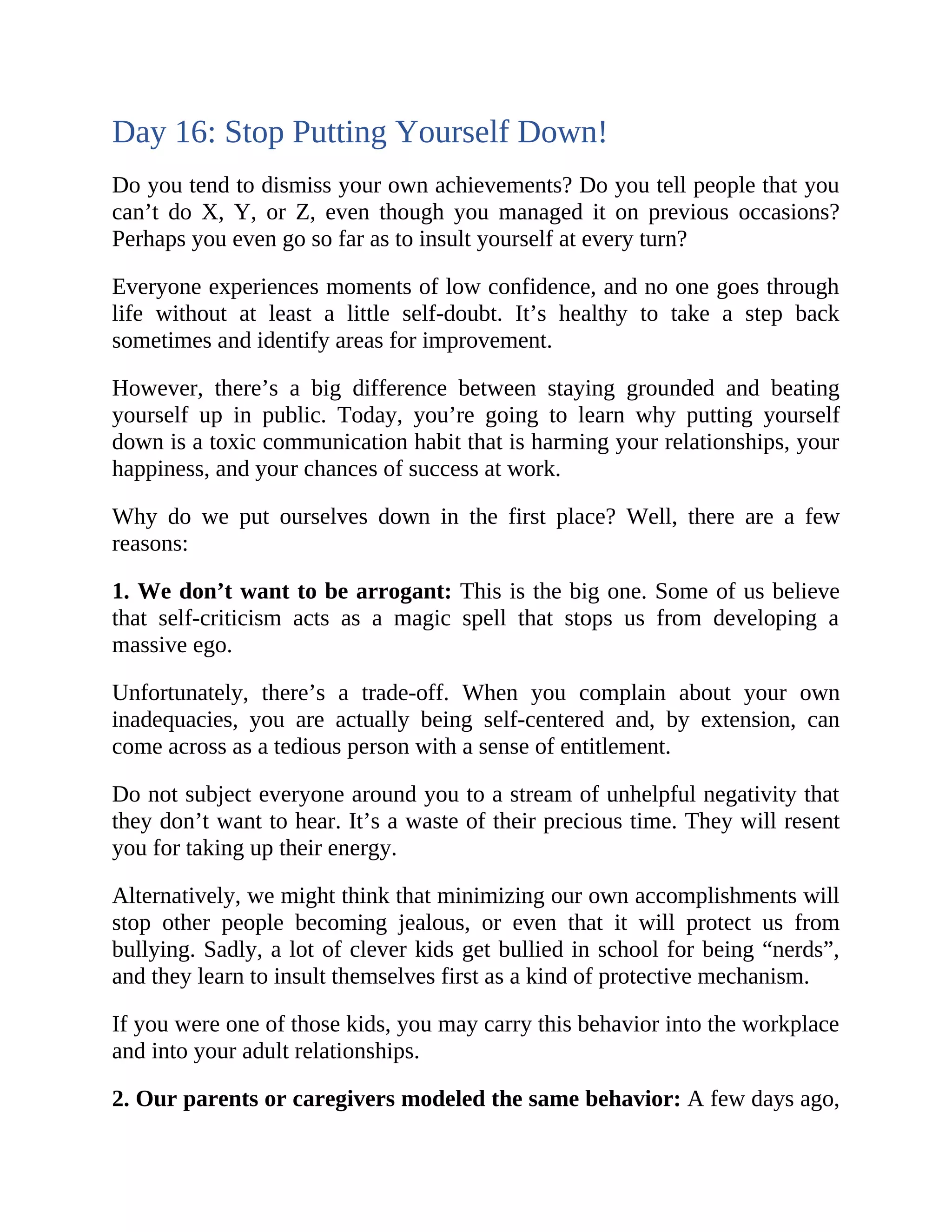
![I asked you to think about your personal communication history, and the
messages you received from the people who raised you.
Children pick up their parents’ habits. If they repeatedly undermined
themselves, there’s a good chance that you grew up thinking that this is a
natural, normal way to behave.
3. We are so scared of failure that we’d rather preempt it by telling
others how incompetent we are: If we tell everyone how unskilled and
incompetent we are, they won’t be surprised when we fail.
We don’t have to deal with their disappointment, and we won’t be expected
to explain what went wrong. After all, they should have known that we
wouldn’t get very far.
At least, that’s the logic we use. In a twisted kind of way, it makes sense. The
problem is that this kind of talk can become a self-fulfilling prophecy. When
someone tells us that we can’t do something, we start to believe it. Ironically,
by telling everyone that we are incompetent and that we are doomed to
failure, we actually hurt our chances![45]
4. We have low self-esteem or even clinical depression: If you are plagued
by negative thoughts about yourself, this could be a sign that you need
professional help to raise your self-esteem or overcome depression.
It’s worth making a doctor’s appointment if you can’t seem to find any
enjoyment in life, or if you spend a lot of time feeling worthless, hopeless, or
guilty.
Now, let’s think about the consequences of self-deprecation:
1. You make yourself feel even worse: When you repeat the same message
over and over again, even if you are alone, your brain starts believing it. A
negative cycle is set into motion. You might even start beating yourself up
for being so negative.
2. You miss out on valuable opportunities: Your closest friends will know
whether your self-assessments are accurate, but new acquaintances and
colleagues are forced to rely on how you present yourself when they form an](https://image.slidesharecdn.com/21daysofeffectivecommunicationeverydayexercisestoimproveyourcommunicationskill-211015142455/75/21-days-of-effective-communication-everyday-exercises-to-improve-your-communication-skill-69-2048.jpg)
![impression of you.
If you tell them how lousy you are, and how all your achievements were
matters of luck rather hard work and skill, they’ll assume that it’s true. They
don’t know your personal history, so what else are they supposed to think?
Needless to say, others will be hesitant to develop a relationship – especially
in professional settings – with someone who doesn’t have anything to offer.
Philosopher Mark D. White believes that a lot of us harbor a fantasy that
“people will see through the self-deprecation to the person underneath.” In
this fantasy, we don’t have to prove ourselves or be honest about our
strengths and weaknesses.
If we wait long enough, someone will magically realize that we are actually a
good, capable person. Writing in Psychology Today, White speculates that
part of the problem is the fairytale narrative we were sold in childhood. Think
of Cinderella – she got her happy ending when her prince looked beyond her
meager home life and humble nature.[46]
3. Other people will assume that you are judging them: When you hear
someone gossiping about an absent friend or acquaintance, do you ever
suspect that they will start speaking badly of you once your back is turned?
This principle applies even if the person you are badmouthing is yourself. A
steady stream of self-deprecating remarks sends a clear message – “I like
judging people. I judge myself, and I may well be judging you, too!” Others
will be slow to trust you.
How to conquer the self-deprecation habit
The good news is that you can make a conscious decision to stop putting
yourself down. In brief, you need to take two steps:
Step 1: Learn how to self-monitor and catch the comments before they
come out of your mouth: I won’t deny that this is difficult. If you’ve always
been quick to point out your so-called deficiencies, you will struggle with this
step.](https://image.slidesharecdn.com/21daysofeffectivecommunicationeverydayexercisestoimproveyourcommunicationskill-211015142455/75/21-days-of-effective-communication-everyday-exercises-to-improve-your-communication-skill-70-2048.jpg)
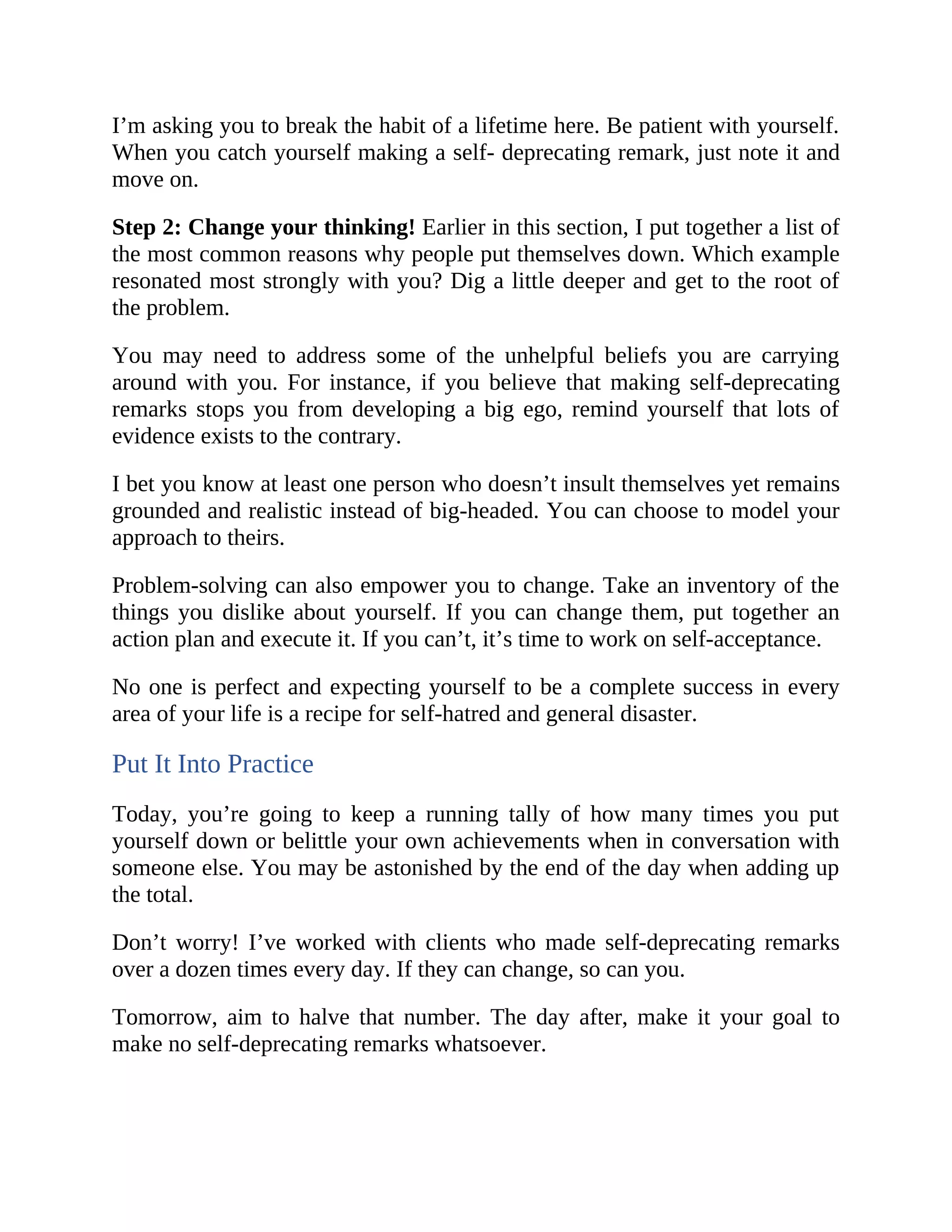
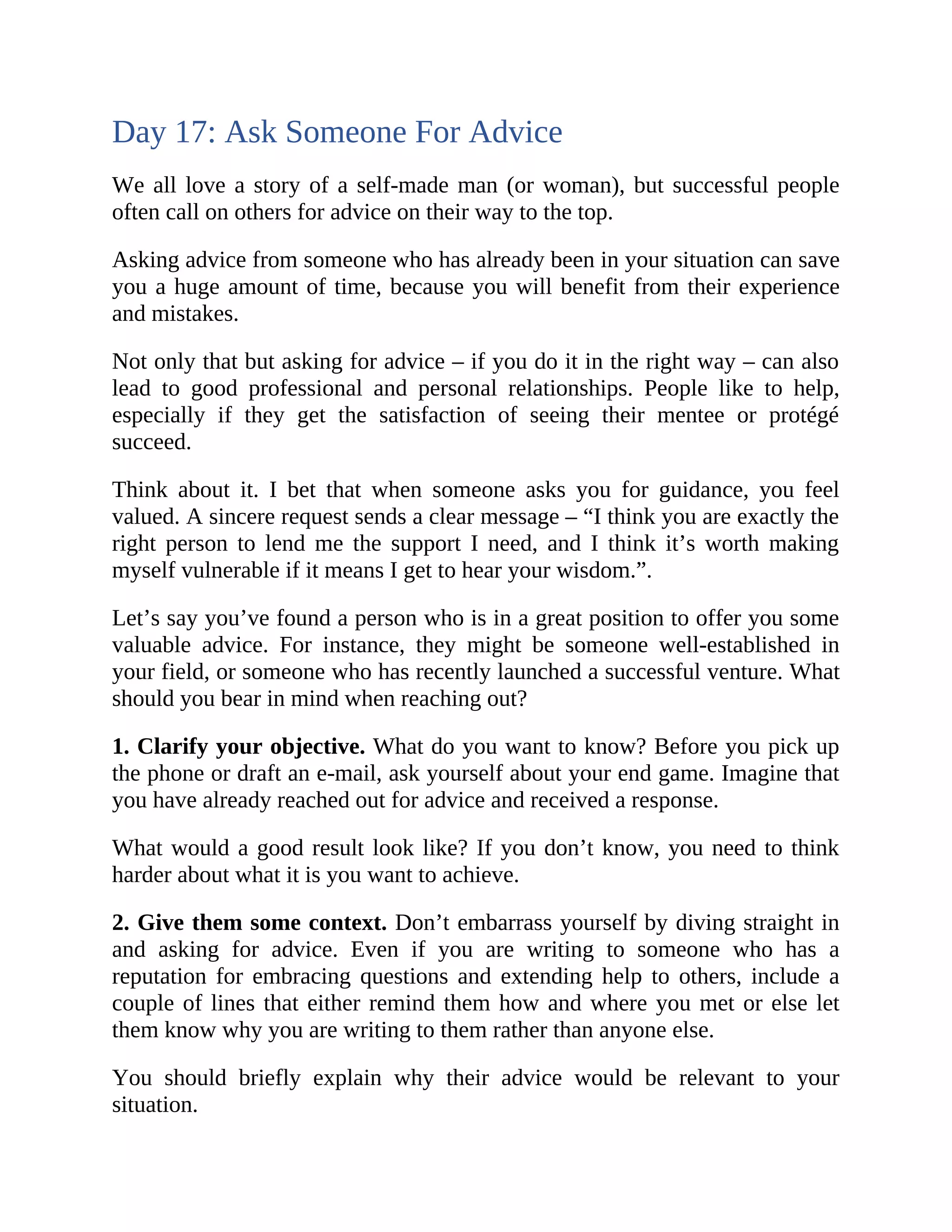
![Entrepreneur Nick Reese, who receives hundreds of e-mails every month
from business owners, states on his website that those who outline their
personal problem are more likely to get a helpful response because he can
tailor his answer to their question.
It sounds obvious, but apparently a lot of people don’t appreciate how
important it is to provide him with some background information.[47]
On the other hand, don’t overload someone with information. Respect their
time, and just tell them what they need to know.
3. Tell them what you want to achieve. It isn’t enough to spell out your
problem if you don’t then say what you actually want to happen. For
example, “I want to make a lot of money” is too general, whereas “My goal is
to make at least $10K from my website this year” is much better.
This entails making your goals clear, which means making yourself
vulnerable to criticism. There is a chance that you’ll be told something you
didn’t want to hear. For example, let’s say that you are looking to quit your
job and start your own online business as an affiliate marketer.
Specifically, you want to be working full-time on your business within a year
and generate at least $25K in the first 12 months. Your correspondent tells
you that your goal is unrealistic and that it’s more likely you will need to
work on your site for a couple of years before quitting your job.
They tell you that if you can outsource some of your tasks and increase your
advertising budget then you will make faster progress, but you don’t have the
resources in place. The feedback is disappointing, but at least you now have a
realistic view of the situation and can adjust your goals accordingly.
I know, I know – it’s awkward and painful to have someone tell you that your
goals are unrealistic. But isn’t it better to hear it straight now, rather than
learning your lesson the hard way? Put your pride to one side and give them
the full story.
4. Tell them what you’ve already done. In all likelihood, the person you are
writing to has earned their success through hard work and initiative. They
will have more respect for you if you tell them what you’ve already tried.](https://image.slidesharecdn.com/21daysofeffectivecommunicationeverydayexercisestoimproveyourcommunicationskill-211015142455/75/21-days-of-effective-communication-everyday-exercises-to-improve-your-communication-skill-73-2048.jpg)
![Be specific. “I’ve tried really hard and nothing’s worked!” isn’t informative.
However, “I’ve invested $5,000 in PCC marketing, revamped my website
two months ago, and used a 25-page e-book as a lead magnet but my mailing
list only has 2,000 subscribers” provides a useful overview and proves that
you aren’t looking for a magic bullet.
In addition, never make the mistake of asking someone for help with a
problem if you could just Google the answer.[48]
5. Give them a compliment. You can end with a brief acknowledgement of
how their work has already helped you. It doesn’t matter how well-
established someone is, they usually appreciate positive feedback.
Don’t overdo it. Something like, “By the way, I loved your recent article on
putting together a marketing budget!” will do the trick. A bit of flattery can
take you far but keep it sincere.
6. If you have mutual acquaintances, ask them for insight. Do you know
someone who has already asked this person for advice or, even better, knows
them personally?
If so, ask them whether there are any topics or questions you should avoid. If
they have succeeded in getting advice from this person, how did they phrase
their request? You could even ask to see any e-mails they sent, then use it as
a template for your own message.
7. Follow their lead when it comes to tone and message style. Take a look
at your target’s website or social media presence and use it to guide your
writing style.
If they tend to use formal sentences and technical jargon, then a businesslike
approach is best. If they are keen to portray themselves as a regular everyday
guy or gal, then you will enjoy a better result by keeping your
correspondence casual. If you aren’t sure what they’d prefer, then err on the
side of caution and use a conservative style.
8. If you are writing an e-mail, encourage them to follow up. If there is a
chance that you will run into this person, perhaps at a conference or social
occasion, tell them that you look forward to seeing them there. This makes it](https://image.slidesharecdn.com/21daysofeffectivecommunicationeverydayexercisestoimproveyourcommunicationskill-211015142455/75/21-days-of-effective-communication-everyday-exercises-to-improve-your-communication-skill-74-2048.jpg)
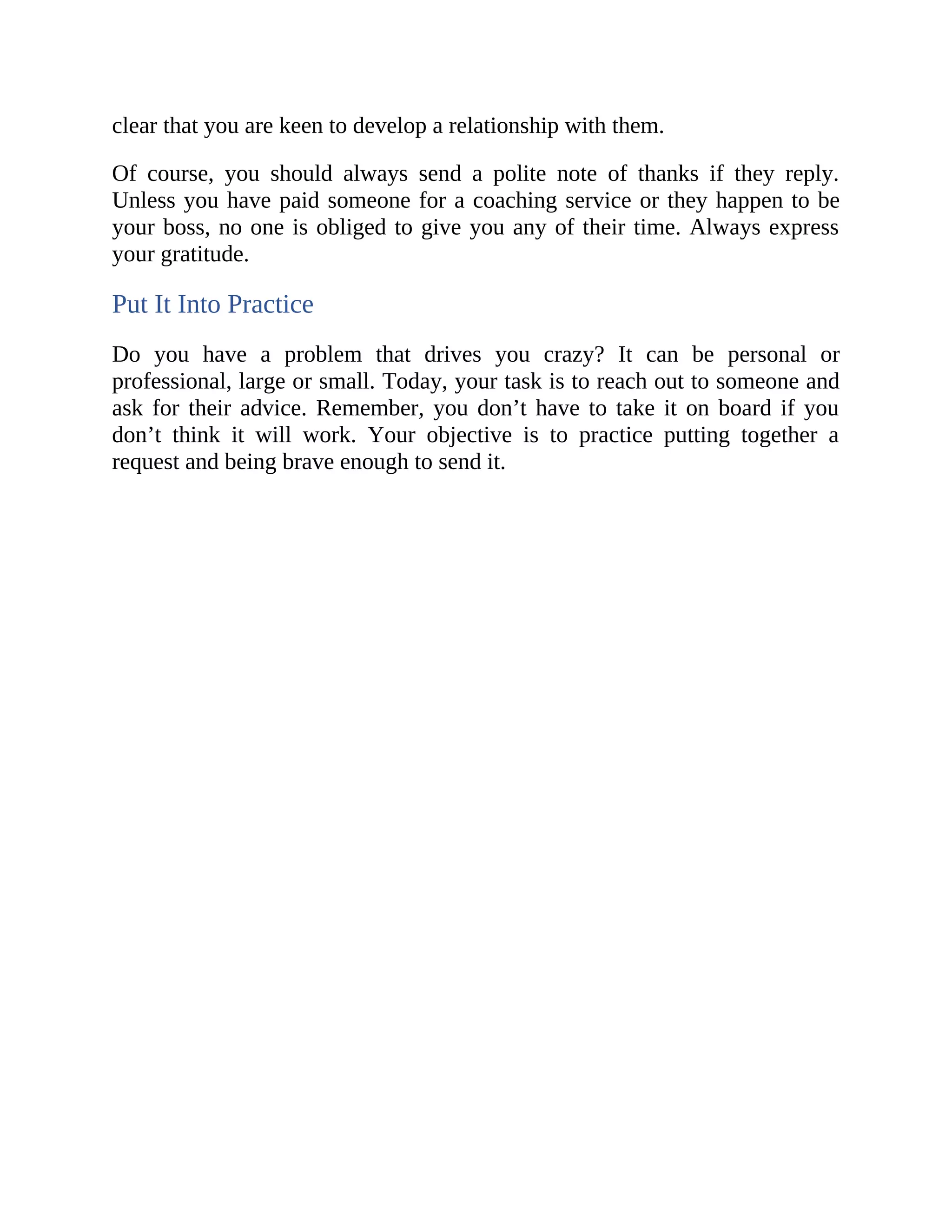
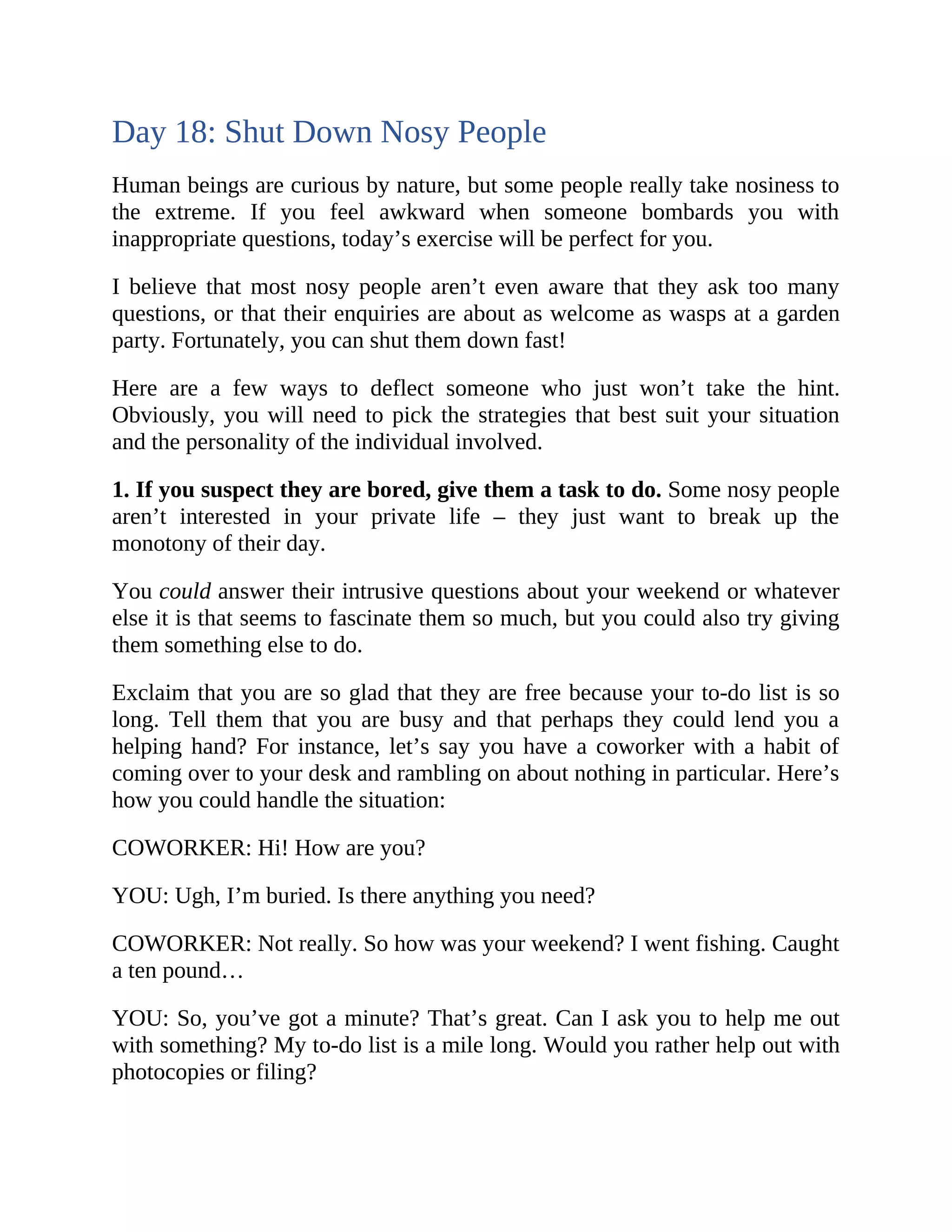
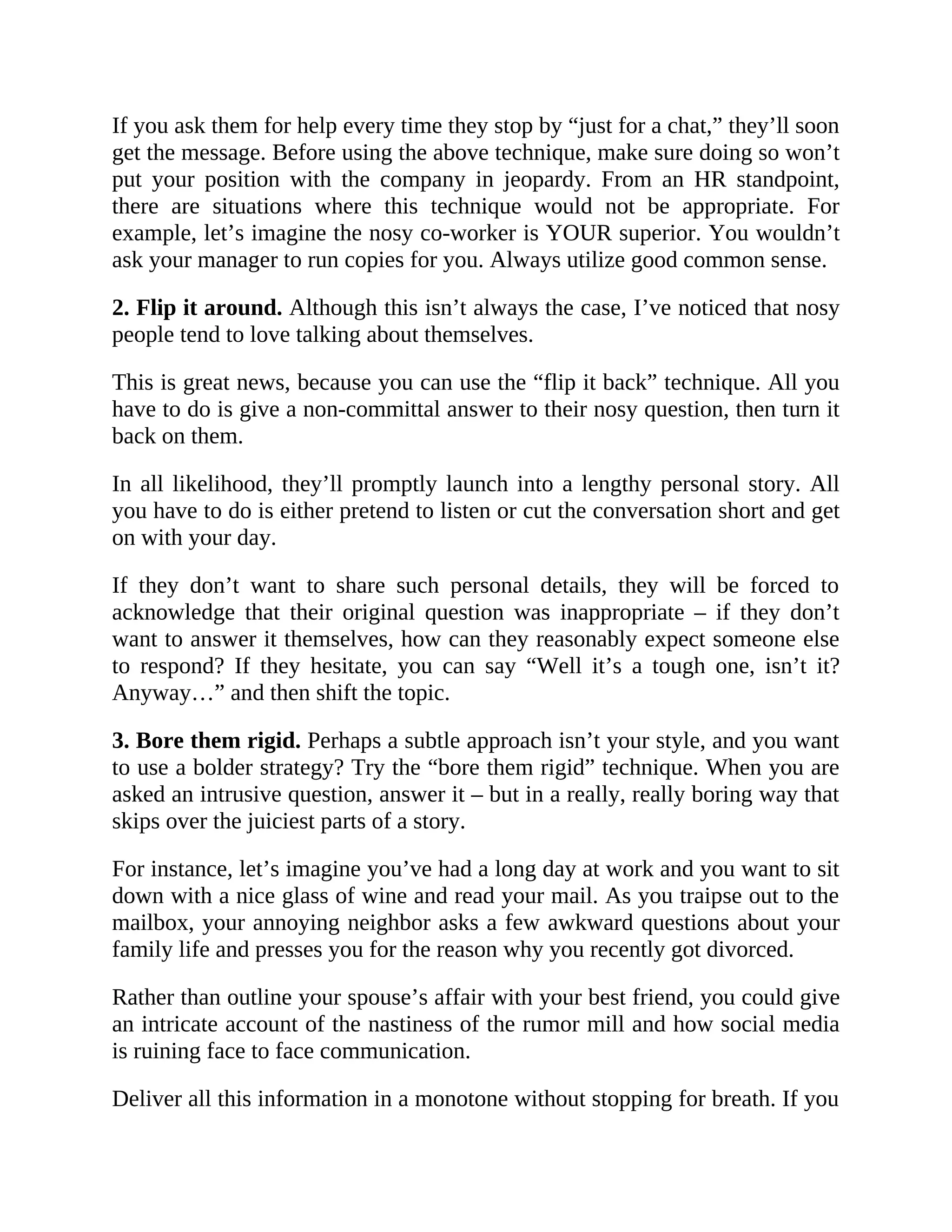
![pause, they will jump in and ask an inappropriate clarifying question. In
short, you need to be seriously boring.
You may have to use this technique on a couple of occasions, but your nosy
neighbor will quickly learn their inappropriate questions won’t get answered.
A variation on this strategy is the “broken record technique.” Give a brief
answer, then repeat it until they get the hint and back off. Reveal no hint of
frustration, but deliver the response in exactly the same way each time, using
the same tone of voice and facial expression.
4. Say, “Why do you ask?” This question can disarm nosy people. It makes
them pause, and the answer they give will reveal their real motive. They
might have a good reason for making their enquiry, in which case you can
answer the question.
On the other hand, they might scrabble around for a half-hearted response,
which should make it plain to you and anyone else listening that they have no
business sticking their nose in where it’s not wanted.
5. Don’t take it personally. Remember, nosy people are generally, well,
nosy. It’s unlikely that they are singling you out for special treatment.[49]
Watch their interactions with their other coworkers or friends.
If you have a good relationship with their others in the same situation, you
could even get together to swap strategies. You may gain fresh insight into
the nosy person’s psychology, and this will put you in a stronger position to
deal with their behavior in the future.
6. If you have a good rapport, use gentle teasing or quips. Just because
someone is nosy doesn’t mean that they don’t have a sense of humor. If
possible, use this to your advantage. A remark such as, “You’re far too nosy
for your own good sometimes!” delivered with a smile and gentle laugh can
be enough to draw a line under their question.
7. If a nosy person crosses the line into bullying, take it seriously.
Nosiness is usually annoying rather than harmful, but occasionally it takes a
more sinister turn. Anyone who uses invasive, inappropriate questions with
the intention of making you feel uncomfortable, insecure or threatened is](https://image.slidesharecdn.com/21daysofeffectivecommunicationeverydayexercisestoimproveyourcommunicationskill-211015142455/75/21-days-of-effective-communication-everyday-exercises-to-improve-your-communication-skill-78-2048.jpg)
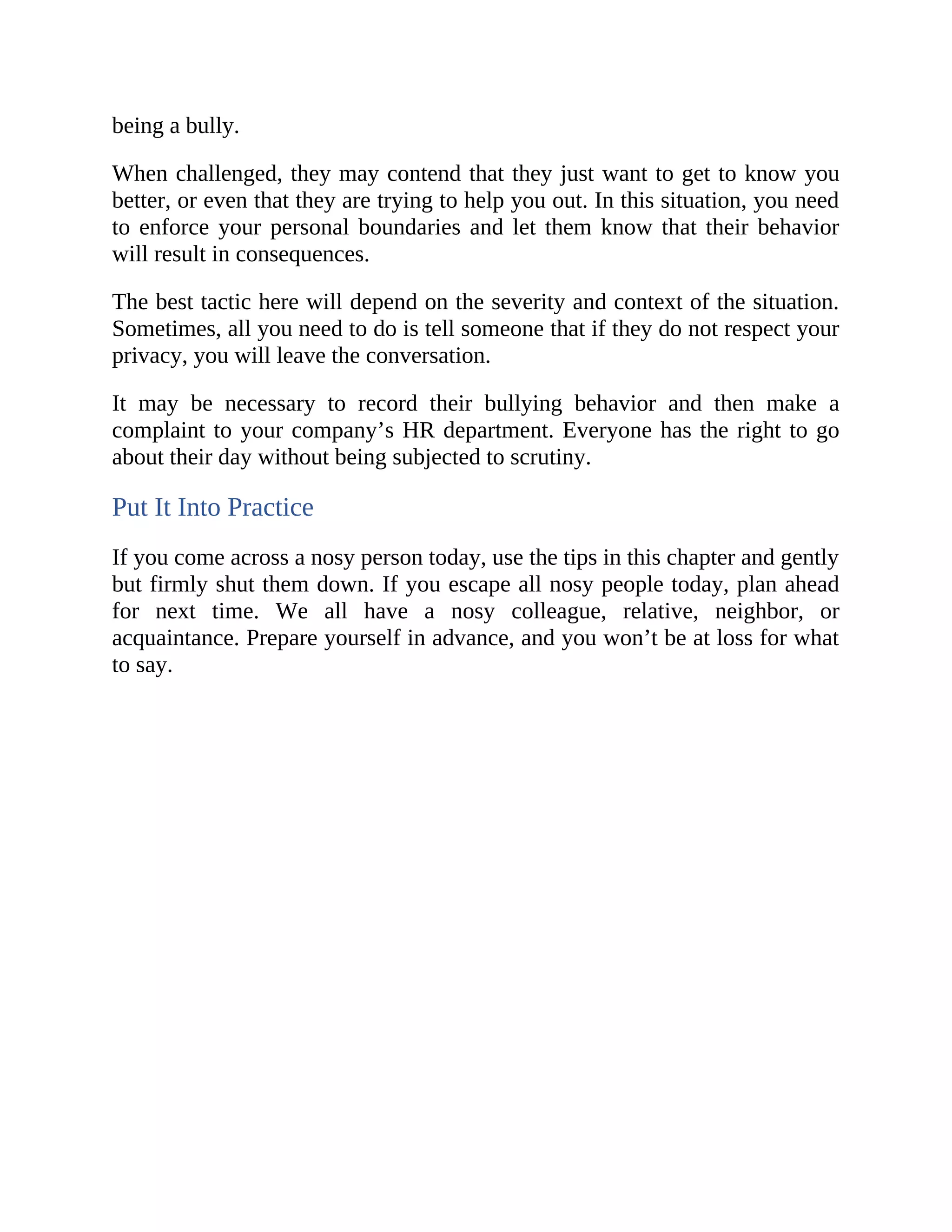
![Day 19: Put Together A Persuasive Message
Do you work in a job that requires you to inspire, motivate, and instruct other
people? Perhaps you just want to become more persuasive in general, or to
dazzle people with your ability to put together a compelling message?
Some of us are born with the gift of persuasion, but don’t worry if you
weren’t. We can all learn how to harness our inner motivational speaker.
Today, you are going to practice using a tool that will make your speeches
and everyday conversation more effective.
A few years ago, I came across a helpful technique that shows you how to do
precisely that. It’s called Monroe’s Motivated Sequence, and it has a long and
distinguished history. First developed by Alan H. Monroe at Purdue
University in the 1930s, it’s a template that will inspire any audience to take
action. Obviously, you will need to tailor it to your specific situation, but the
basic template will always be the same.[50]
I’ll outline the steps, and then I’ll provide a detailed example.
Step 1: Grab their attention Always open your argument with an emotive
story, a shocking statistic, or a fact that will be new to the audience. A
quotation or a rhetorical question will work too.
Step 2: Establish the need. Let your audience know why the current
situation is unacceptable. Emphasize that things need to change, and fast!
Spell out the consequences – what will happen if no one takes action? In
what ways does the problem affect your audience? You can throw in a couple
of statistics here if they are relevant and interesting.
Step 3: Tell them how you’ll satisfy the need. Now that you’ve identified
the problem, what’s the solution? What options are available to you? What
are the key principles underlying your approach? What, exactly, do you want
the audience to do? If you have considered several options before settling on
your preferred plan of action, explain how you arrived at the final decision.
This kind of transparency will inspire trust.](https://image.slidesharecdn.com/21daysofeffectivecommunicationeverydayexercisestoimproveyourcommunicationskill-211015142455/75/21-days-of-effective-communication-everyday-exercises-to-improve-your-communication-skill-80-2048.jpg)
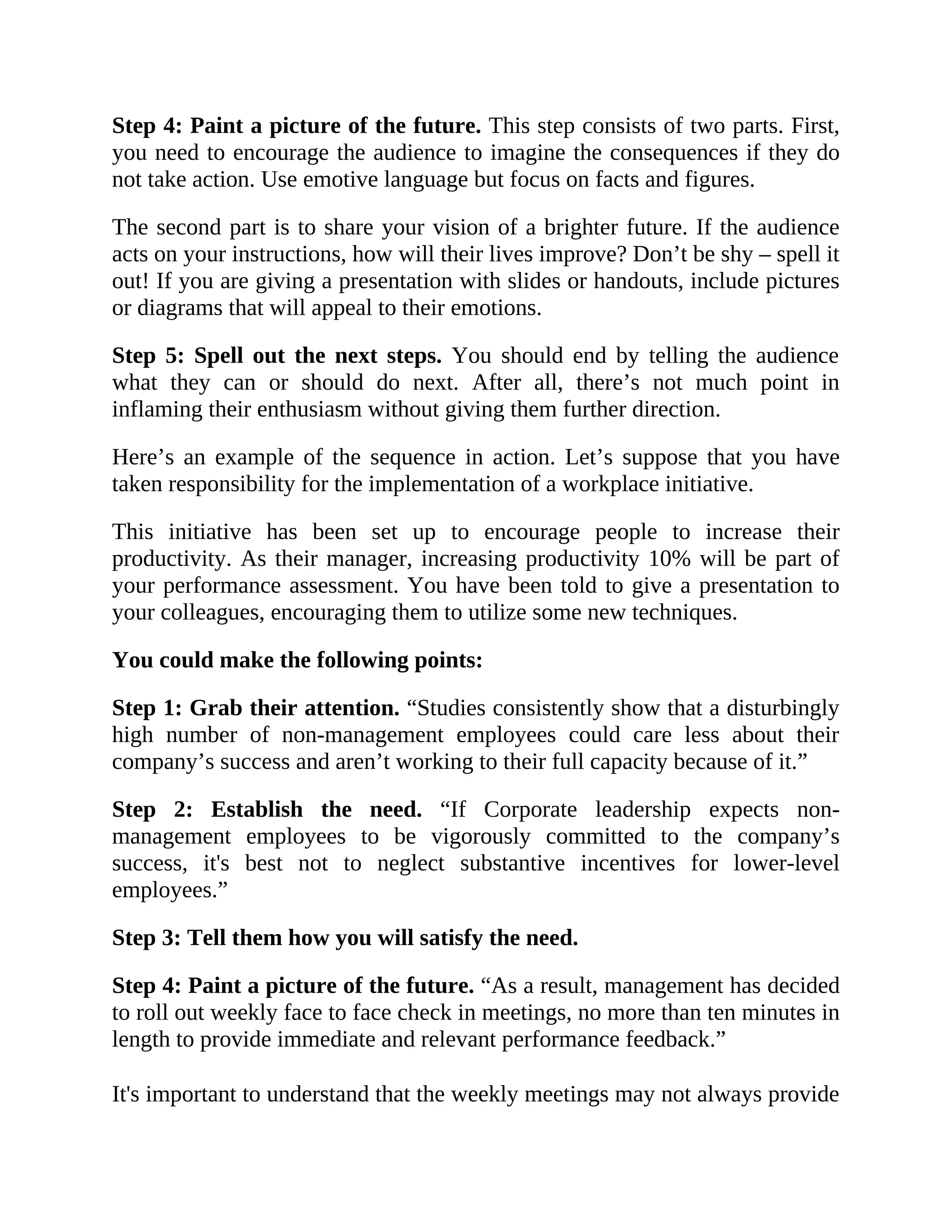
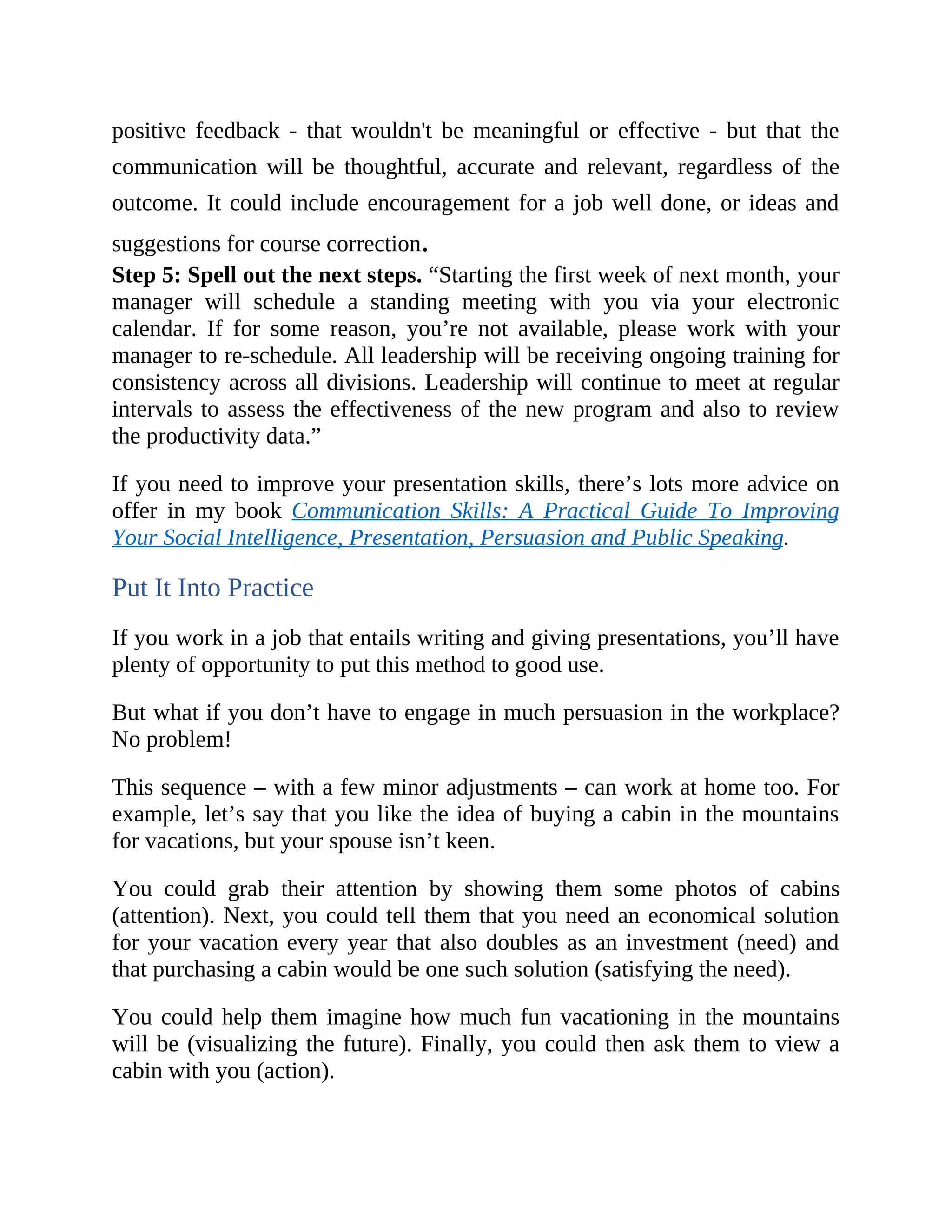
![Day 20: Improve Your Mediation Skills
Even the most non-confrontational people find themselves stuck in between
two individuals from time to time. So, what should you do when faced with
two warring colleagues, friends, or family members? In this section, you’ll
find a few useful tips that will help you defuse the situation while keeping
everyone’s dignity intact.
First, let’s get clear on what it means to be a mediator. Whether it’s a formal
position at work, or a role you adopt in your social circle, a mediator’s job is
to act as an unbiased third party who helps two or more people sort out a
conflict. The aim is to find an outcome that suits everyone – at least, as is
reasonably possible.
Mediation is helpful when two people have tried to resolve their own
problems but can’t seem to arrive at a constructive solution. Don’t confuse it
with negotiation, which is a process by which the parties sit down and try to
reach a solution together.
Here’s how to mediate:[51]
Step 1: Make sure that you’re a suitable candidate. Mediation should be
voluntary for all parties, and a mediator should be as unbiased as possible.
Furthermore, they should be capable of facilitating an exchange without
imposing their opinion.
Does this sound like you? Be honest! If you have a stake in the outcome, or
are biased towards one party, you shouldn’t be acting as a mediator. There’s
good reason why organizations often call on the services of an external
consultant when dealing with a dispute in the workplace – neutrality is key.
Step 2: Lay down the ground rules. A mediator is responsible for ensuring
that discussions are carried out in a civilized manner. This means that
everyone needs to follow an agreed set of guidelines.
As a general rule, the following are some good starting points:
-No one is allowed to speak over someone else;](https://image.slidesharecdn.com/21daysofeffectivecommunicationeverydayexercisestoimproveyourcommunicationskill-211015142455/75/21-days-of-effective-communication-everyday-exercises-to-improve-your-communication-skill-83-2048.jpg)
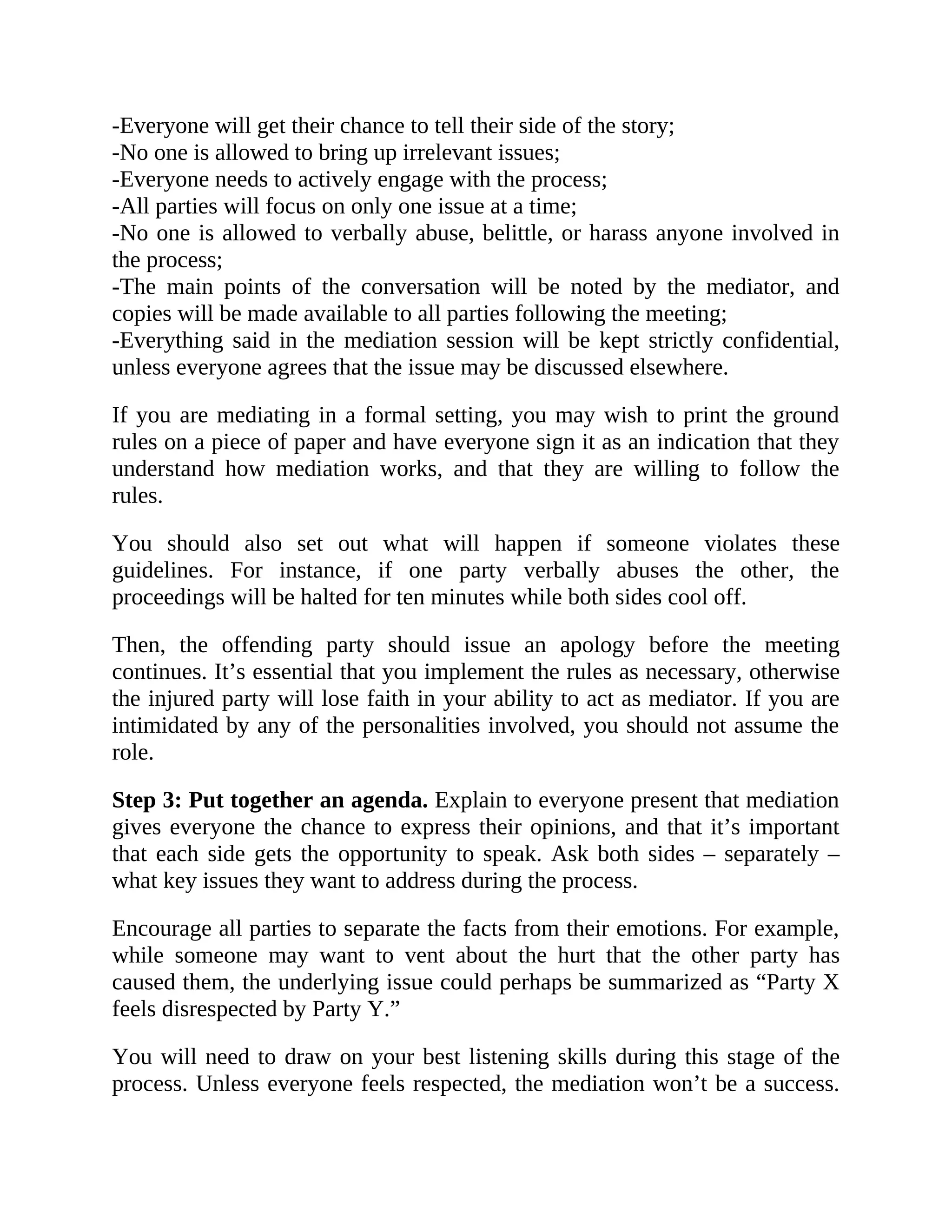
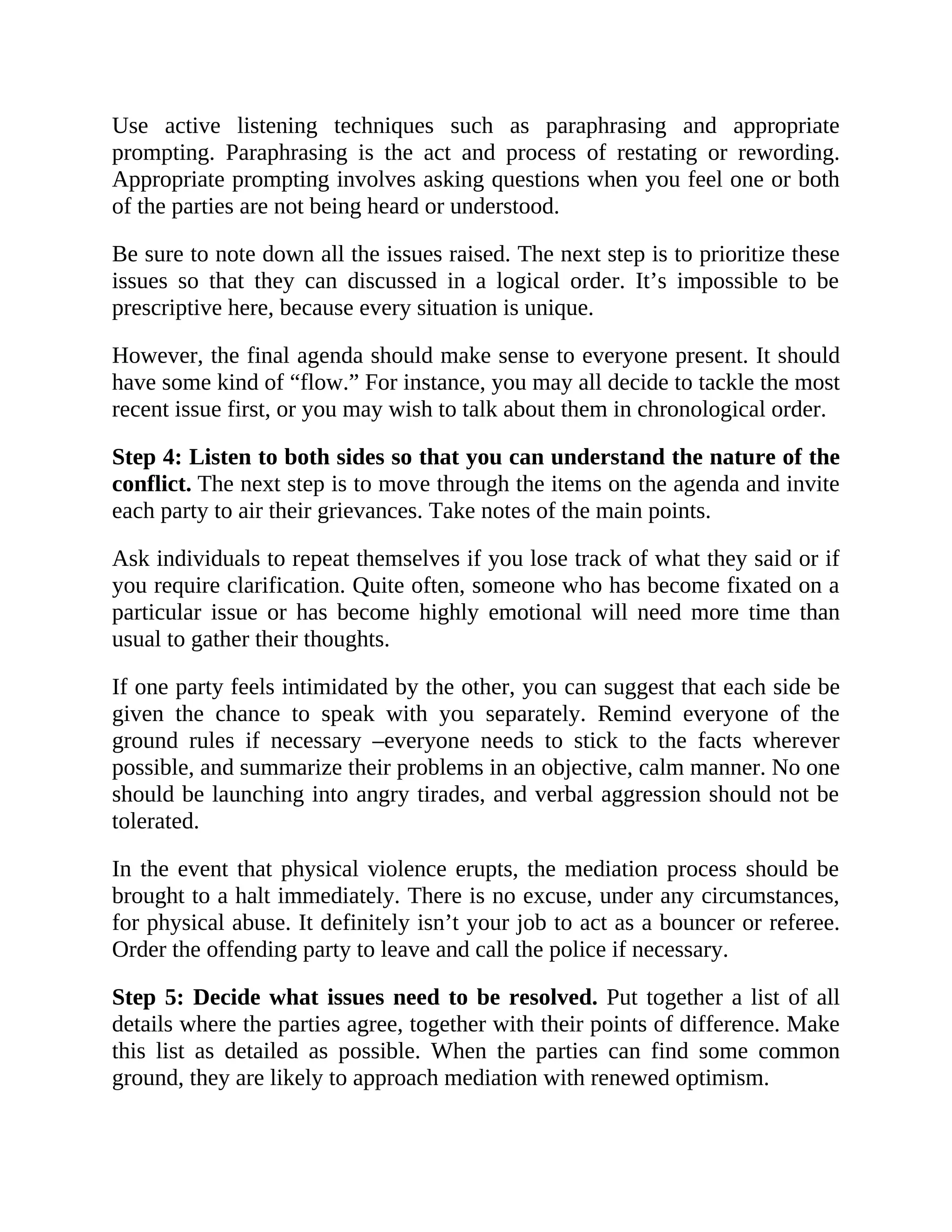
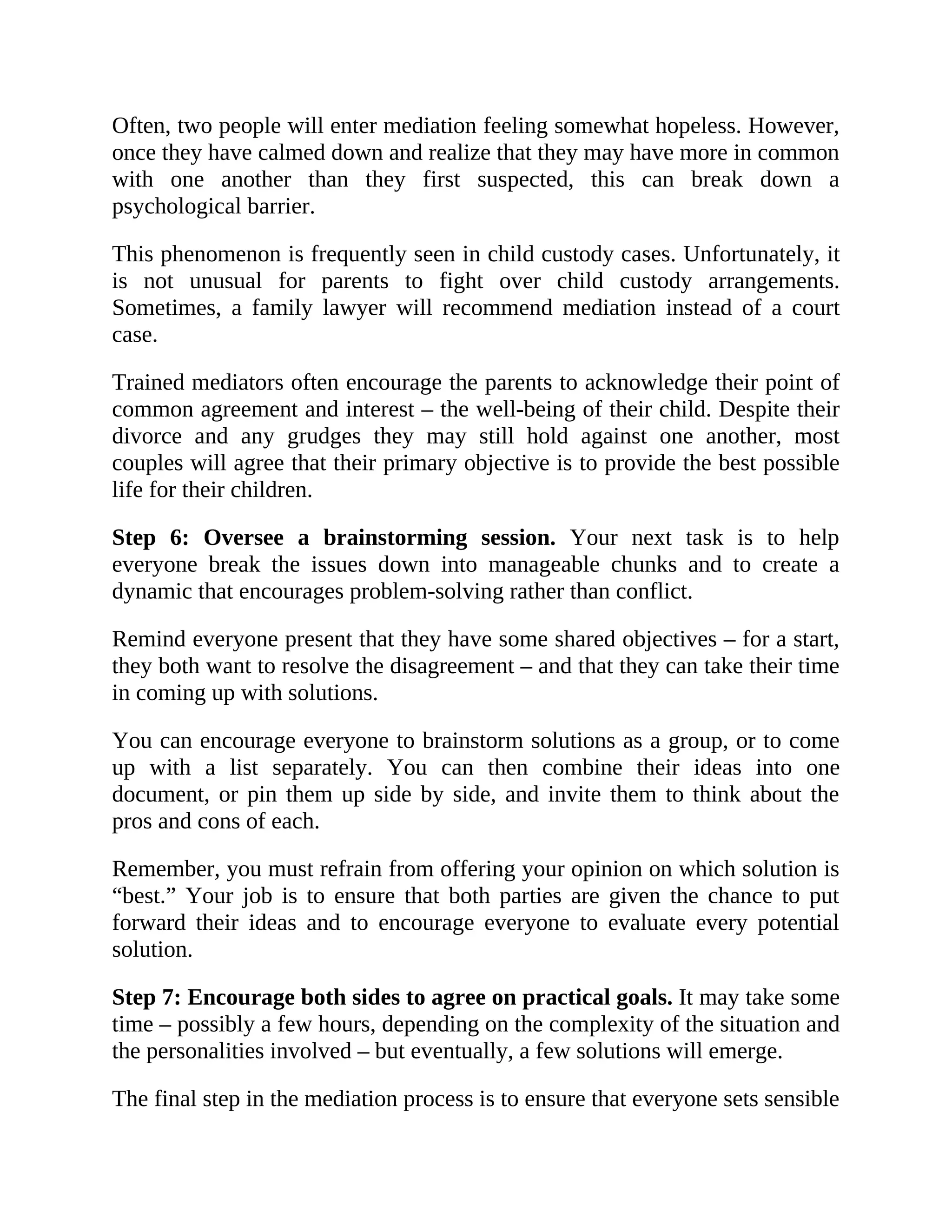
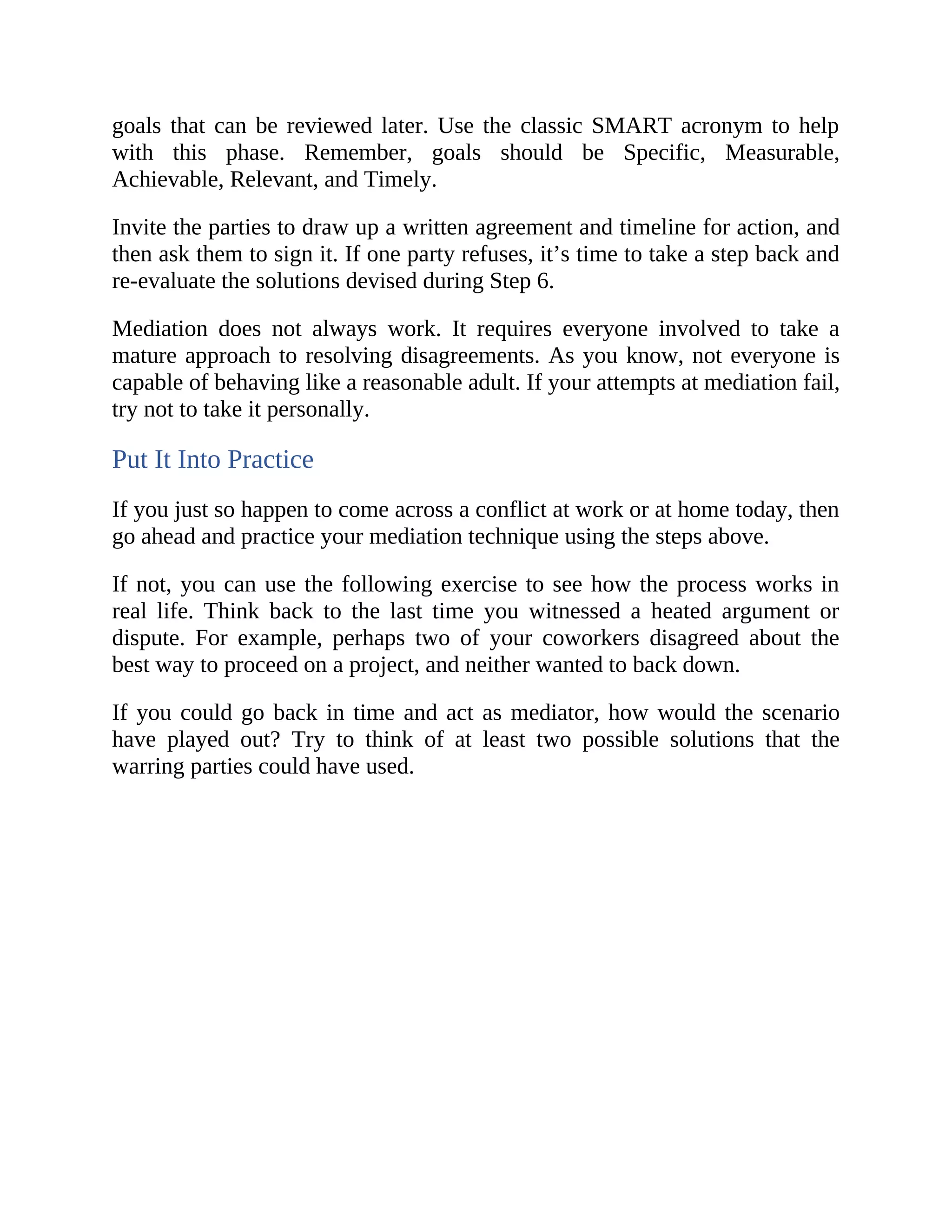
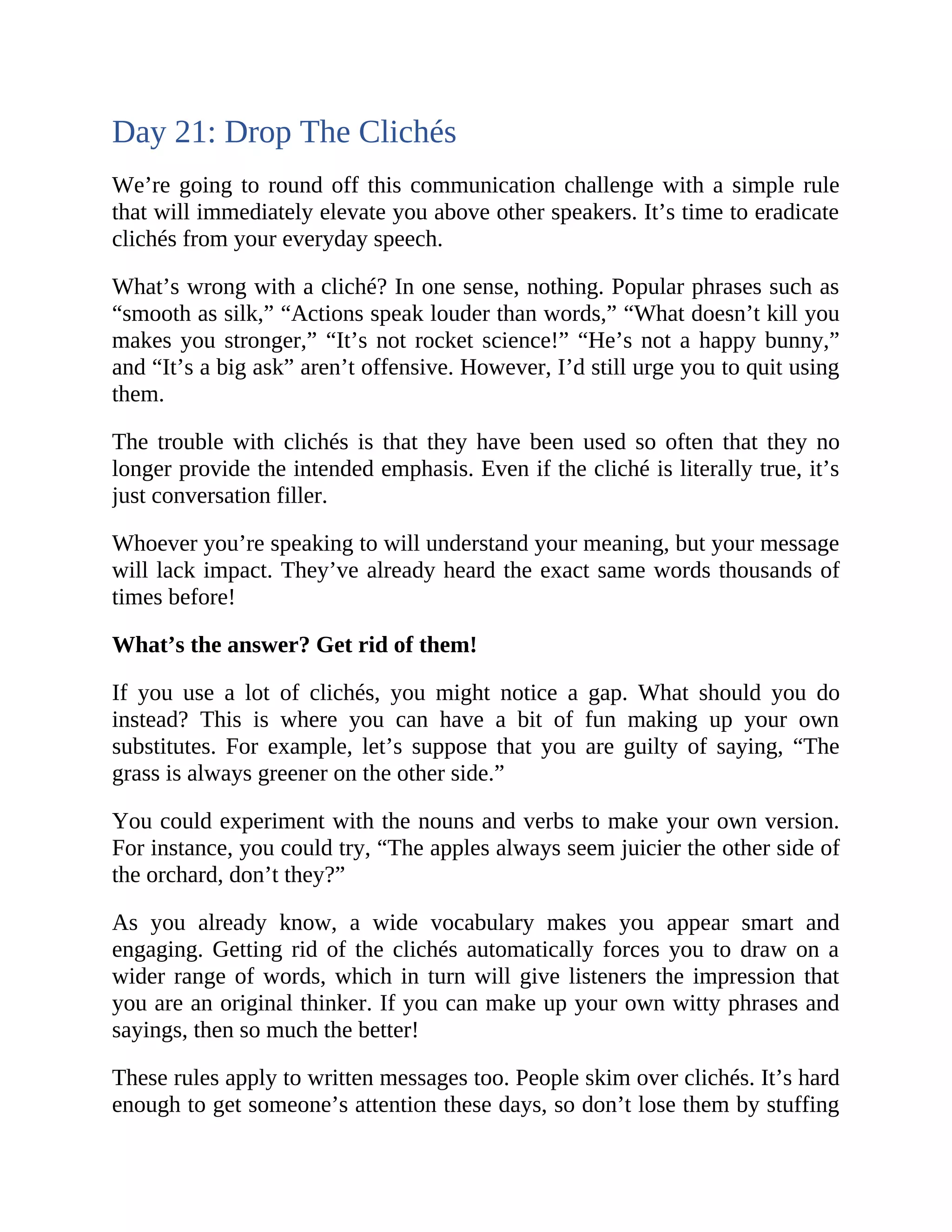
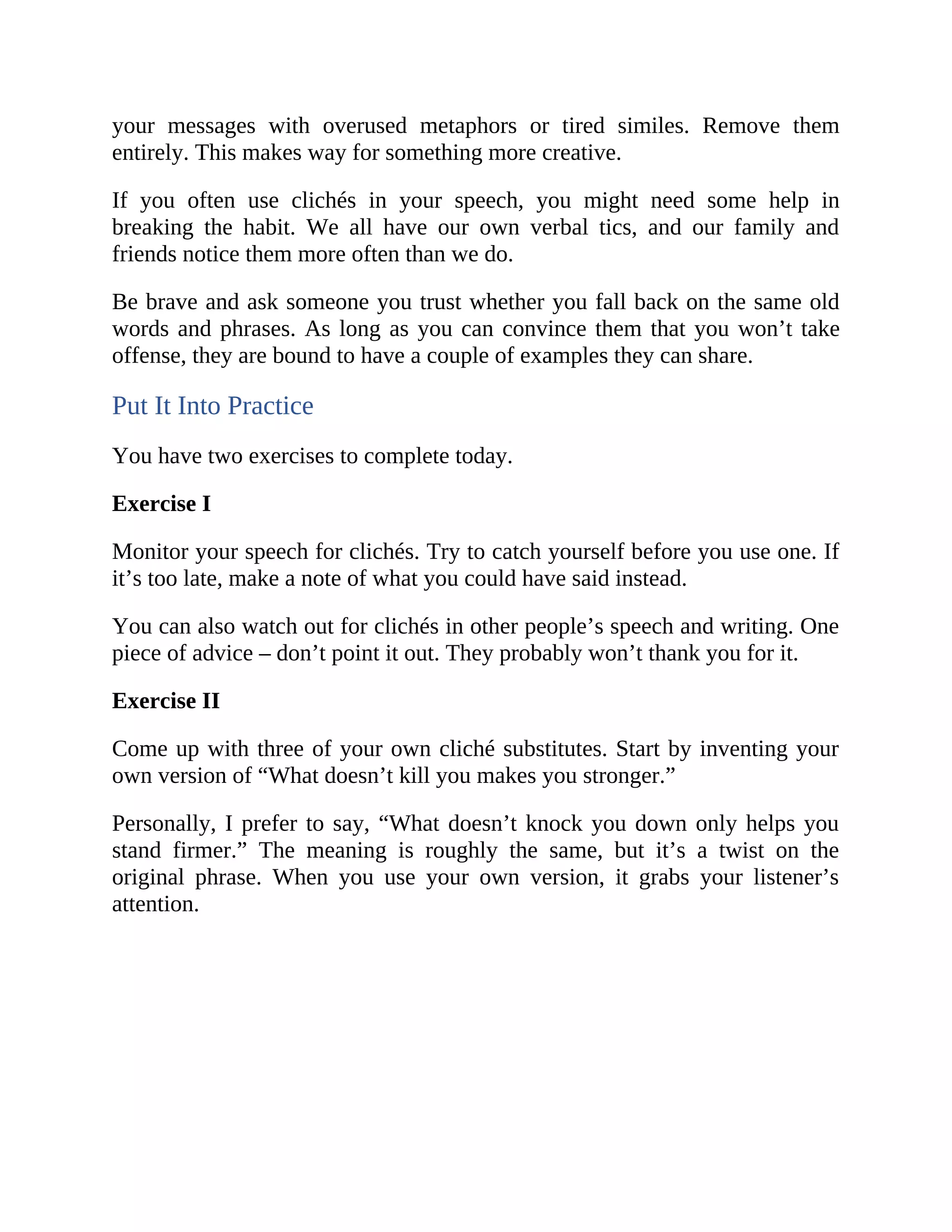
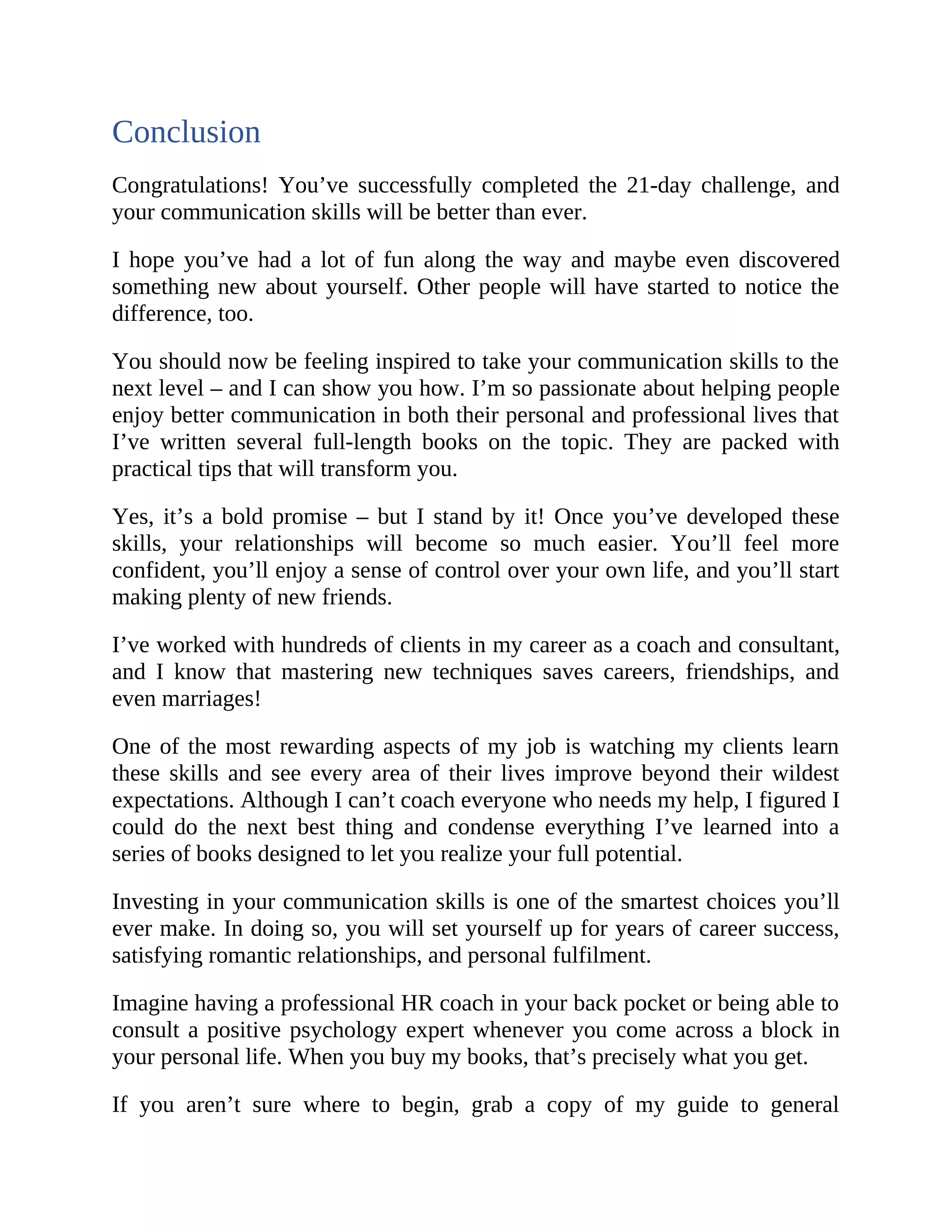
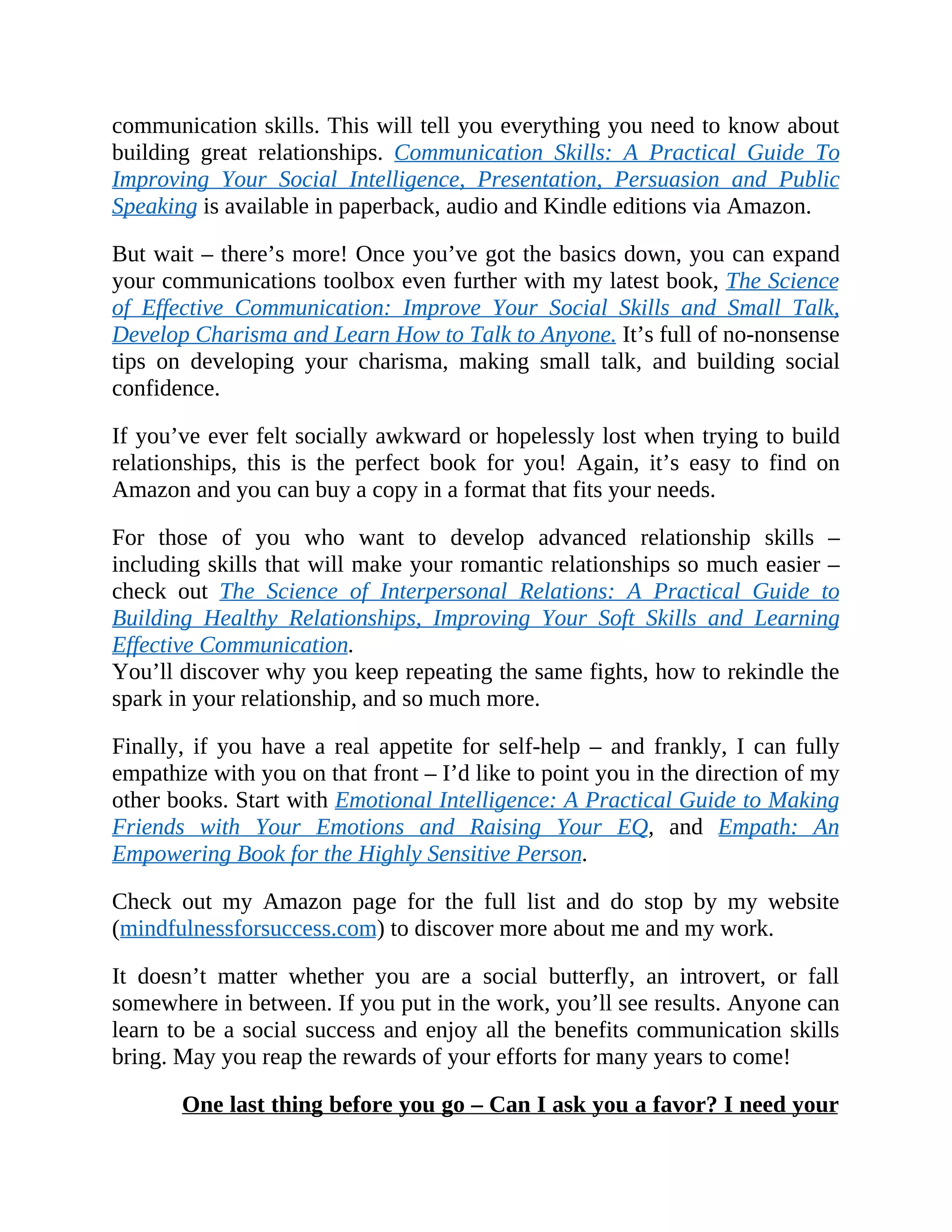

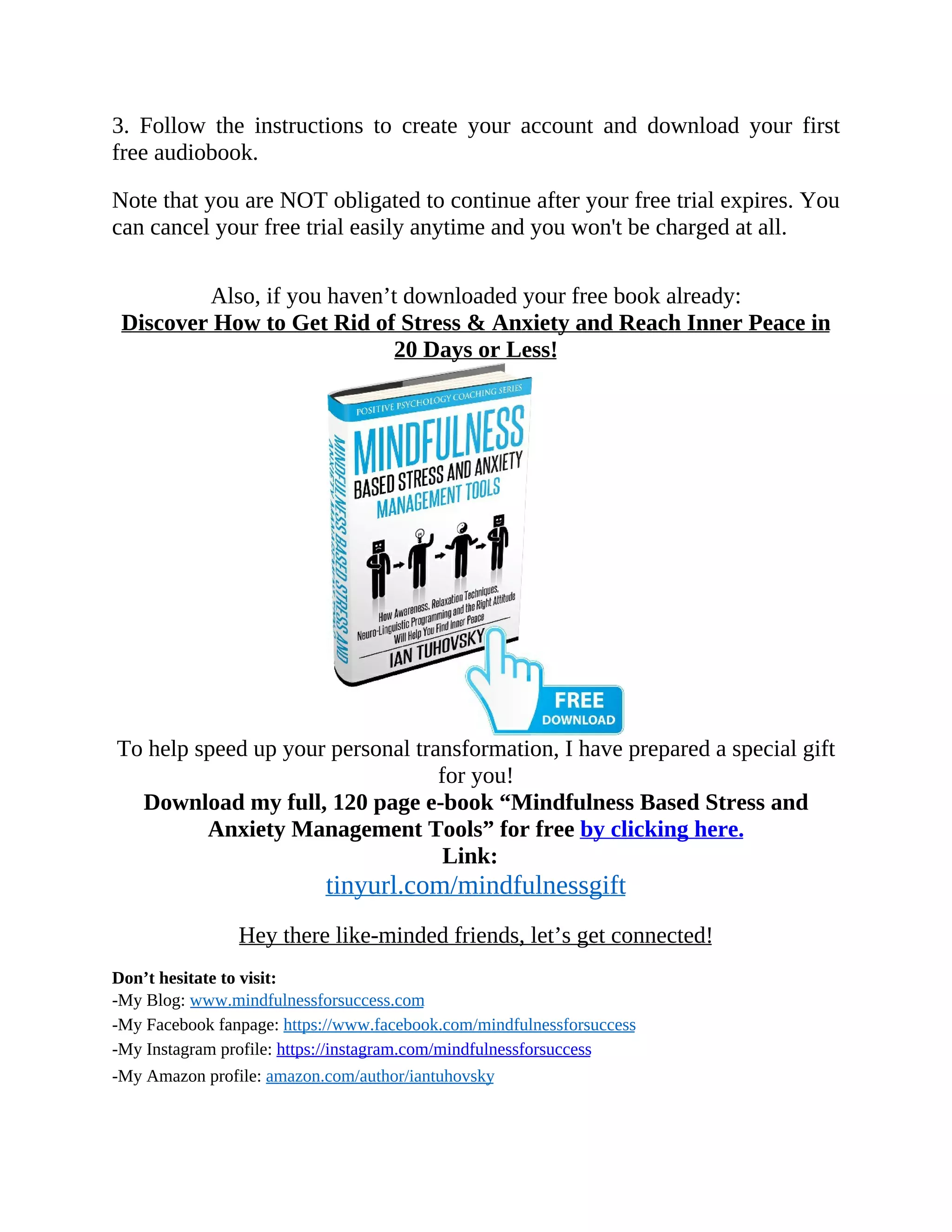
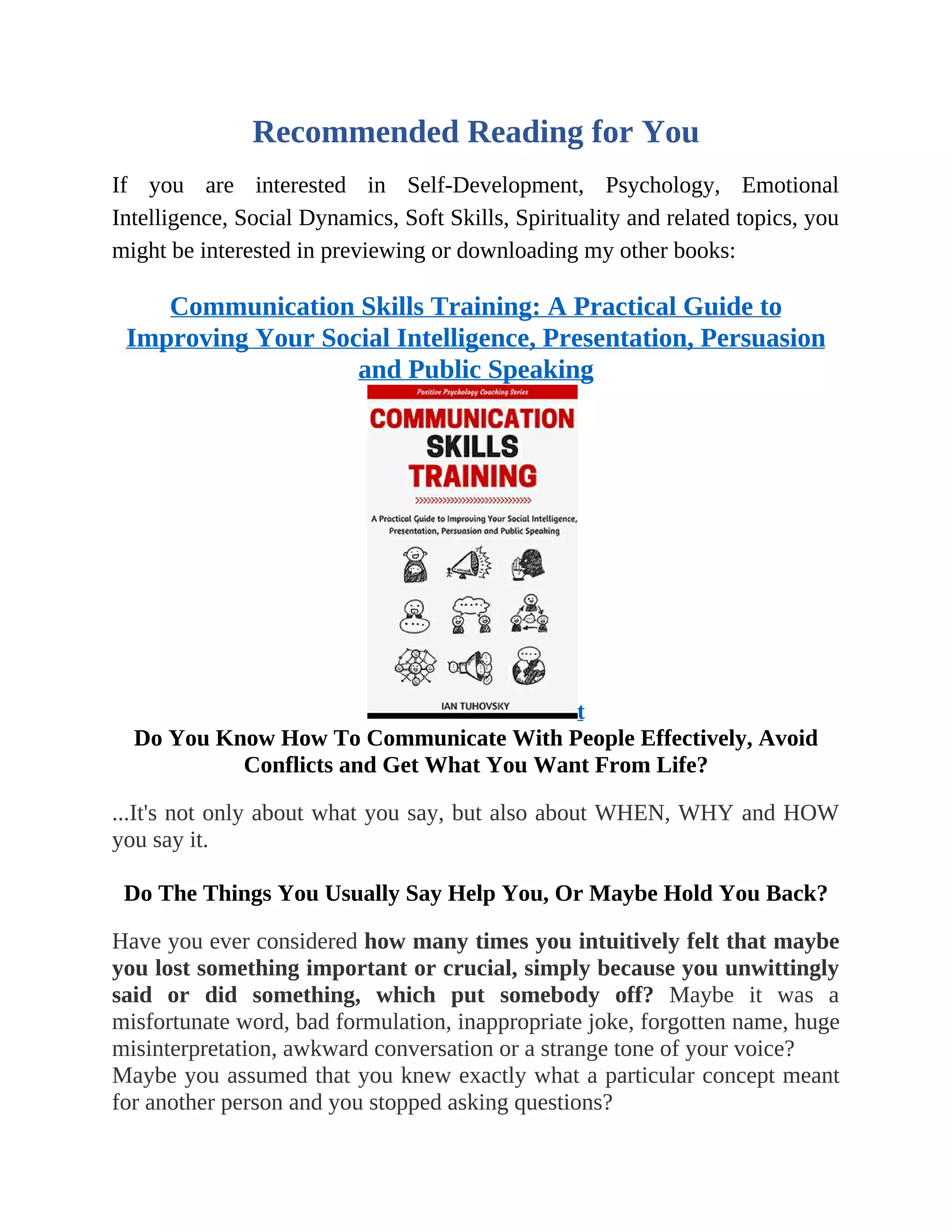
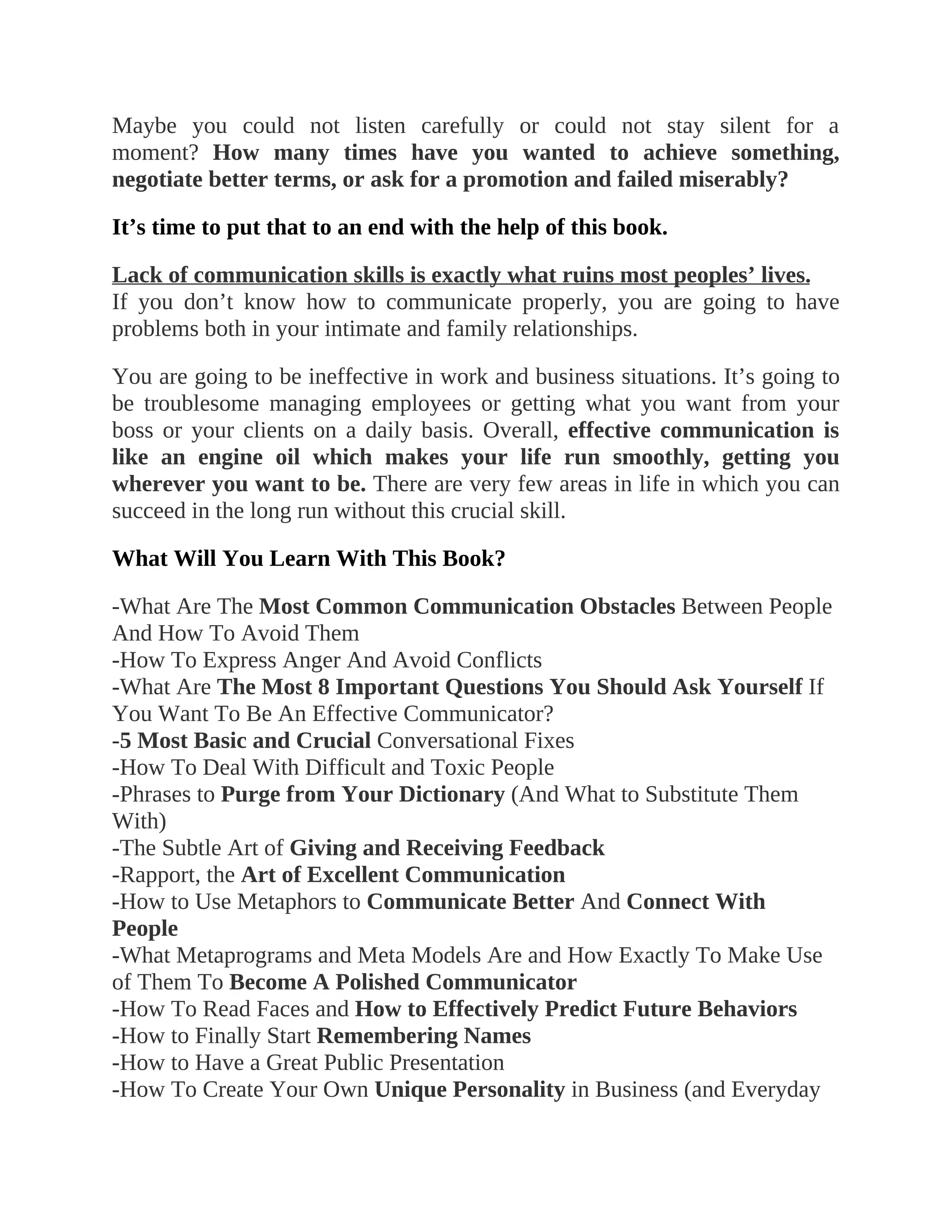
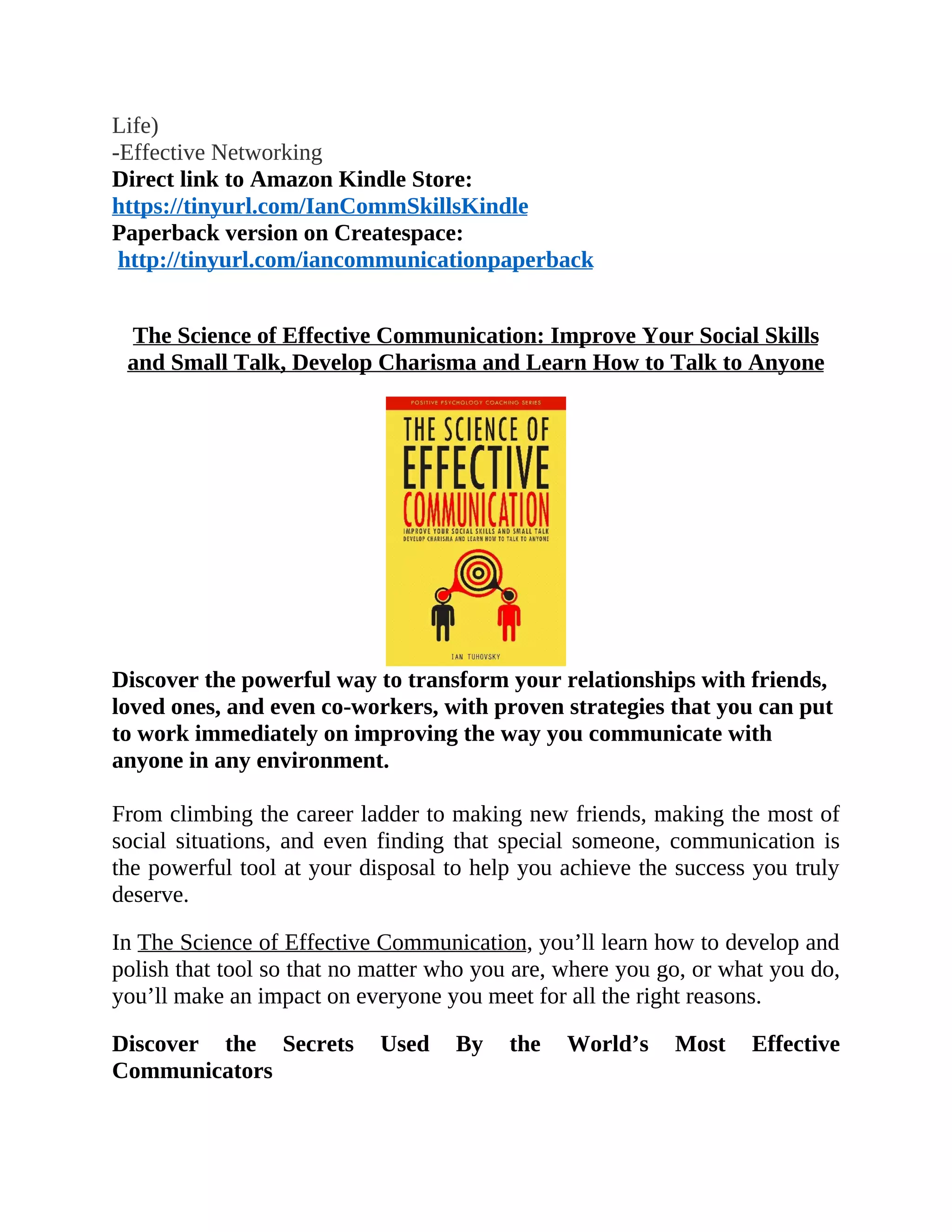
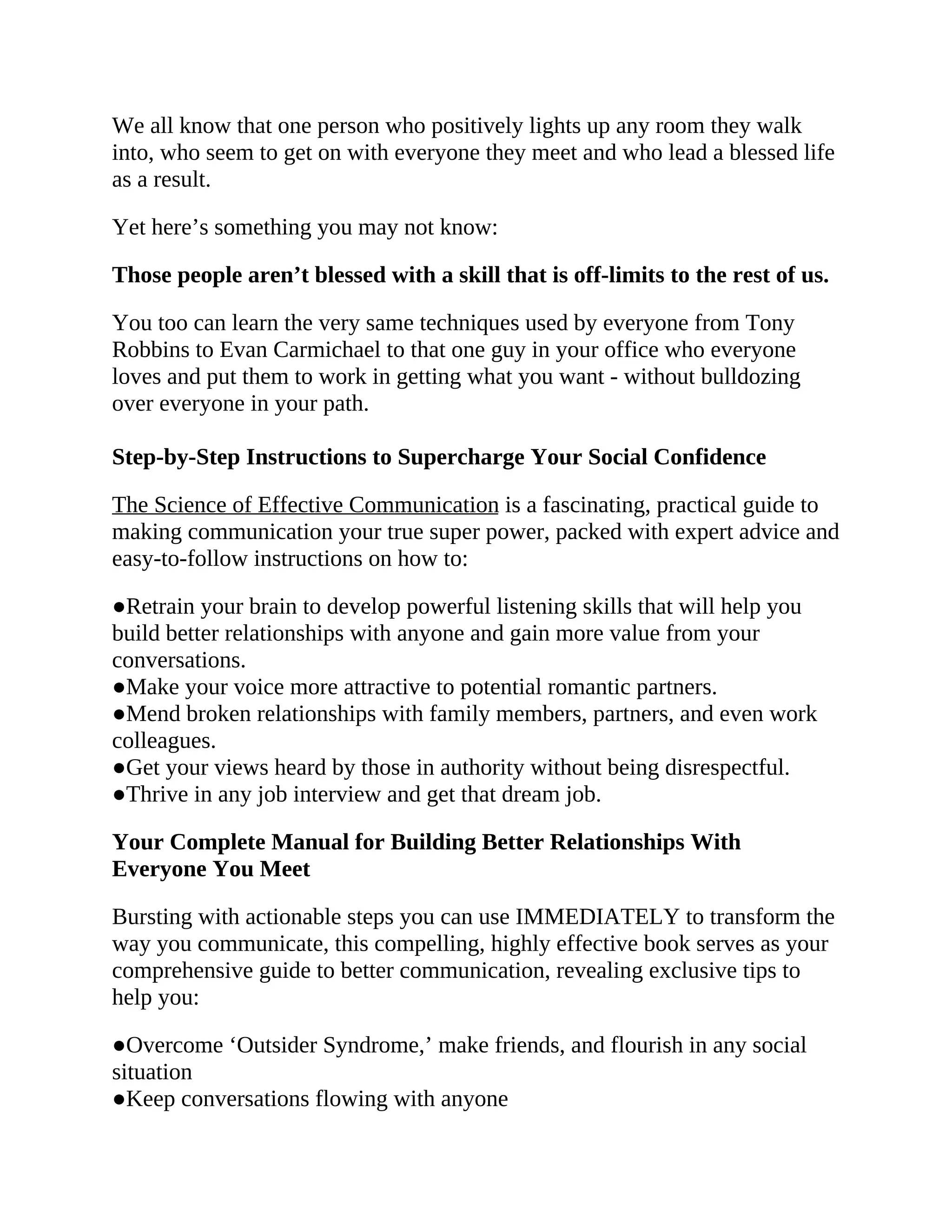
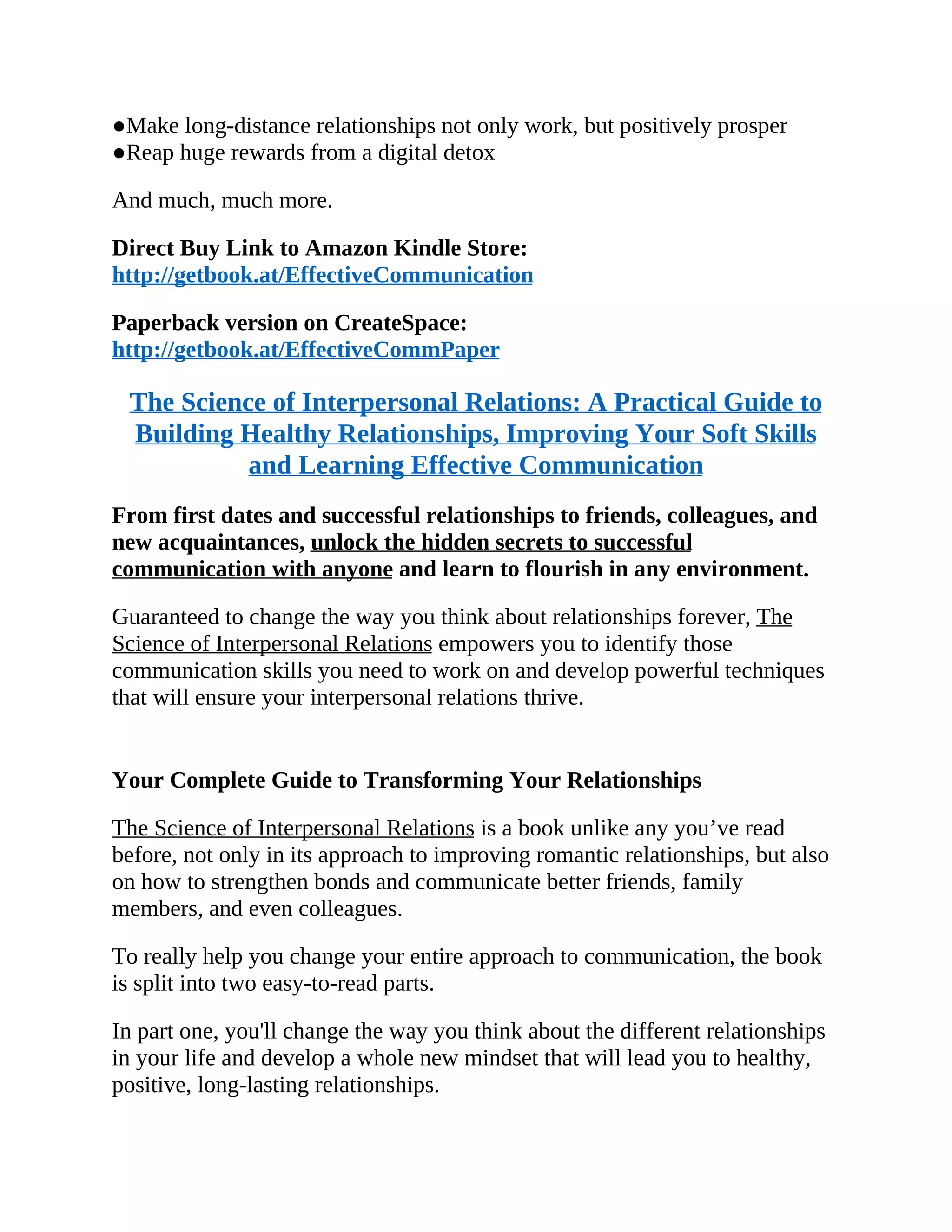
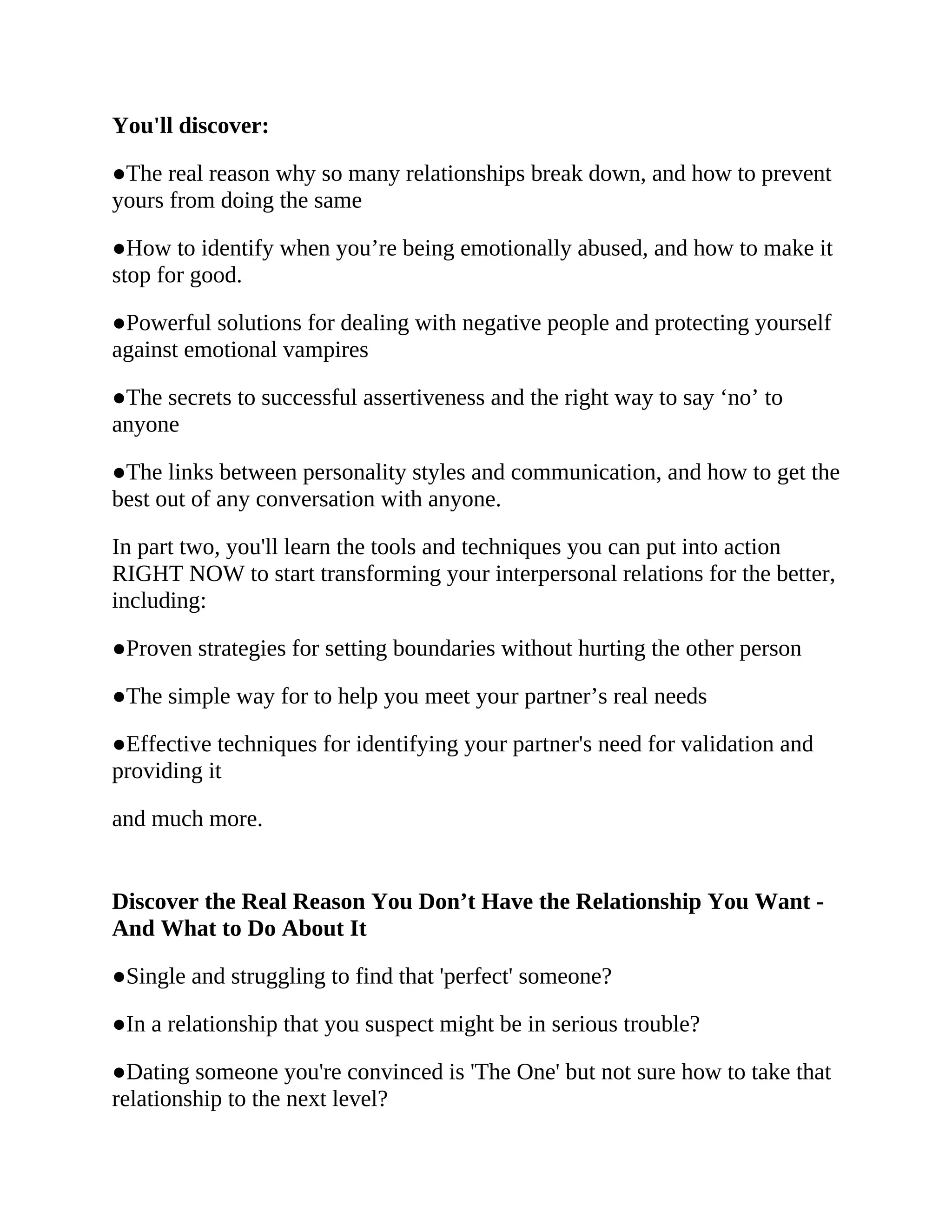
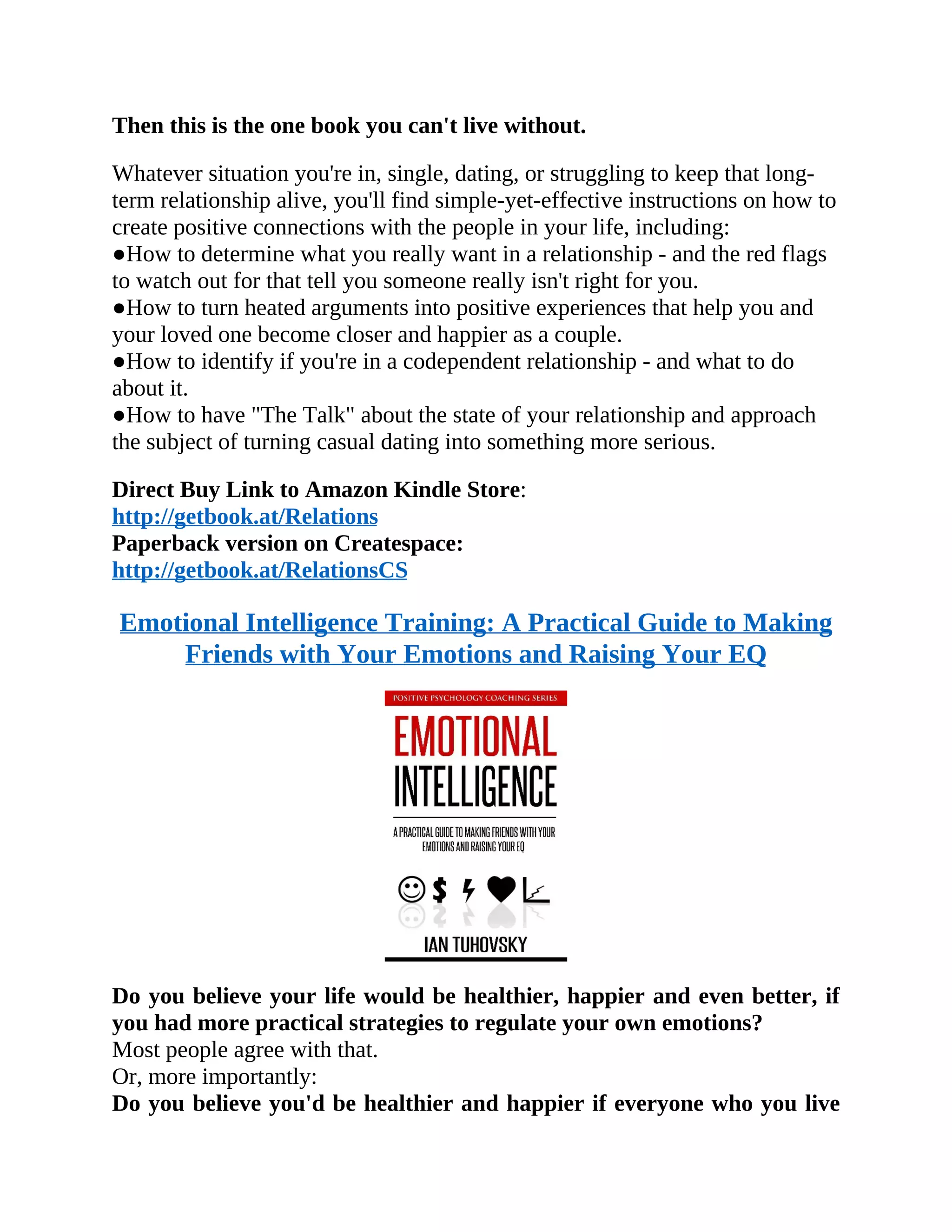

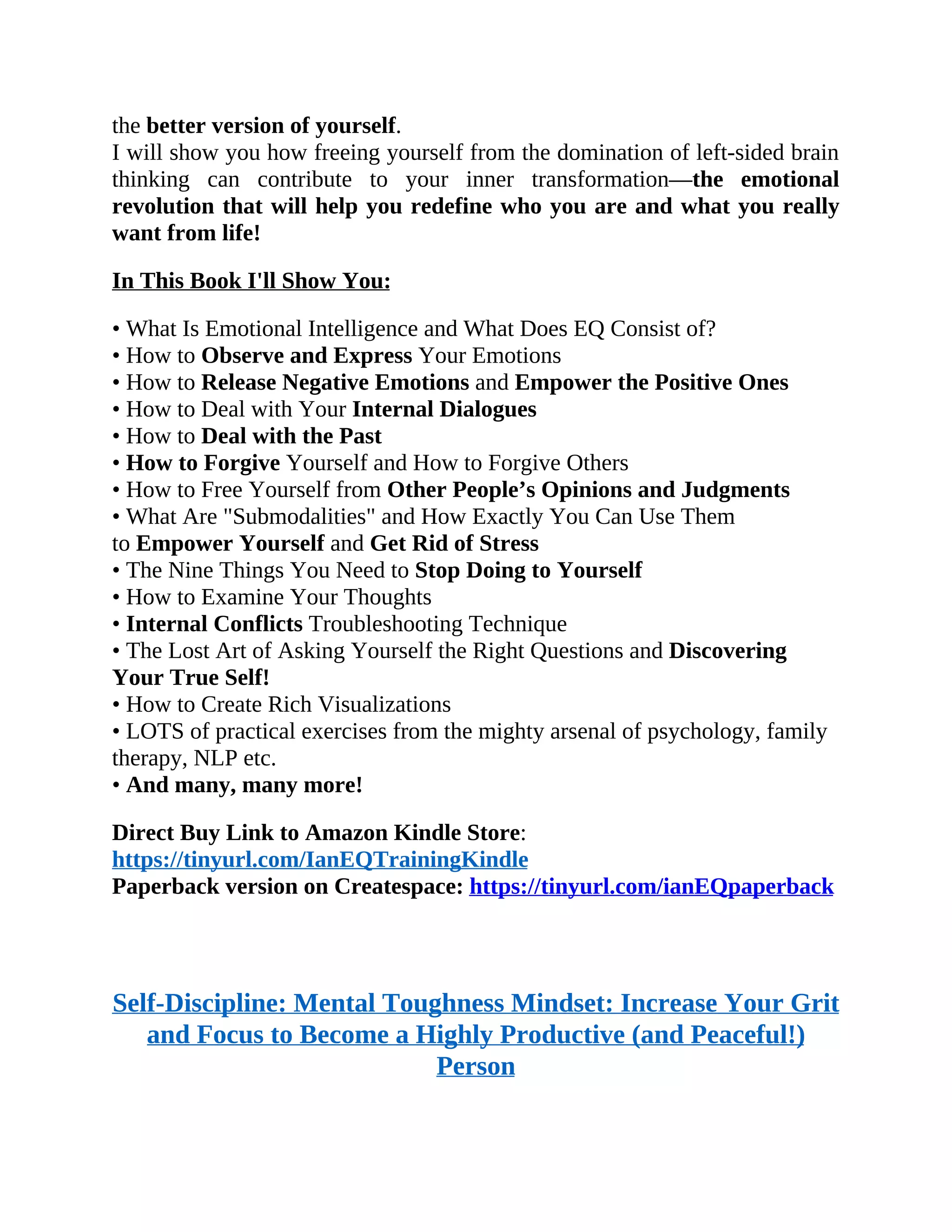
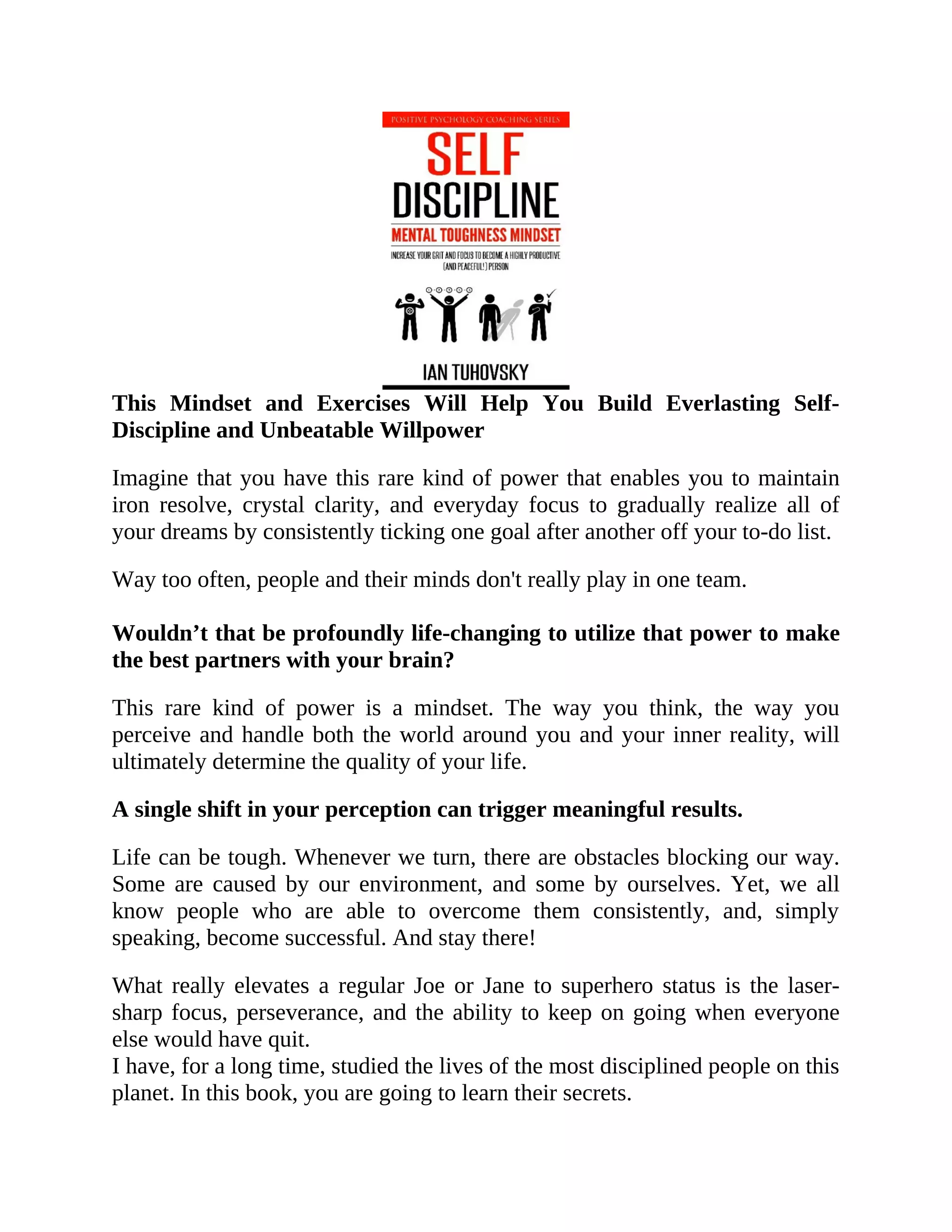
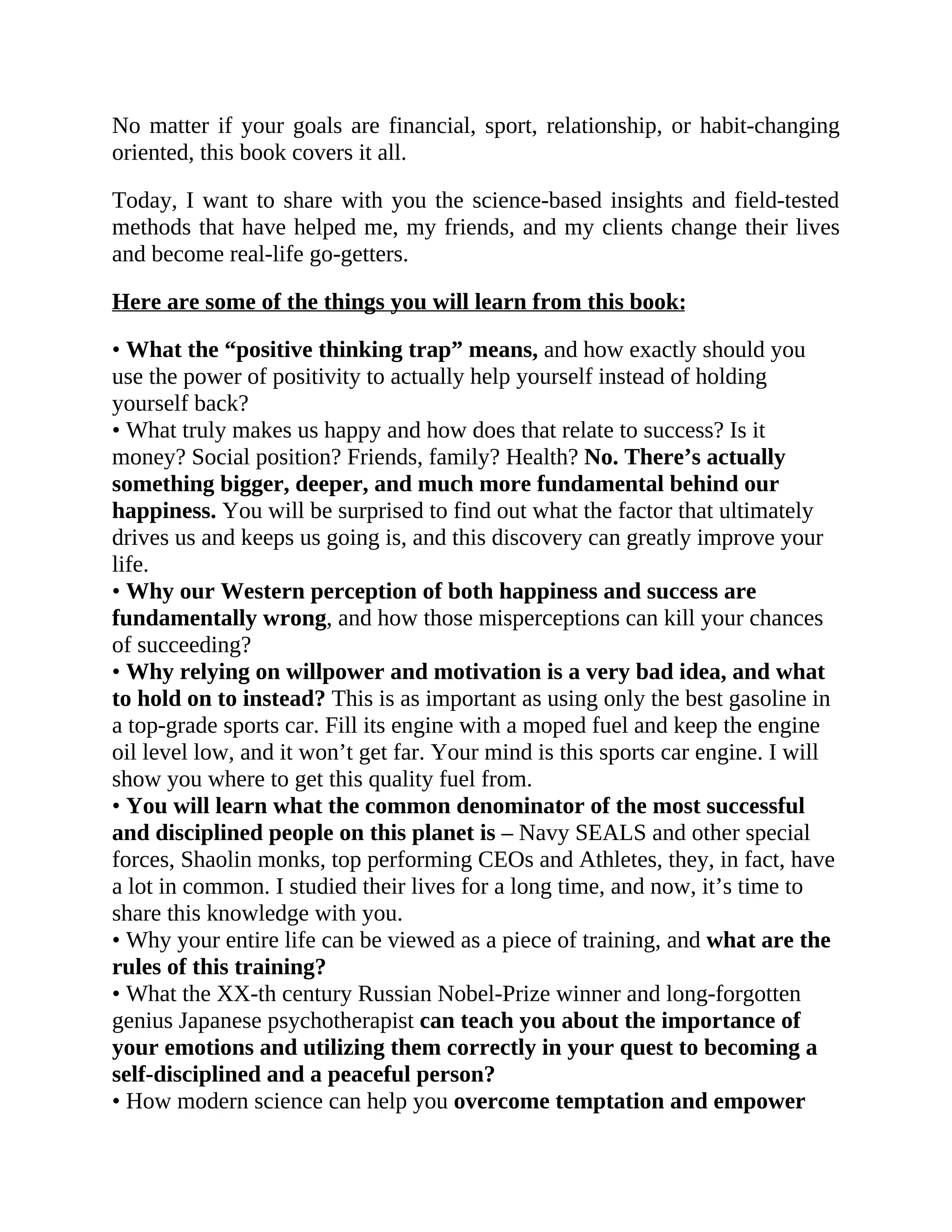

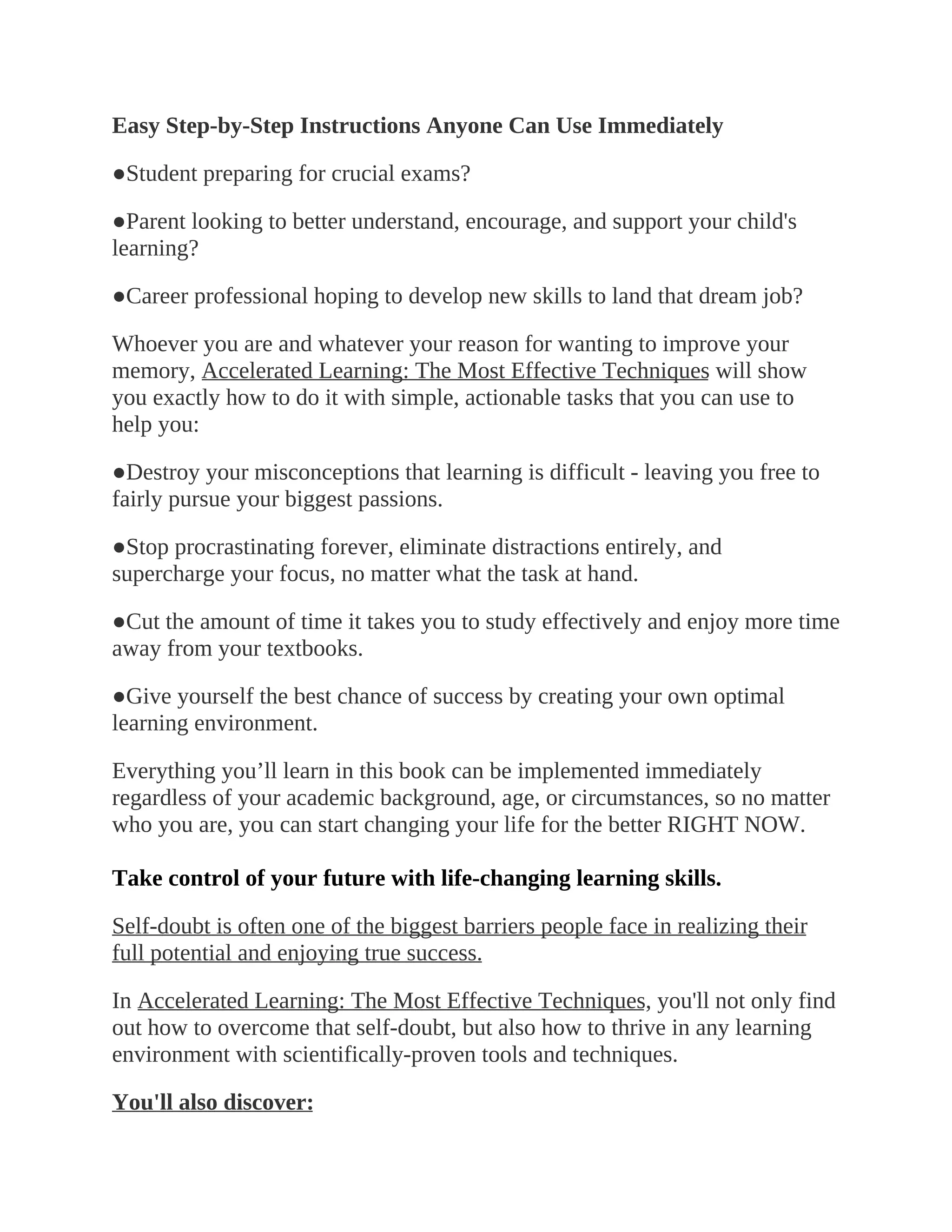
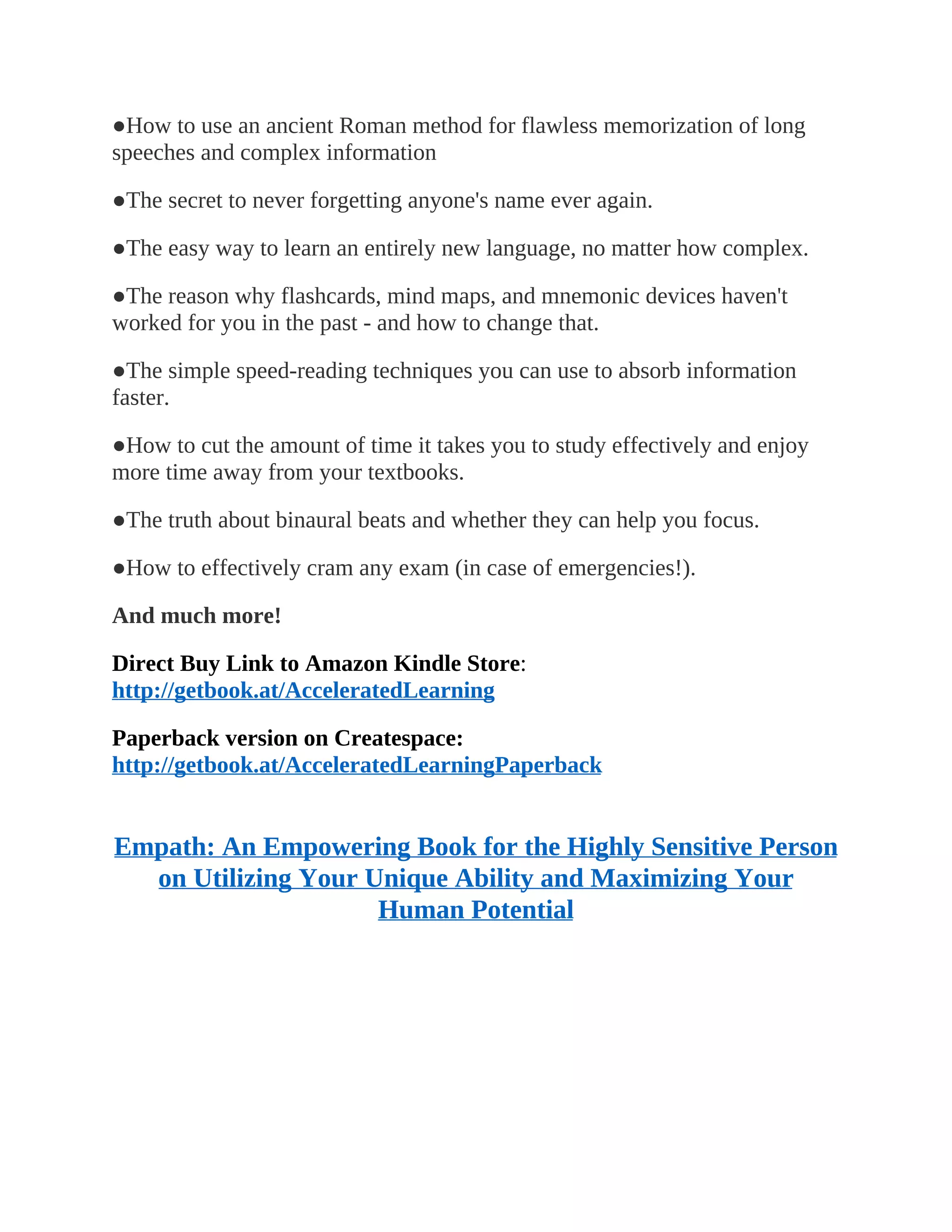
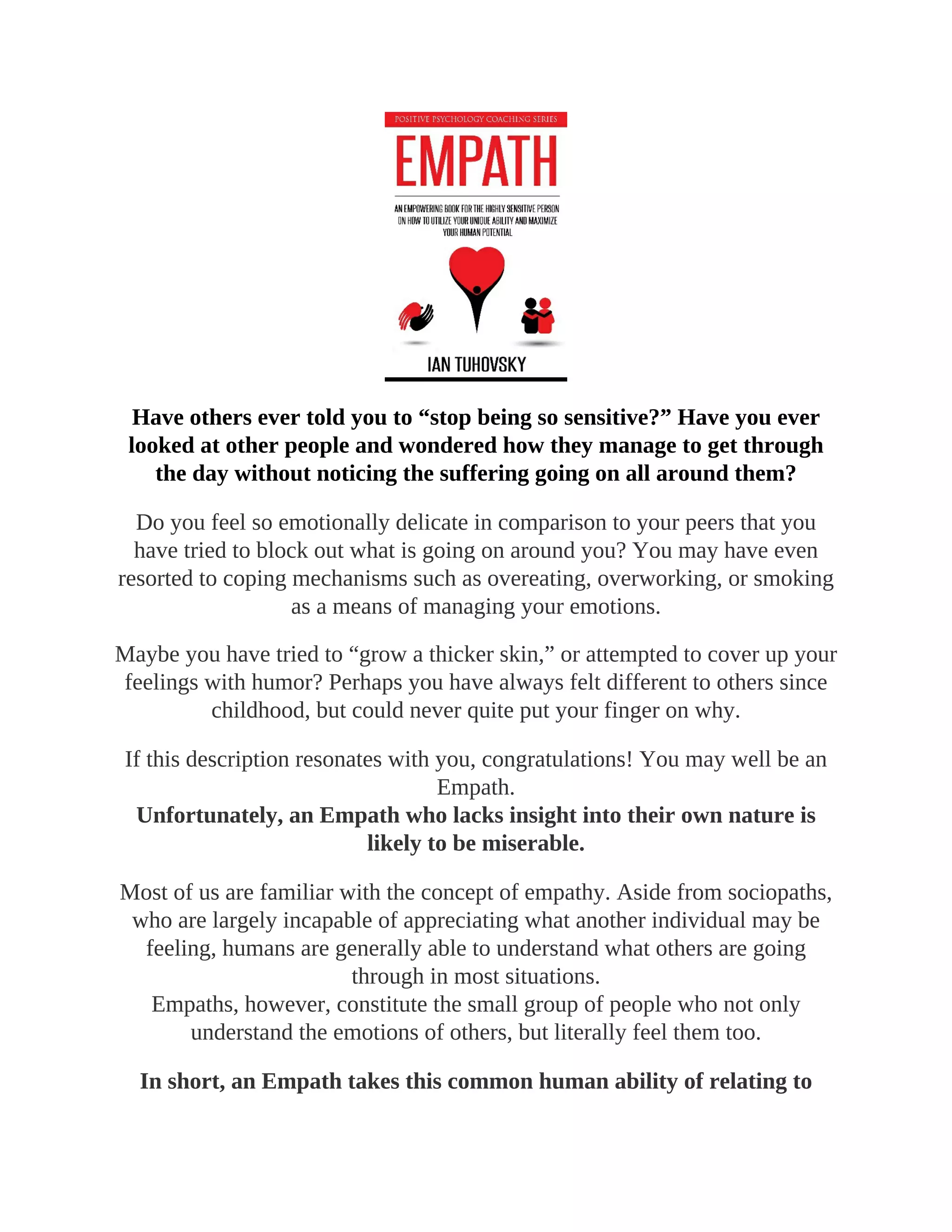
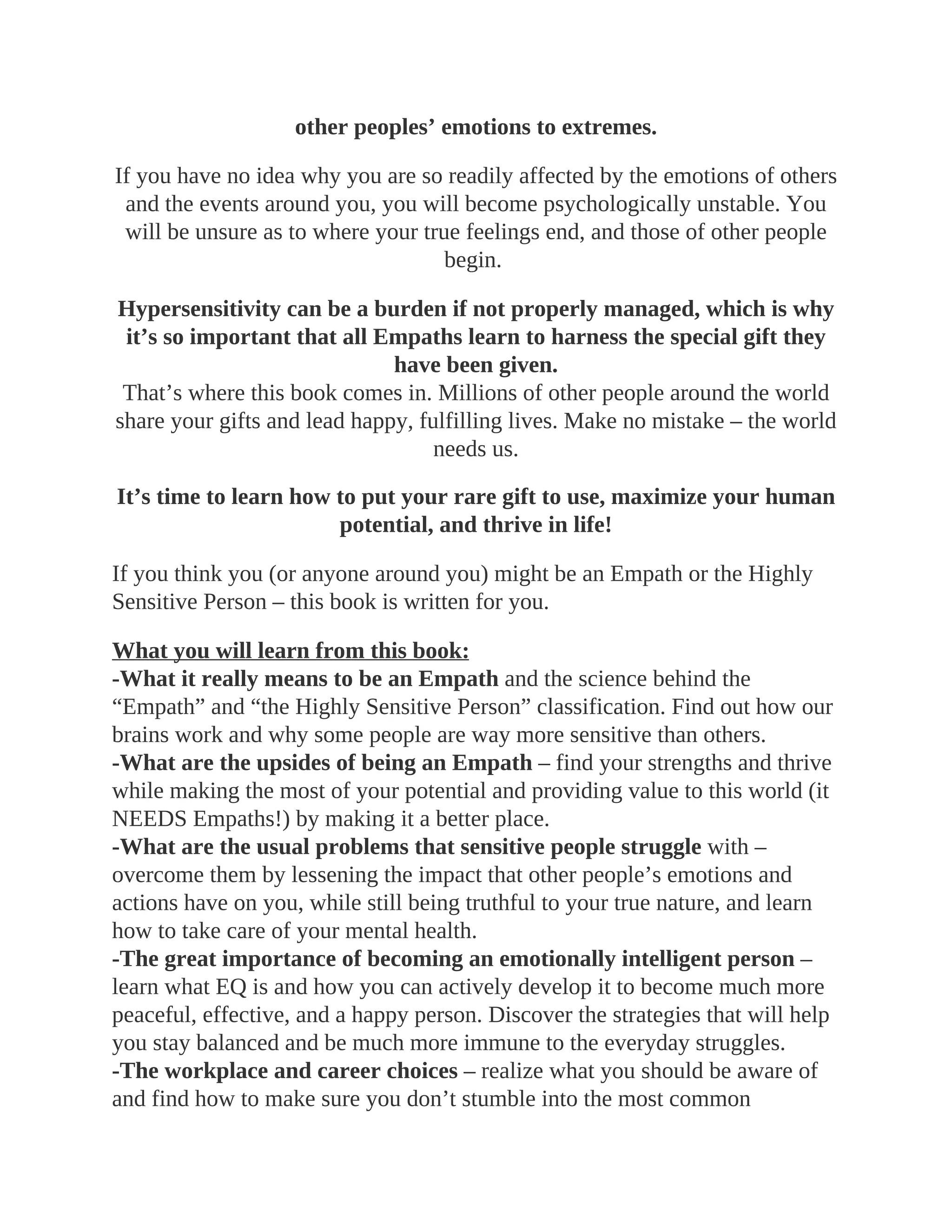
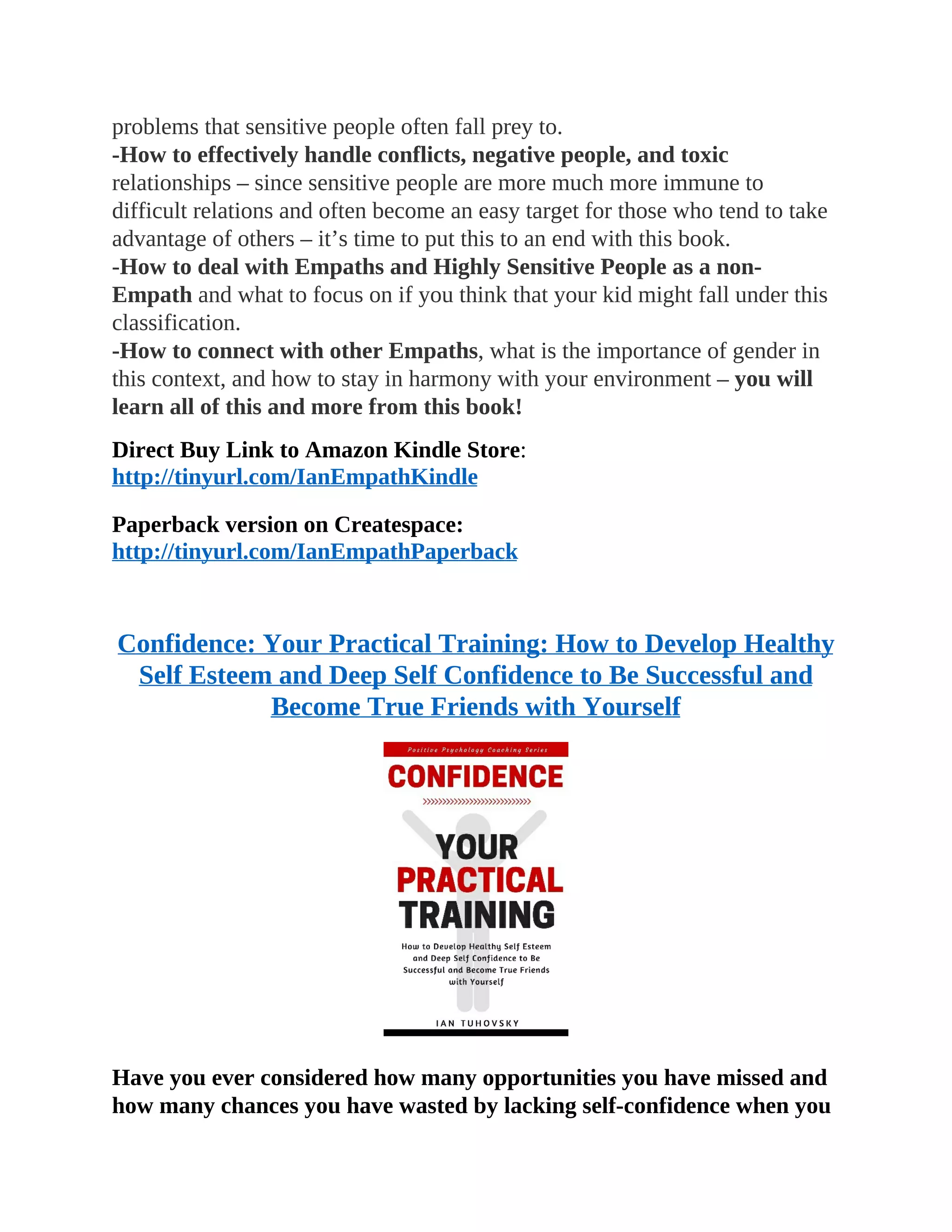
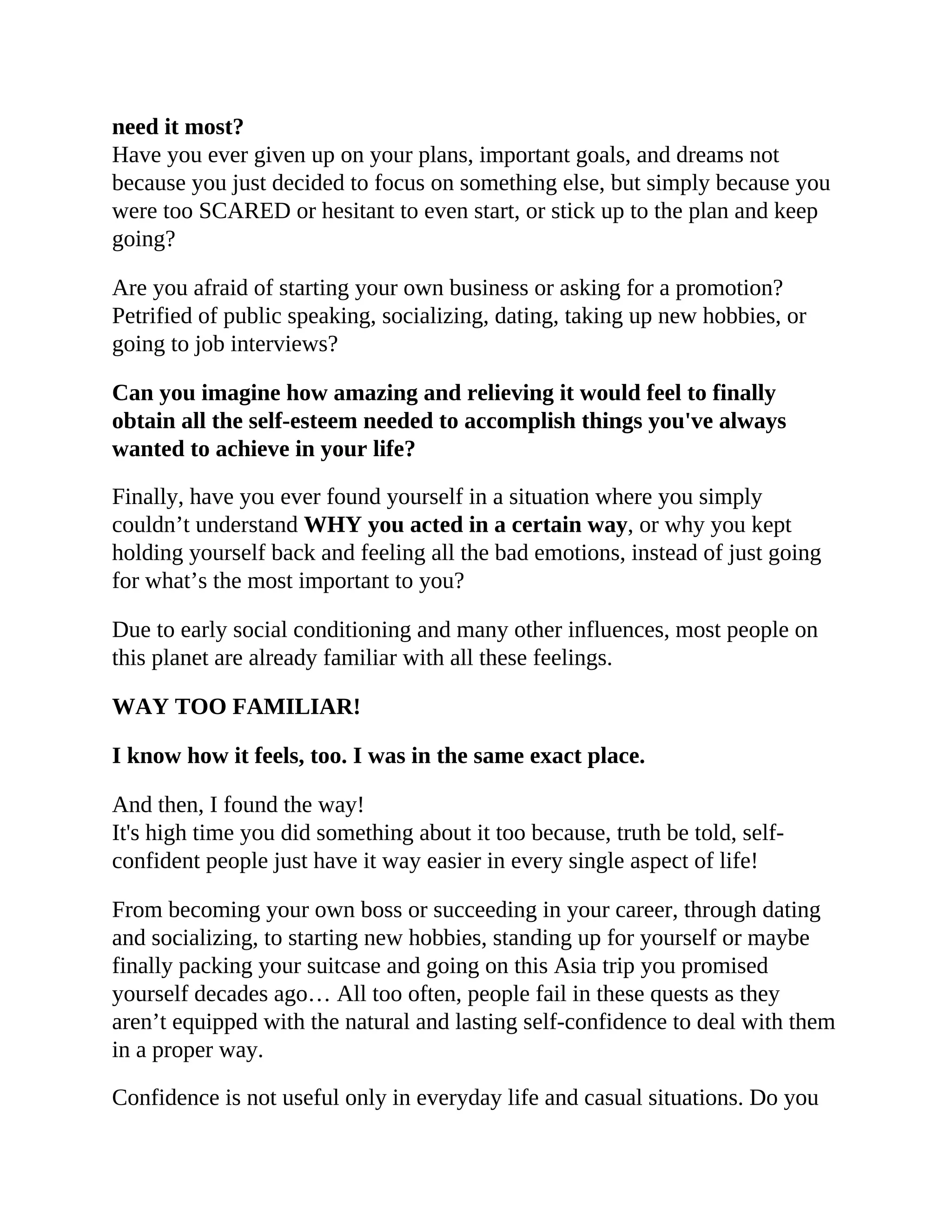
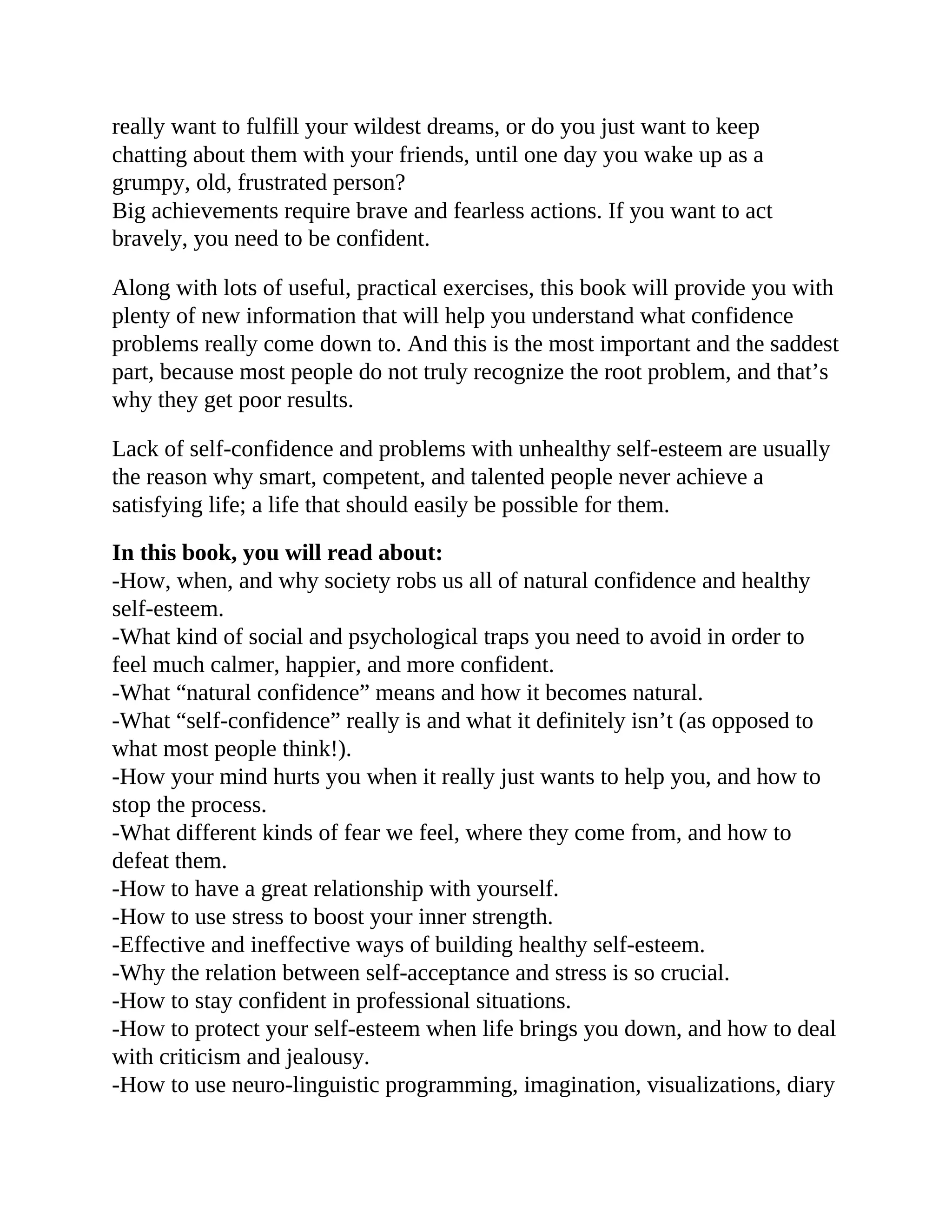
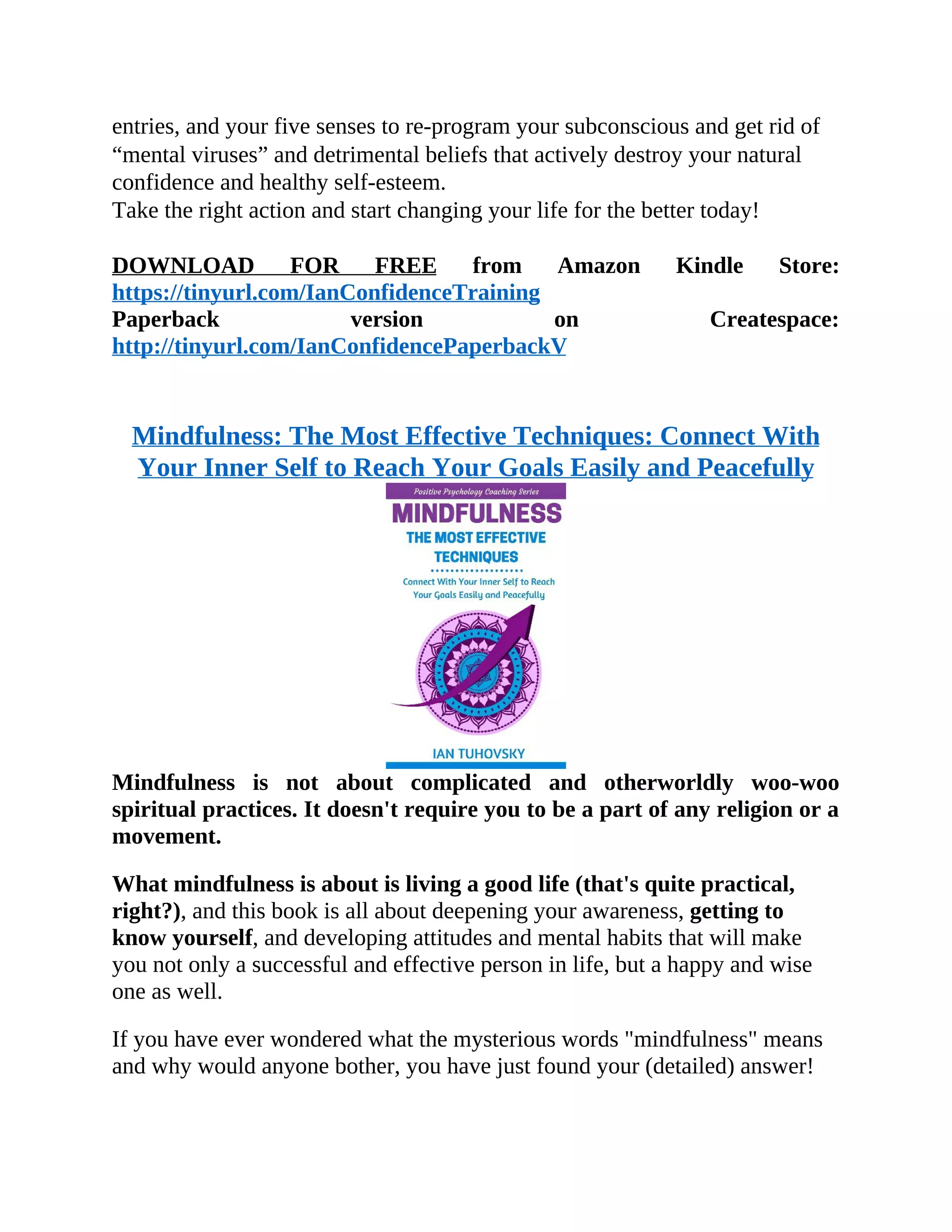

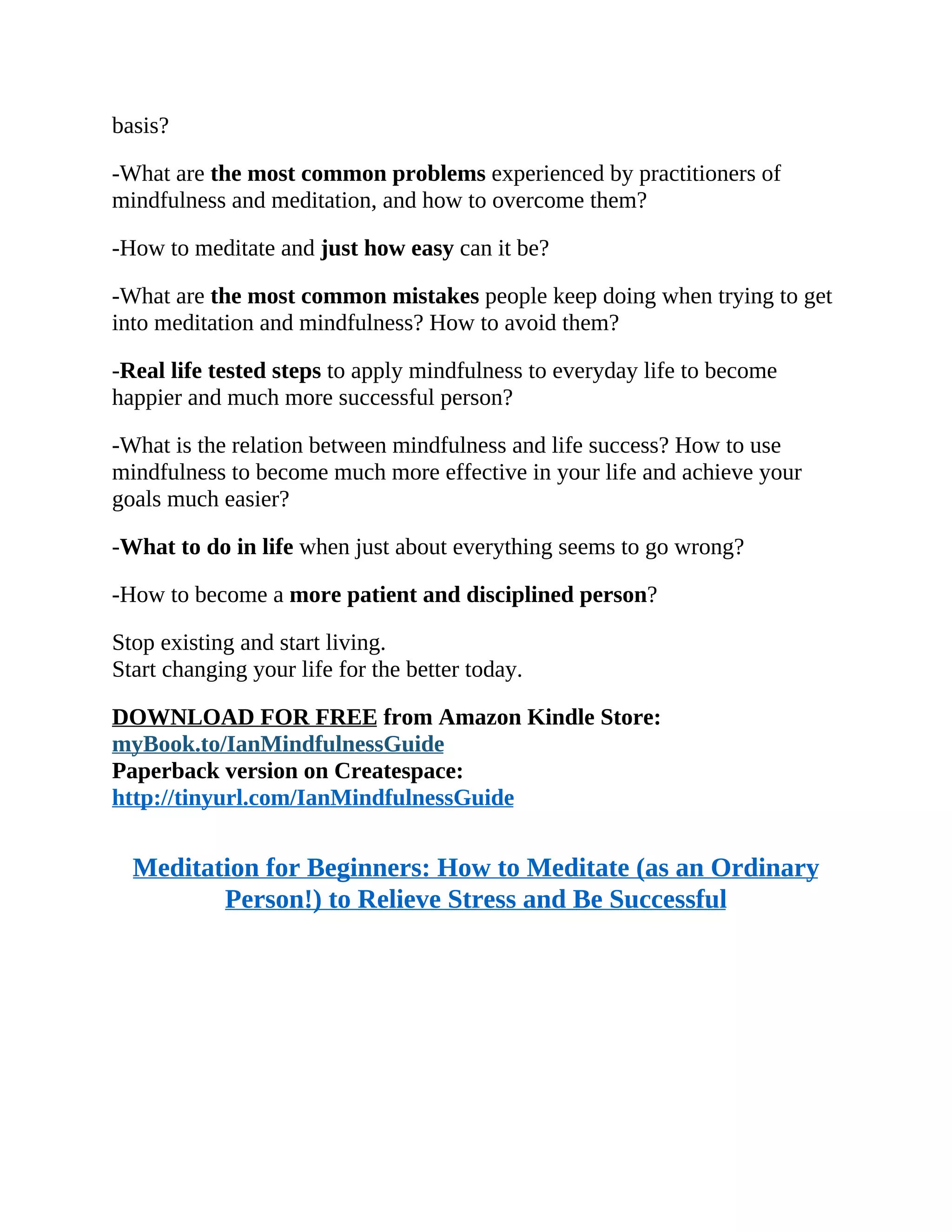
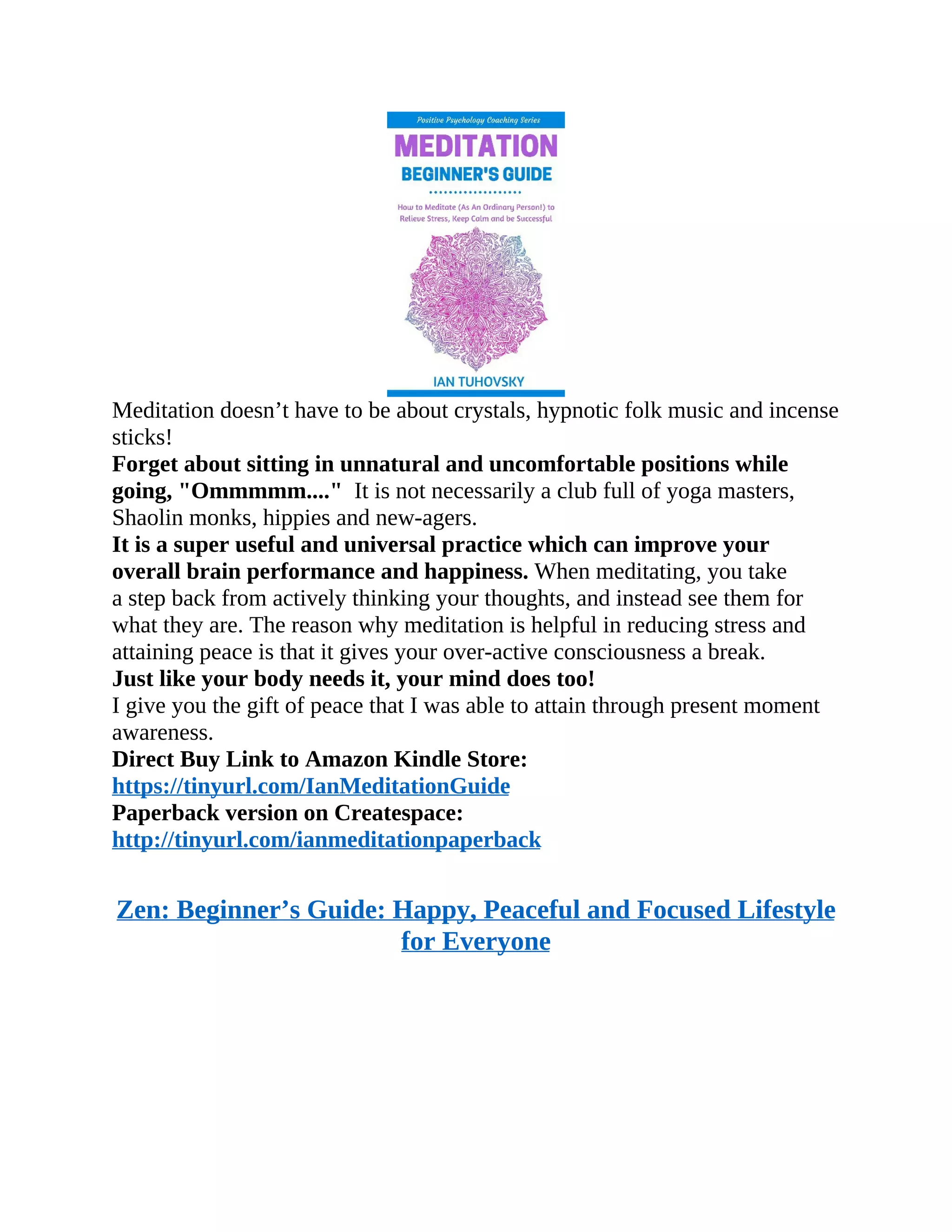
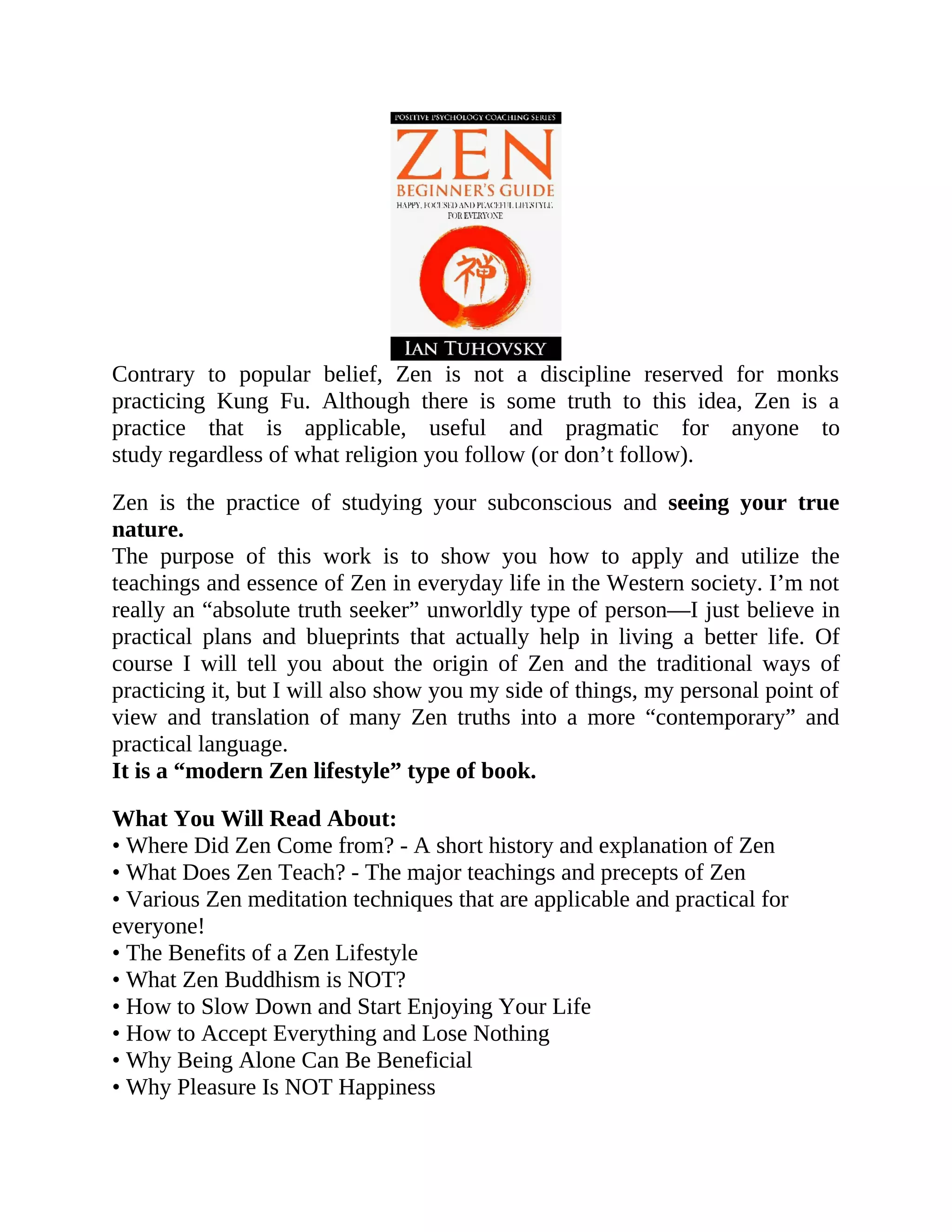


![About The Author
Author’s blog: www.mindfulnessforsuccess.com
Author’s Amazon profile: amazon.com/author/iantuhovsky
Instagram profile: https://instagram.com/mindfulnessforsuccess
Hi! I’m Ian…
. . . and I am interested in life. I am in the study of having an awesome and
passionate life, which I believe is within the reach of practically everyone.
I’m not a mentor or a guru. I’m just a guy who always knew there was more
than we are told. I managed to turn my life around from way below my
expectations to a really satisfying one, and now I want to share this
fascinating journey with you so that you can do it, too.
I was born and raised somewhere in Eastern Europe, where Polar Bears eat
people on the streets, we munch on snow instead of ice cream and there’s
only vodka instead of tap water, but since I make a living out of several
different businesses, I move to a new country every couple of months. I also
work as an HR consultant for various European companies.
I love self-development, traveling, recording music and providing value by
helping others. I passionately read and write about social psychology,
sociology, NLP, meditation, mindfulness, eastern philosophy, emotional
intelligence, time management, communication skills and all of the topics
related to conscious self-development and being the most awesome version
of yourself.
Breathe. Relax. Feel that you’re alive and smile. And never hesitate to
contact me!
[1] Stein, D.J. et al. (2017). The cross-national epidemiology of social anxiety disorder: Data from the
World Mental Health Survey Initiative. BMC Medicine, 15, 143.
[2] Arseneault, L. (2017). The long-term impact of bullying victimization on mental health. World](https://image.slidesharecdn.com/21daysofeffectivecommunicationeverydayexercisestoimproveyourcommunicationskill-211015142455/75/21-days-of-effective-communication-everyday-exercises-to-improve-your-communication-skill-120-2048.jpg)
![Psychiatry, 16, 1, 27-28.
[3] Clear, J. (2017). How Long Does It Actually Take To Form A New Habit? jamesclear.com
[4] Rogers, C., & Farson, R.E. (1957). Active Listening. gordontraining.com
[5]
Allen, J.G. (2010). Why everyone’s an armchair psychologist. saynotostigma.com
[6] Scharf, R. (2015). 5 Ways to Stop Yourself from Interrupting People. huffingtonpost.ca
[7] Ibid.
[8] Gino, F. (2017). How to Handle Interrupting Colleagues. hbr.org
[9] Hunt, V., Layton, D., & Prince, S. (2015). Why diversity matters. mckinsey.com
[10] GLAAD. (2017). GLAAD Media Reference Guide. glaad.org
[11] Ford, T.E. (2016). Racist and sexist jokes aren’t harmless – they can actually perpetuate
discrimination. uk.businessinsider.com
[12]
Litemind. (2017). Top 3 Reasons to Improve Your Vocabulary. litemind.com
[13] Ibid.
[14] Balint, J. (2014). Use “And” instead of “But.” linkedin.com
[15] Raskin, R., & Shaw, R. (1988). Narcissism and the Use of Personal Pronouns. Personality, 56, 2,
393-404.
[16] Carey, A.L., et al. (2015). Narcissism and the Use of Personal Pronouns Revisited. Journal of
Personality and Social Psychology, 109, 3, 1-15.
[17] Ibid.
[18] Wilde, A. (2017). Etiquette for the Best Way to Offer Money Without Offending. pocketsense.com
[19] Emmons, R.A., & McCullough, M.E. (2003). Counting Blessings Versus Burdens: An
Experimental Investigation of Gratitude and Subjective Well-Being in Daily Life. Journal of
Personality and Social Psychology, 84, 2, 377-389.
[20] Lanham, M.E., Rye, M.S., Weill, L.S., & Rimsky, S.R. (2012). How gratitude relates to burnout
and job satisfaction in mental health professionals. Journal of Mental Health Counseling, 34, 4.
[21] Leonard, I. (n.d.). The Art of Effective Questioning: Asking the right question for the desired result.
coachingforchange.com
[22] Haden, J. (2014). 5 Ways to Ask the Perfect Question. inc.com
[23] Garber, M. (2012). Why We Prefer Masculine Voices (Even in Women). theatlantic.com
[24] Ni, P. (2014). How to Strengthen & Improve the Sound of Your Speaking Voice.
psychologytoday.com
[25] Peters, K. (2010). Pump Up Your Speaking Voice with a Strength Training Workout.
sixminutes.dlugan.com
[26] Ibid.
[27] Vanderkam, L. (2016). How To Make Your Voice Sound Better So People Will Actually Listen To
You. fastcompany.com
[28] Henshaw, J. (2010). The Secret to Giving Constructive Criticism – The Focus on Behaviors.
managing-employee-performance.com
[29] Ibid.
[30] Journal Psyche. (n.d.) The Freudian Theory of Personality. journalpsyche.org
[31] McLeod, S. (2016). Bandura – Social Learning Theory. simplypsychology.org
[32] Kane, S. (2017). Baby Boomers In The Workplace. thebalance.com](https://image.slidesharecdn.com/21daysofeffectivecommunicationeverydayexercisestoimproveyourcommunicationskill-211015142455/75/21-days-of-effective-communication-everyday-exercises-to-improve-your-communication-skill-121-2048.jpg)
![[33] Hammill, G. (2005). Mixing and Managing Four Generations of Employees. fdu.edu
[34] Kane, S. (2017). The Common Characteristics Of Generation X Professionals. thebalance.com
[35] White, G.B. (2015). Millennials In Search Of A Different Kind Of Career. theatlantic.com
[36] Clark, J. (2017). Generation Z: Are We Ready For The New Workforce? entrepreneur.com
[37] Fast Company. (2017). If You Want To Know What Matters To Gen Z, Just Ask Them.
fastcompany.com
[38] Winerman, L. (2006). E-mails and egos. apa.org
[39] Chartrand, J. (2011). How To Avoid Harsh-Sounding Emails. menwithpens.ca
[40] Held, M. (2014). Five Ways To Keep Your Tone In Check When Writing Business Emails.
huffingtonpost.ca
[41] ThriveHive. (2016). 13 Small Business E-mail Examples and Templates. thrivehive.com
[42]
The Muse. (n.d.) 27 Pre-Written Templates For Your Toughest Work E-mails. themuse.com
[43] Ibid.
[44]
Dizik, A. (2017). How to avoid writing irritating emails. bbc.com
[45] O’Banion, A. (2018). Self-Fulfilling Prophecy – Breaking The Cycle. Socialanxietyinstitute.org
[46] White, M.D. (2016). Why You Might Want To Reconsider Putting Yourself Down.
psychologytoday.com
[47] Reese, N. (n.d.) The Secret Art Of Asking For Advice (& Mentorship). nicholasreese.com
[48] Gervais, B. (n.d.) 7 Deadly Sins Millennials Make When Approaching Mentors.
americanexpress.com
[49] Green, A. (2014). How to fend off nosy co-workers. askamanager.org
[50] MindTools. (n.d.) Monroe’s Motivated Sequence. mindtools.com
[51] Skills You Need. (n.d.) Mediation Skills. skillsyouneed.com](https://image.slidesharecdn.com/21daysofeffectivecommunicationeverydayexercisestoimproveyourcommunicationskill-211015142455/75/21-days-of-effective-communication-everyday-exercises-to-improve-your-communication-skill-122-2048.jpg)